Join my monthly email! Sign up


Camping Quiz – 50 Questions & Answers
Welcome to my ultimate Camping Quiz Questions!
If you’re looking for some camping quiz questions and answers to keep you busy this Christmas, then, here you go.
I’ve written this camping quiz to test your knowledge of one of my favourite ways to travel. From camping in Devon as a child, taking my tent to festivals through my teens and twenties, and then camping in various coastal spots around England this year – I love camping!

Here are 50 fun camping questions for you and your family / friends / self to see how well you know your camping trivia.
Great if you’re looking for unusual camping quiz questions!
There are five rounds to this camping quiz, with a bonus one at the end.
So, let’s crack on with the camping trivia shall we?
Camping Quiz Questions
This camping quiz has four rounds of food and drink questions, a picture round, and a points stealer questions at the end.

Camping Quiz Round 1: General Camping Trivia
See how well you can do on these camping trivia questions to warm you up…
1. When wild camping and looking for a spot, what 3 things should you look out for?
2. In camping, what is a fly?
3. When you’re picking wood for firewood, where should you get it from?
4. When buying a tent what does HH stand for?
5. When buying a sleeping bag what does the TOG rating mean?
6. What should you do if you need a poo in the wilderness?
7. Which type of tree bark is best for lighting a campfire?
8. Guide rope or guy rope?
9. What is cowboy camping?
10. Where is the most expensive campground in the world?
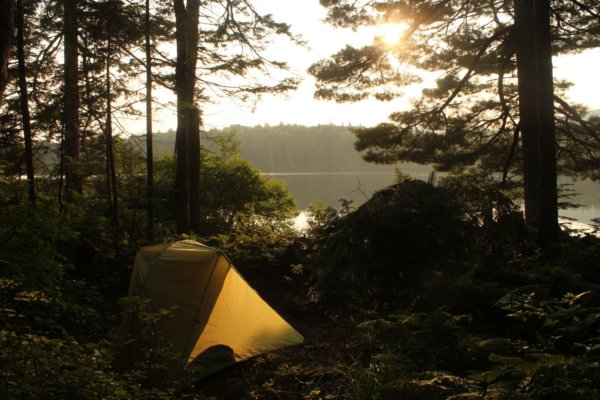
Camping Quiz Round 2: Books & Films
These camping quiz questions and answers are all about camping in the media…
11. Which film featured friends camping in the woods, with a video camera following them?
12. In which film / book is the female protagonist hiking the PCT (Pacific Crest Trail)?
13. And do you know the name of Bill Bryson’s book walking the same trail?
14. Which camping film concludes with the message ‘Happiness is Only Real When Shared?’
15. If I say Barbara Windsor and camping in the same sentence, you say:
16. Which camping film featured 4 12-year old boys on a coming of age story in Oregon?
17. Who famously said, “Light a campfire and everyone’s a storyteller”?
- Henry David Thoreau
- Sylvia Plath
John Geddes
18. Which nationality popularised camping as we know it in the 1800s?
19. In the US, camping is traced to William Henry Harrison Murray ‘s 1869 publication of Camp-Life in the _____________ .
20. True or fales: In the UK we have an entire magazine dedicated to Camping called, ‘Camping’?

Fancy another quiz?
How about this airport quiz ? See how many funny airport codes you can name, and do you know the busiest airport in the world? Test your airport knowledge here!
Camping Quiz Round 3: Name that tent…
How well do you know your types of tent?
21. What are the tents that hang on a mountain called?
22. What are the usually white tents often used for glamping at festivals called?
23. What’s the name of the tents that go up in a few seconds, cheap and popular at festivals?
24. A tent that’s low to the ground, barely there, and just for one person?
25. A tent where the poles criss cross and intersect to form triangles?
26. A tent where there’s a larger, higher space in the middle section, and then two sleeping compartments to each side?
27. A tent that’s popular with families, and is long, and generally the same shape?
28. This tent does for spring, summer, autumn AND winter?
29. These tents are popular in deserts, especially Wadi Rum in Jordan for example?
30. This tent is traditionally used by Indigenous people all over the world?
Camping quiz round 4: picture round camping essentials
Picture round for the camping lovers out there!
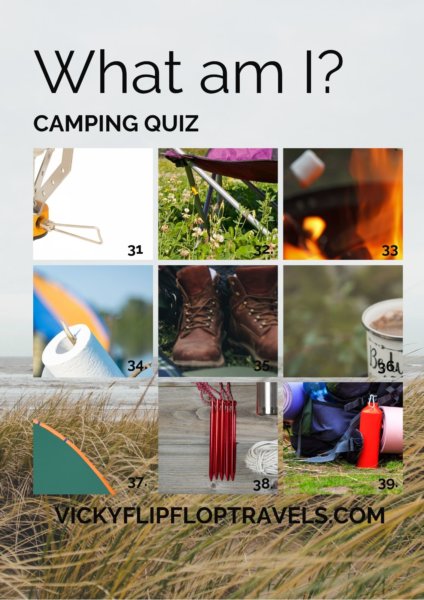
Camping quiz round 5: camping food
Let’s test your culinary skills in this quiz on camping…
40. Name everything you’d need to bring if you wanted to cook beans on toast?
41. How do you put out a campfire properly?
42. How long do you need to boil water to kill any parasites in it?
43. What are S’mores?
44. What’s the best thing to do with not used boiled water, so as not to waste the energy of heating it?
45. What should you look for in a can / tin when shopping?
46. When it comes to camping food – what are tic tac boxes good for?
47. Is there anything more useful than tin foil when it comes to cooking for camping?
48. How can you make the ice in the cool box last as long as possible?
49. If you’re camping in bear country, name three things you can do to be bear aware…
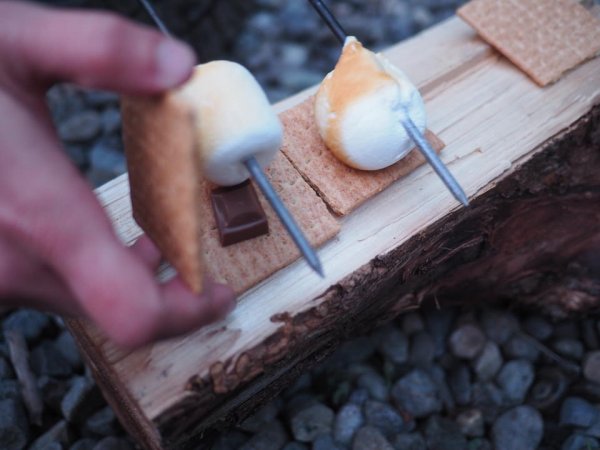
Camping quiz round 6: big question
Final round in these outdoor quiz questions…
50. You have 90 seconds to write down your camping packing list – GO!
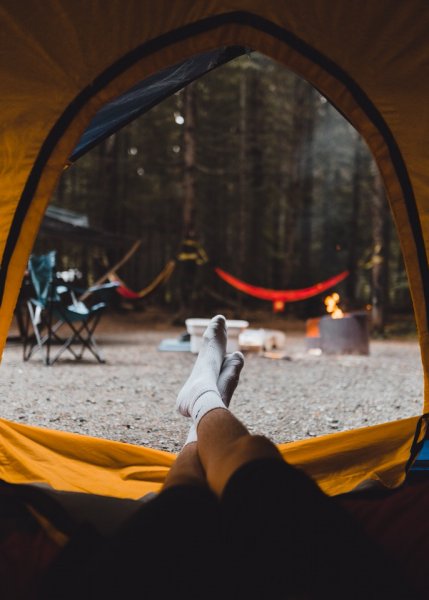
Answers to the camping quiz
The camping quiz answers are coming very soon.
If you’re not ready….
Not near water, or trees overhead, or a trail
2. In camping, what is a fly? Waterproof material that goes above your tent to protect against the elements.
The ground
Hydrostatic Head
A way of measuring how warm the bag will keep you.
6. What should you do if you need a poo in the wilderness ?
Take a spade, do it, and cover it back up with soil.
Sleeping on the ground without a shelter; no tent, no tarp, no hammock, and no bug net.
Glastonbury Festival can charge over £1000 a night for a tent
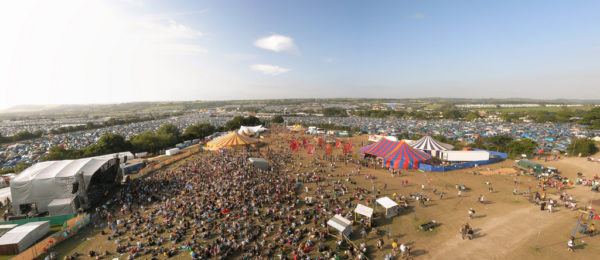
Blair Witch Project
A Walk in the Woods
Into the Wild
Carry On Camping
Stand By Me
Brits – it was the Victorians camping on the Thames that made it popular.
Camp-Life in the Adirondacks
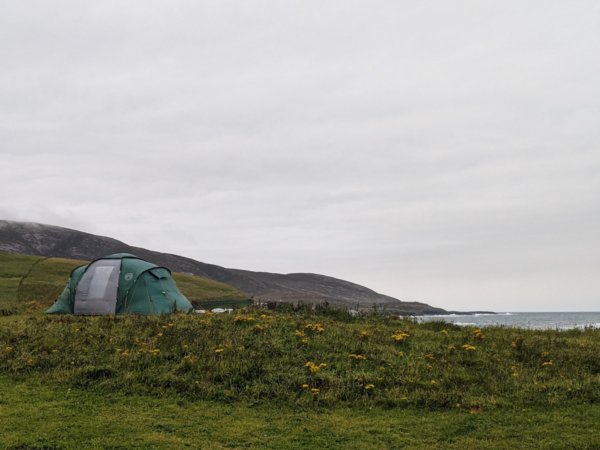
Portaledge
Bell tents
23. What’s the name of the tents that go up in a few seconds, cheap and popular at festivals ?
Pop up tent
Bivy tent
Geodesic
Tunnel
4 Season tent
Bedouin tents
Traditional Bedouin tents are made out of black goat hair. The Bedouin term for tent is buryuut hajar , which literally means ‘house of hair’.
30. This tent is traditionally used by Indigenous people all over the world
Tipi or teepee
31. Camping stove
32. Camping chair
33. Marshmallows
34. Toilet roll
35. Hiking boots
36. Camping mug
38. Tent pegs
39. Water bottle
40. Name everything you’d need to bring if you wanted to cook beans on toast:
- Camping stove
- Can of beans
- Something to open beans
- Plate
- Bread
- Pepper
- Pot to cook in
Answer: The US Forest Service’s website states:
“1. First, drown the campfire with water! 2. Next, mix the ashes and embers with soil. 3. Scrape all partially-burned sticks and logs to make sure all the hot embers are off them. 4. Stir the embers after they are covered with water and make sure that everything is wet. 5. Feel the coals, embers, and any partially-burned wood with your hands. 6. Everything (including the rock fire ring) should be cool to the touch. 7. Feel under the rocks to make sure no embers are underneath. 8. When you think you are done, take an extra minute and add more water. 9. Finally, check the entire campsite for possible sparks or embers, because it only takes one to start a forest fire. 10. Remember…if it is too hot to touch, it is too hot to leave. Please take the time to completely put out your campfire, it could prevent a wildfire.”
At least 1 minute.
They’re a North American sweet snack consisting of a chocolate bar and toasted marshmallows sandwiched between graham crackers. Something along those lines will do!
Keep it in a vacuum flask for later
That it has a ring pull
Yes, fire.
c) Keep the cooler out of the sun and keep the lid closed tight.
- Make noise! Let bears know you’re there. Call out, clap, sing or talk loudly especially near streams, dense vegetation and berry patches, on windy days, and in areas of low visibility. Bear bells are not enough.
- Watch for fresh bear sign. Tracks, droppings, diggings, torn-up logs and turned-over rocks are all signs that a bear has been in the area. Leave the area if the signs are fresh.
- Keep your dog on a leash at all times or leave it at home. Dogs can provoke defensive behaviour in bears.
- Larger size groups are less likely to have a serious bear encounter. We recommend hiking in a tight group of four or more. Never let children wander.
- Use officially marked paths and trails and travel during daylight hours.
- If you come across a large dead animal , leave the area immediately and report it to park staff.
- Dispose of fish offal in fast moving streams or the deep part of a lake, never along stream sides or lake shores.
Tips from Parks Canada
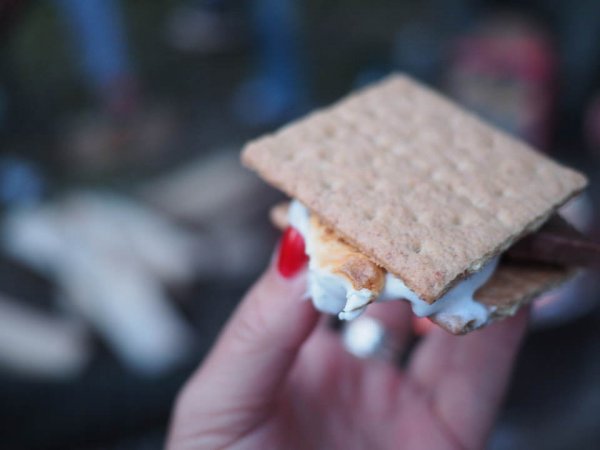
Whoever has the most appropriate items, wins! Or if you’re playing this camping quiz by yourself, get 20 and you can have a point. For a full list of recommendations, check out my camping at festivals packing lists .

Camping quiz
Hope you’ve enjoyed the camping trivia – makes me want to get out there and get exploring!
If I’ve whet your appetite for quizzes then check out my festival quiz , or my world food quiz . Or if all you want to do now is read about camping, then how about my advice on camping in Canada , or wild camping in the Outer Hebrides ?
I can see a lot of camping trips in my 2021 – how about you?!
READ MORE: 9 Tips for Eco Friendly Camping
PIN THIS CAMPING QUIZ FOR LATER
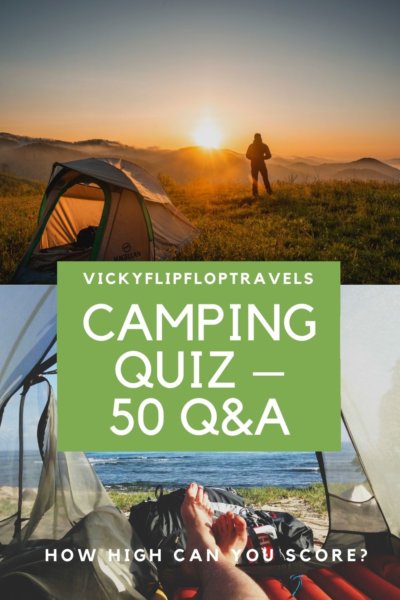
Related Posts:
- The BIG World Festival Quiz: 50 Questions & Answers
- 10 Eco Camping Tips to Make Your Trip Greener
- How to Go Camping With a Toddler, and Have Fun
- Cooking Outdoors: 18 Tips for the Best Results
- Unusual World Christmas Quiz: 50 Questions & Answers…
- Airport Trivia: 50 Questions & Answers (+Airport…
Hi, I'm Vicky! I wrote this. You can find me on all the social media @VickyFlipFlop. I love a bit of adventure, will try anything once, and have a strong passion for the local food and drink, whatever it may be. I'm here to help inspire you to travel to places a little out of your comfort zone, or at least to explore the usual destinations in a different way. Stay, have a look around, and if you have any questions – let me know below.
Question 50 camping list
The answer given for question 12 is not correct. The book/movie Wild is about a woman who hikes the PCT (Pacific Crest Tail), not the Appalachian Trail.
Hello Shane, thanks so much for taking the time to comment. You’re right. I’ve updated that now. Thanks, Vicky
so… where are the answers?
Derek, if you keep scrolling to the end you’ll see them. Thanks for doing the quiz!
Leave a Reply Cancel reply
Your email address will not be published. Required fields are marked *
Sign me up for the newsletter!

Fun camping questions: Make Your Adventure Unforgettable!

Last updated on July 9th, 2023 at 11:22 am
Creating engaging conversations while camping is an excellent way to disconnect from everyday life and connect with nature. You need some fun camping questions in your back pocket to spark exciting discussions around the campfire with family and friends, or when solo camping.
The following are fifteen fun camping questions to ask on your next camping trip.
Table of Contents
What makes a fun camping question?
A fun camping question is an exciting question that can ignite interesting conversations and build a sense of community among fellow campers. They can be spooky, light-hearted, deep, thought-provoking or even funny. Regardless of the type, the goal is to keep the conversation ongoing and create a memorable camping experience.
Why are fun camping questions important?
Fun camping questions are essential because they foster a sense of community and help people get to know each other better while camping. They also act as an icebreaker and keep the conversation going around the campfire , leading to a more enjoyable camping experience.
Icebreaker questions for camping
- What is your favorite camping memory?
- What’s the craziest thing you’ve done while camping?
- What’s the most interesting place you’ve ever camped?
- What’s your go-to camping meal?
- Have you ever seen a bear while camping?
Interesting camping questions
- If you could camp anywhere in the world, where would you go?
- What’s the most beautiful campsite you’ve ever been to?
- What’s the most unusual wildlife you’ve encountered while camping?
- What’s the longest camping trip you’ve ever taken?
- Have you ever gone camping in the winter?
Funny camping questions
- If you were a woodland animal, what would you be?
- Have you ever slept in a tent with someone who snores?
- What’s the worst camping experience you’ve ever had?
- What’s the most ridiculous camping gadget you’ve ever seen?
- Would you rather fight one horse-sized mosquito or 100 mosquito-sized horses?
Fun Would you rather camping questions
- Would you rather camp in the mountains or by the beach?
- Would you rather sleep in a tent or a hammock?
- Would you rather go camping alone or with a group of friends?
- Would you rather cook your meals over a campfire or bring pre-cooked meals?
- Would you rather go camping in the summer or in the winter?
- Would you rather camp in a national park or in a secluded spot in the wilderness?
- Would you rather have a comfortable camping chair or a cozy sleeping bag?
- Would you rather go hiking or fishing during your camping trip?
- Would you rather have access to modern amenities like showers and electricity or have a more rustic camping experience?
- Would you rather sleep under the stars or in a fully enclosed tent?
Deep camping questions
- What does nature mean to you?
- How does camping help you reconnect with nature?
- What’s the most valuable lesson you’ve learned while camping?
- What’s the most important thing you’ve learned about yourself while camping?
- What’s the most meaningful camping experience you’ve had?
Thought-provoking camping questions
- What’s the meaning of life?
- What’s the purpose of nature?
- What’s your favorite thing about camping?
- What’s the most beautiful thing you’ve ever seen in nature?
- What’s the most profound thing you’ve ever learned from nature?
Nature-related camping questions
- What’s your favorite type of tree?
- What’s your favorite animal to see while camping?
- What’s the most beautiful natural landmark you’ve ever seen?
- What’s the most breathtaking sunrise or sunset you’ve seen while camping?
- What’s the most beautiful natural phenomenon you’ve witnessed while camping?
Survival-related camping questions
- If you were stranded in the wilderness, what’s the one survival item you’d want to have with you?
- Have you ever had to use your survival skills while camping?
- What’s the scariest situation you’ve ever been in while camping?
- What’s the most important survival skill to have while camping?
- What’s the most extreme camping trip you’ve ever taken?
These 15 fun camping questions should create an engaging camping experience and foster exciting conversations around the campfire. Don’t forget to pack them on your next camping trip!
Stay in the Loop
Subscribe for exclusive content, giveaways, new products and more!

- Backpacking
- Backcountry Cooking
- Wilderness Medicine
- Destinations
- TRIP REPORTS
Adventure , Camping Skills
Camping 101: the ultimate guide to camping for beginners.

Camping is one of the best activities out there. Who doesn’t want to hike away from the hustle and bustle of the city, pitch a tent under the stars and cook a delicious meal over the fire. Camping – be it at campgrounds, in the mountains or on the river – is something I think everyone should try, at least once in their life. But if you’ve never been before, your first time camping can be overwhelming or intimidating. That’s why I’ve put together this comprehensive guide on camping for beginners.
In The Ultimate Guide to Camping for Beginners , you will learn:
- How to plan your first camping trip
- How to camp (packing, setting up your tent, lighting fires, cooking and more)
- Camping gear for beginners
- Sample packing list and meal planner
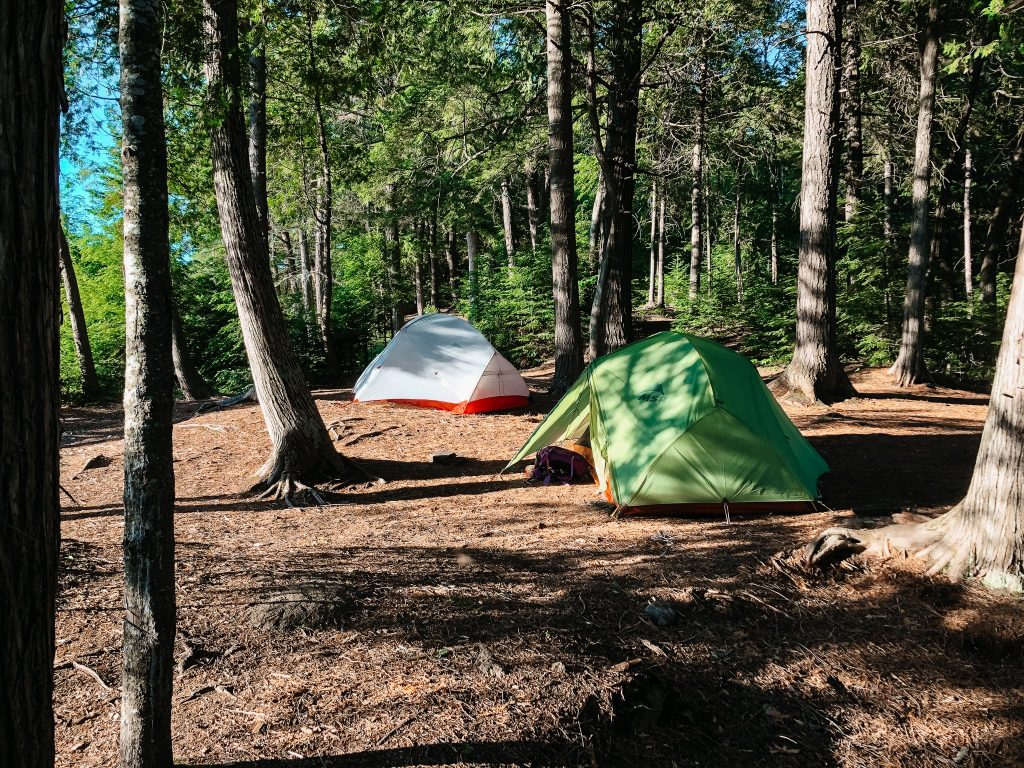
This post may contain affiliate links. If you make a purchase through one of these links, I may receive a small commission at no extra cost to you. Your support is much appreciated! You can learn more by reading my full disclosure .
Camping for Beginners: Introduction
This guide will give you the knowledge and tools on how to camp and enable you to plan your first camping trip. The easiest way to get good at camping is to go with someone more experienced than you. If this is an option, definitely take it! But if you don’t have someone to go with, do not fret. By reading this guide you should have everything you need to get started.
I’ve written this guide with camping experience from Canada, New Zealand and Iceland and I know it’s largely applicable to the US as well. If you are camping in other countries, most of the information should still apply but ensure you do your research.
Note : Camping 101: The Ultimate Guide to Camping for Beginners is specifically designed for tent camping for beginners. This post does not cover RV / trailer camping.
Section 1: The Basics of Camping
In this section, I will go over the basics of camping – specifically, the different types of camping and how you find campsites to begin with.
1.1 Different Types of Camping
There are broadly two ways we can categorize camping. The first is by the proximity to road access / civilization, and the second is by the type of land.
Proximity to Road Access
Front country camping – Also known as ‘car camping’, front country camping is when you drive somewhere and pitch your tent near your car. Front country camping is typically done at campgrounds, and there are often facilities like washrooms, sinks and sometimes laundry and showers.
Backcountry camping – Backcountry camping occurs away from road access, and typically requires some element of human power to access. This could be hiking, kayaking, canoeing, biking, climbing or another activity. Because backcountry camping isn’t accessible by road, you can’t just get in your car and leave if something goes wrong. As a result, backcountry camping is higher risk and requires more experience than front country camping.
Type of Land
Publicly Managed Land – This is camping on land that is publicly managed by the government (i.e. a national/provincial/state parks). Usually, there are camping fees proportional to the number of services provided. If you are at a car camping campground with washrooms and showers, you can expect to pay $20 – 40 per night per site. Meanwhile, backcountry camping sites could range from $0 to $40 per night.
For example, many “non-operating” provincial parks in Ontario do not have fees. Likewise, you can camp in many National Forests for free in the US.
Wild / Freedom / Dispersed Camping – This can be either car or backcountry camping, but it occurs outside national/provincial/state parks and that usually means it is free .
There are some countries that let you camp in any wild space in the public domain. For example, in Canada we often call this Crown Land Camping and it allows Canadian residents to camp on the land for up to 21 days. Many places in the United States allow for free camping too. New Zealand and Iceland allow freedom camping in many areas if you have a self-contained camper van.
Private Campgrounds – These are car campgrounds that are owned privately. Sometimes they’re owned by a family who lives on the property, or it could be a chain, like KOA campgrounds. These campgrounds tend to be $30 – $50 per night and often have better facilities than parks. Some even have swimming pools, activities and free boat rentals.
1.2 Finding Campsites
So with all those types of camping, how will you ever find a campsite? Well, it helps to start with what you want out of your trip. Camping beginners will likely want to start with front country camping ( car camping ) so they can be close to their vehicle and don’t need to carry all their gear themselves.
I’ve found camping beginners also tend to prefer camping in national/state/provincial parks over wild/freedom camping because it’s really easy to find campsites and book reservations. Finding free camping is a bit of an art and takes some practice.
So I recommend Googling parks near where you live and then booking a campsite through their reservation portal.
Note : If you live in Canada and really want to do backcountry camping, head over to Trip Reports where we have compiled detailed guides for tons of beginner canoeing and hiking routes. They have literally all the information you need to plan the trip (maps, reservations, itinerary, tips and more).
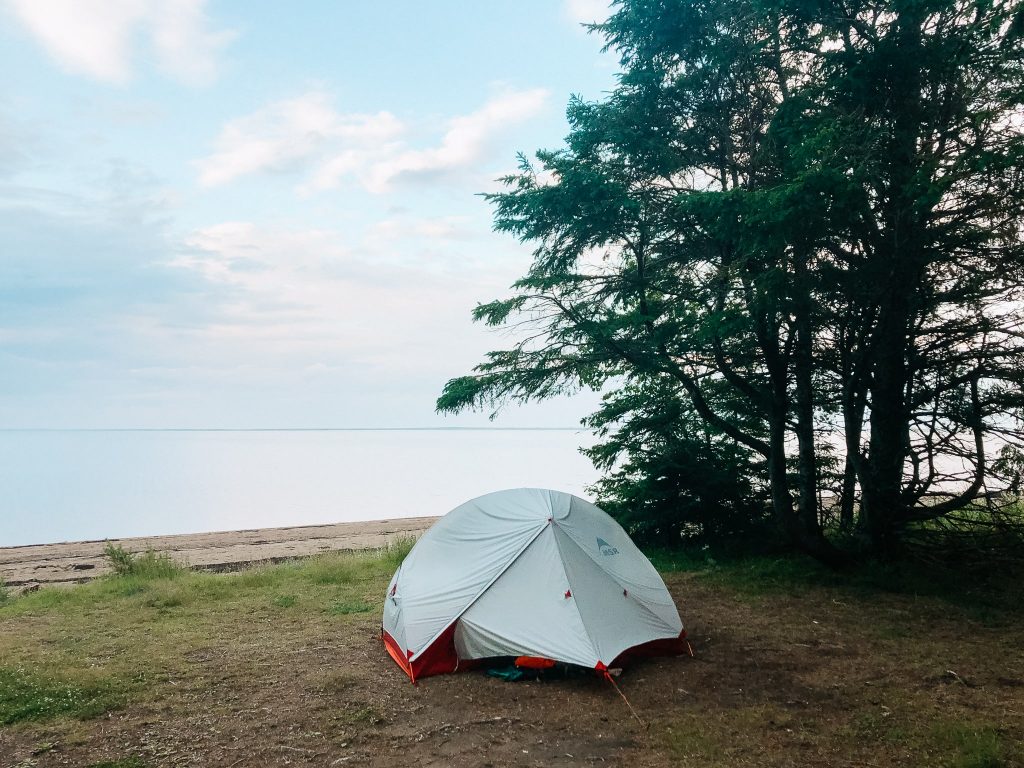
Section 2: Planning & Preparation
2.1 choose a destination & book your sites.
As I stated above, a great starting place is searching for parks in your area. When you’re considering different parks, consider the following:
- How far away is it? Parks further from the city tend to be less busy, but they also involve more driving.
- What facilities are there? Decide what facilities you want and what is available.
- What things are there to do? While camping is itself an activity, search for hiking / paddling / activities in the area.
- How popular is it? I suggest Googling something along the lines of “most popular parks” in your location. There is usually a reason a park is so popular – be it beauty, facilities, proximity. Decide how much solitude you’d like on your camping trip, as popular parks tent to be busier.
Depending on your destination, you will likely need to make a reservation in advance. If this is the case, book your campsite or camping permit.
2.2 Choose a Time to Go
The exact time of year will partly depend on your geography and interests, however, this advice applies to the broad United States / Canada / Western Europe regions. If this will be your first time camping, I highly recommend going in the summer.
Other considerations :
- Climate : Perhaps the biggest driving is climate, specifically temperature and precipitation. Most people go camping when it’s warm out and try to avoid particularly rainy seasons.
- Wildlife : Some people will time their camping trips with when they’re most likely to see wildlife. For instance, many people go camping in the winter or early spring for moose spotting.
- Scenery : Different seasons provide sceneries. Autumn is a popular time to go camping due to fall foliage, but the chillier temperatures mean you need more gear and experience.
Pro Camping Tip for Beginners : In Canada and much of the US, I specifically recommend beginner campers plan their trips for early August. As it’s summer, the weather is warm so you don’t need much gear and there’s little-to-no risk of things like hypothermia. June and July are even warmer but many regions have higher levels of mosquitos and black flies at this time, making for a less than enjoyable time.
2.3 Choose How Long to Make Your Trip
If this will be your first camping trip, I typically recommend going to a campground for two nights. I think planning a camping trip is too much work for a single night; with driving, setting up camp, cooking and cleaning, you just don’t get enough time to actually enjoy the camping trip.
On the other hand, if you will be backpacking or paddling out to you campsite it may make more sense to go for a single night. That way, if you are uncomfortable or need something, you’re relatively close to home. My first backpacking and paddling trips were all single nights. Keep the distance you travel short so you have time to enjoy being at the campsite.
2.4 Prepare Your Route Card
This is something not nearly enough people talk about! Whenever you go out into the wilderness, you should build a route card and leave it with a friend or family member not on the camping trip.
What is a route card?
A route card is a list of where you will be camping each night and when you intend to be back home. For long and remote trips, a route card might have information on the GPS coordinates of campsites and emergency access points, emergency contacts and more. For short trips, a route card is simply where you’ll be camping (i.e. Mew Lake Campground, Algonquin Provincial Park) for which days (i.e. June 12th and June 13th) and when you’ll be home (i.e. June 14th).
You should also leave instructions for what your friend/family should do if you don’t return on time. For example, this could be the phone number of the park office.
Why does this matter?
You leave a route card in case you get lost or injured on your camping trip, or if your car gets a flat tire and you don’t have cell service. That way, someone knows you’re missing and can take steps to get you found.
I’ve always done this for backcountry camping trips, but one time my boyfriend and I were driving to a car camping site and blew a tire on a mountain road without cell service. I hadn’t told anyone where we were, so no one had any idea. Thankfully everything worked out, but since then I always leave a route card with someone.
2.5 Gather Your Tent Camping Essentials
Okay, so you’ve got your first camping trip planned. Now it’s time to gather all the gear you’re going to need. Since there is a long list of things you need to camp, I’ve dedicated all of Section 3 to this topic. There you will find exactly what the tent camping essentials are and how to get them inexpensively if it’s your first time camping.
2.6 Go For a Test Drive
As much help as I can provide over in a beginners camping guide, the best way to learn how to go camping is to go out and do it – in a low risk environment. So before you go out on your first camping trip, try spending the night in your backyard. This will show you a few things:
- Do you know how to use all your gear?
- Is there anything you’re forgetting?
- Are you warm enough?
- Are you comfortable?
Because you’re in your backyard, you can simply go inside and grab something you’ve forgotten. Or, say your sleeping bag is not nearly warm enough, you can move inside for the night. Camping is all about testing and refining what works for you.
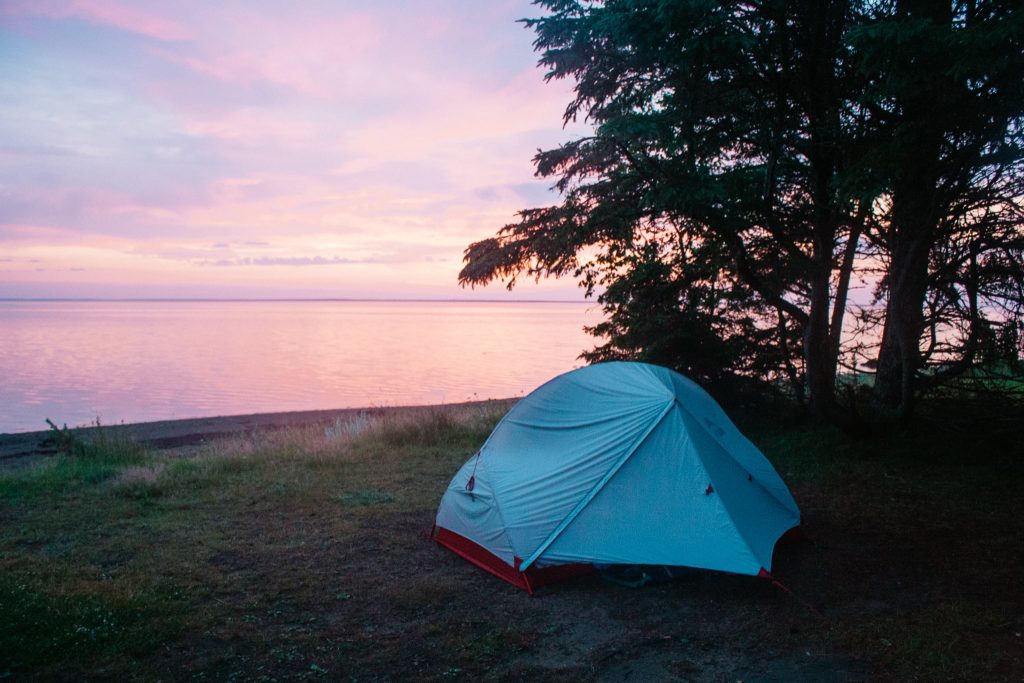
Section 3: Clothing & Gear – Things You Need to Camp
In this section, I’m going to go over the essential things you need to camp. This includes both the gear and clothing you need to stay safe, as well as the gear and clothing you should bring to be comfortable.
3.1 Safety Gear
- First Aid Kit – You should always bring a first aid kit. I have a full post on how to build your own wilderness first aid kit , but the basics are this: pain killers, allergy medication, wound kit (bandages, gauze, polysporin), blister kit (bandaids, moleskin, medical tape).
- Satellite Communication Device – If you will be camping somewhere without cell service, bring some form of satellite communication device. These are pricey and not always feasible for camping beginners. Some places allow you to rent them. If you don’t have one, stay somewhere with cell service. >>This is the one I highly recommend.
- Map & Compass – If you are hiking or paddling to your campsite, ensure you bring a map and compass.
Pro Beginners Camping Tip : Even some drive-in campgrounds don’t have cell service. Download your map and directions to your phone so you can still access them if you lose service.
3.2 Shelter Gear
- Lightweight Tent – If you will be camping at your car, your tent doesn’t need to be lightweight. However, if you are hiking or paddling to your campsite, you want it to pack small and be light to carry. For camping beginners, I typically recommend they choose an inexpensive tent, even if it’s a bit bulky. As you do more camping, though, you’ll want to upgrade. >>This is an affordable backpacking tent I previously used.
- Sleeping Pad – Your sleeping pad adds a layer of air in between you and the ground. They typically pack small and are light to carry, and they can be inflated with your mouth.
- Sleeping Bag – Finding a warm sleeping bag that packs small can be tricky for beginner campers, as they tend to be expensive. If car camping, don’t worry about it being light. If backpacking, try renting a sleeping bag or choose one made from synthetic material, as this tends to be cheaper. >>Here is an inexpensive, but lightweight, sleeping bag.
- Camping Pillow – This is optional, but will improve the comfort. >>I recommend an inflatable pillow to cut down on space.
Note : Many of these items are essential things you need to camp, and are part of the 10 Essentials. If you’re not familiar with the 10 Essentials, read this post .
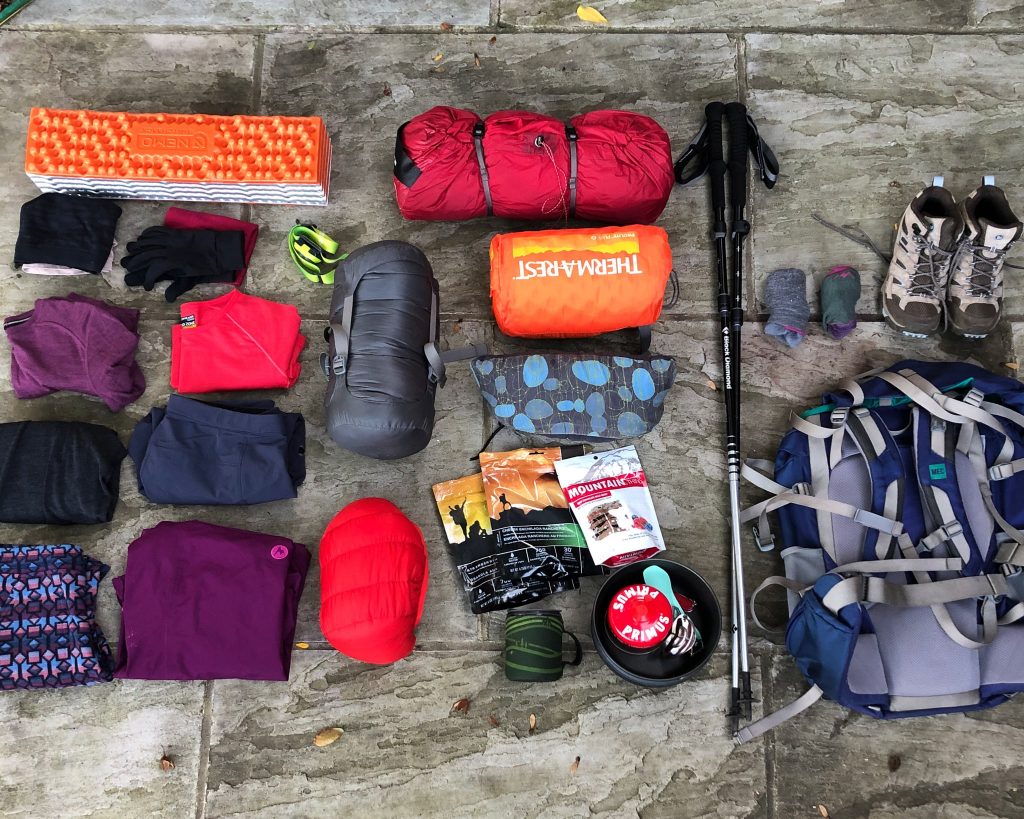
3.3 Cooking Gear + Food
Here are the items you need to cook basic meals on camping trips. Feel free to bring other gear if space allows and get creative with your cooking!
- Water Bottle – Bring a reusable one to cut down on single use plastic!
- Water Purification – Needed if you will be camping somewhere without running water. This could be water filtration tablets, a Sawyer Straw, water pump or similar device.
- Matches / Lighters
- Camping Stove – For car camping, you can use a larger 2-burner stove. For backcountry camping, you can use a backpacking stove.
- Grill – Some fire pits come with a grill, but if you know you want to cook over the fire and don’t know if your fire pit will have one, you can bring a cheap, lightweight grill .
Cooking Gear
- Pots and / or Pans
- Big Spoon / Spatula
- Bowls and Cutlery
- Biodegradable Dish Soap & Sponge – Use this to wash your dishes after eating.
- Garbage Bags – Unless garbage facilities are present, you must pack out everything you pack in. So bring a few garbage bags for waste.
There’s a lot that goes into planning food, so I’ve included a separate section for meal planning in the appendix.
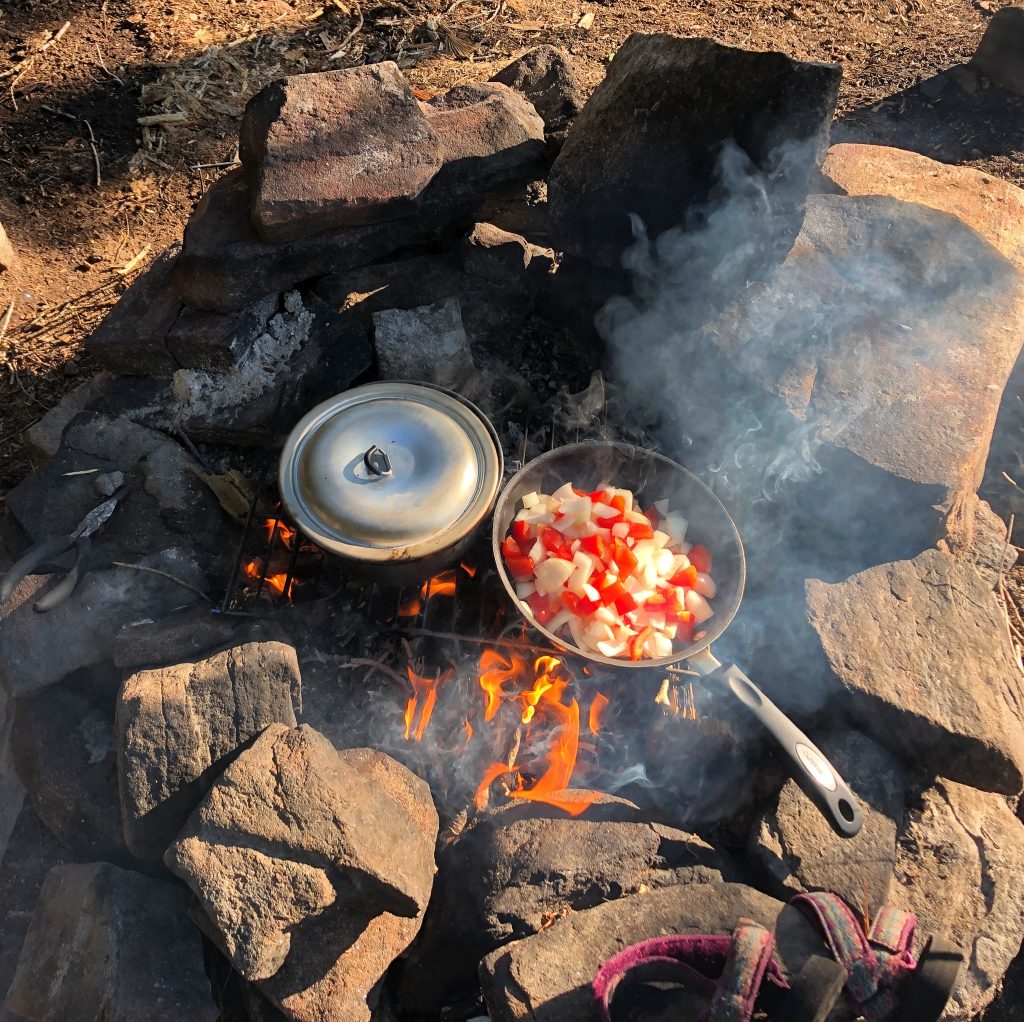
3.4 Clothing
The clothing you wear camping can roughly be categorized into four groups.
Day Clothing – This is the clothing you wear during the day and when you’re on the move. It needs to be durable and comfortable, as you’ll be moving a lot and don’t want anything to rip or tear. In addition, it should be moisture-wicking and weather resistant (so not cotton or denim).
- Durable Hiking T-shirt or Long Sleeve Shirt – Any athletic / gym shirt works when you’re getting starting.
- Durable Hiking Pants or Shorts – Any athletic / gym pants work here too.
- Wool Socks – These will keep your feet warm, even if they get wet. Wool is much better than cotton for socks.
- Underwear / Sports Bra – You know what to do here.
Campsite Clothing – Many people like to change out of sweaty / dirty clothing once they get to the campsite. Campsite clothing should still be durable, but tends to be a little more comfortable and warmer. If you’re going ultra lightweight, you probably won’t bring a second outfit for the evening.
- Comfy Top – This could be a flannel shirt and something made from wool or fleece. Again, we want to avoid cotton.
- Comfy Pants – I like to bring leggings or fleece pants for chilly evenings.
- Sweater or Jacket – Personally, I like to bring both a fleece sweater and a synthetic down jacket. Ideally, avoid bringing cotton.
Sleep Clothing – This is the clothing you wear in your tent, and only in your tent. When you’re getting started, any comfy sleep clothing will technically do. Some people may wear cotton to bed, but I advise against this because if the clothing gets wet it will never dry. Synthetic or wool layers are better for sleeping. And if you’re worried about being cold and have a little money to invest, I highly recommend getting a pair of merino long underwear to sleep in. >>This is what I wear.
Rain Clothing
- Rain Jacket – This is an incredibly important piece of beginner camping gear. Your rain jacket will keep you dry (and warm) even if you have to set up your tent in the rain. You don’t need a fancy Gore-Tex rain jacket when you’re still starting out. My first rain jacket was excellent, lasted for three years and cost less than $80. >>This is the first rain jacket I had.
- Rain Pants – Rain pants are less common, however I really like having rain pants and recommend them for anyone camping in rainy climates. They are loose enough to go over top of hiking pants and are 100% waterproof (unlike hiking pants, which are typically water repellent ).
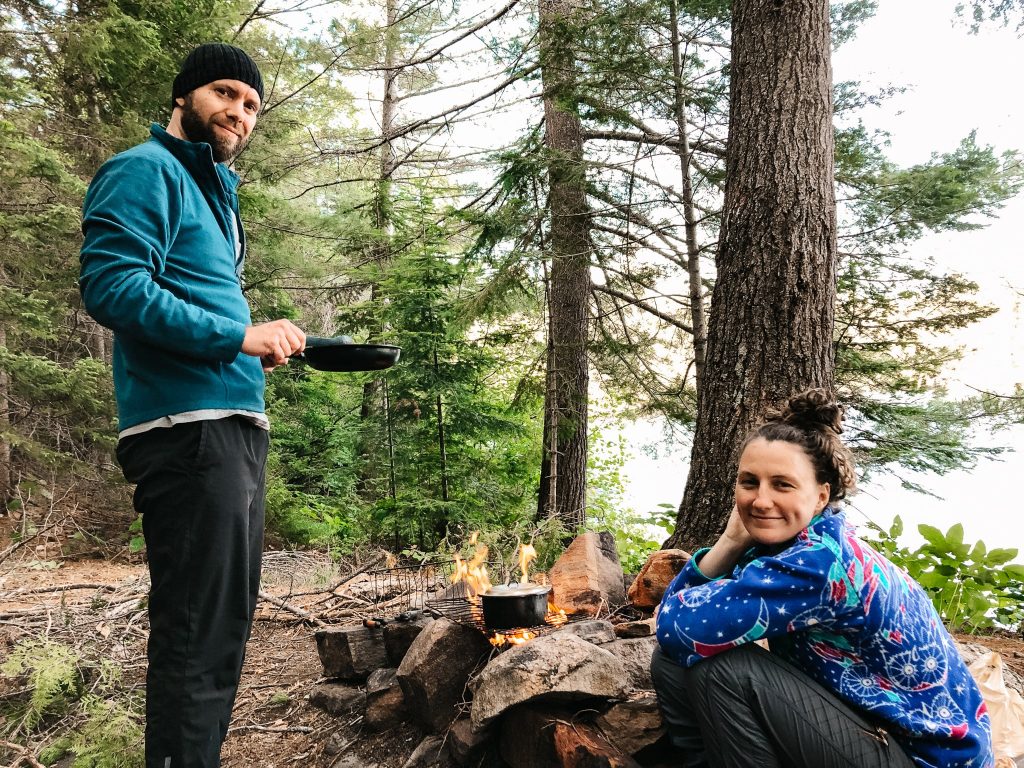
3.5 Footwear
The shoes you bring camping will be somewhat dependent on whether you are driving, hiking or paddling to your campsite. For my first few car camping trips I just wore running shoes.
- Hiking Shoes / Boots – If you will be hiking to your campsite, where a sturdy pair of hiking shoes or hiking boots. Most hiking shoes tend to be waterproof, or at least water resistant, so you’ll still be comfortable if it rains. I recommend the hiking boots as excellent beginner hiking boots.
- Sandals – Whenever I’m at the campsite, I like to wear sandals with wool socks. Especially if I’ve had to hike to my campsite, my feet just want to breathe! So in addition to your sturdy hiking shoes, bring a comfortable pair of shoes for around the campfire.
Read More : 10 Best Women’s Hiking Boots (2021) + Guide to Buying Beginner Hiking Boots
3.6 Miscellaneous
- Backpack – If you are hiking or paddling to your campsite, you’ll need something to put everything. Backpacking backpacks can be expensive, so see if you can rent or borrow one for your trip.
- Dry sacks / Ziploc bags – I like to bring some small dry sacks and zip lock bags to store items. This keeps them dry no matter what.
- Biodegradable Toothpaste – Many car campgrounds have washroom and sink facilities, but if you are hiking/paddling to your campsite you will need to spit your toothpaste into the bush. Please use biodegradable toothpaste.
- Sunscreen – Gotta be sun safe!
- Bug Spray / Bug Hat – This is perhaps one of my most important first time camping tips. Bring a bug hat. Nothing ruins a camping trip more than mosquitos and black flies. A bug hat will keep you sane.
Optional Personal Items
- Books, journal, pen
- Camping Chair
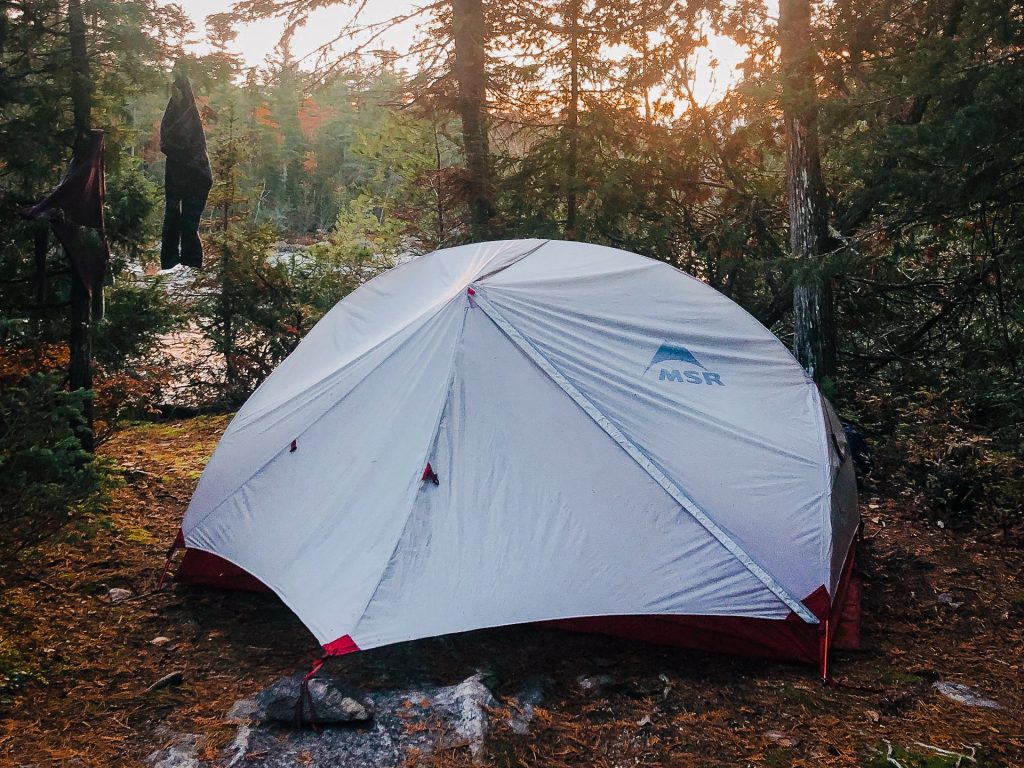
Section 4: Camping Tips for Beginners
This section is about how to camp – that is, how to actually execute a camping trip! There’s only so much I can explore though. The only way to really learn how to go camping is to get out and do it!
4.1 Getting to Your Campsite
Depending on the campground you’re at, you may need to check in with a park office or visitor’s centre to collect your permits / reservations. Many parks are moving away from this and allowing campers to download an electronic version of the permit when they make the reservation. Check what you need for your destination.
4.2 Pitching Your Tent
A integral part of learning how to tent camp is knowing how to set up your tent in the first place! Hopefully you did a test drive and already know how to set up your tent, however I always find the first few set-ups with a new tent take some time (and patience).
When choosing where to pitch your tent, choose relatively flat ground. You don’t want to be sliding in your tent or sleeping on an angle. If there is a slight angle, ensure your head is on the slightly higher ground.
I always recommend pegging out your tent. Once I hadn’t pegged by tent, went on a hike and came back and my tent was a 100 m away and upside down (and had a broken pole). I had no idea a huge wind storm would happen!
Be mindful of where you put the doors. For example, you probably don’t want to put the doors right next to a tree / bush (that could get annoying) or where people watching by could see into your tent.

4.3 Setting Up Your Sleeping Area
Once the tent is set up, I like to set up my sleeping area. I first inflate my sleeping pad, then unpack my sleeping bag and place it on top. Next, I set up my pillow and place my pyjamas on top of my sleeping bag. I also like to take out anything I might need over the night (i.e. toiletry bag, book, journal, headphones).
I do this so that I can keep my backpack / bags outside the tent. If they’ve touched the ground, they may have dirt on them and I don’t want this inside my tent. You can either leave your bags under the tent vestibule (this is the area right outside the door that is covered by the tent fly) or in your car.
Tip : Don’t leave any food in your tent!
4.4 Staying Dry and Warm
Hopefully, you get wonderful weather for your first time camping, but if it is chilly or raining there are a few things you can do to stay warm and dry. First, ensure you aren’t wearing any cotton and put on your rain jacket. Keep all your gear either in the tent, under the vestibule or in the car.
Tip: Bring a tarp and some rope to build a cooking shelter. There are tons of Youtube videos showing how to set up an easy tarp. This gives you a dry place to cook and hang out.
4.5 Lighting Fires
Before you leave for your first camping trip, watch a few Youtube videos on fire building. It’s pretty easy, but it helps to have a demonstration. It helps to bring some newspaper to help the larger pieces of wood to catch. I also sometimes from fire starter.
Remember, campfires should only be built in designated fire pits. If there isn’t a fire pit, use a stove instead.
A Note on Firewood : Check the firewood rules for where you’ll be camping, and double-check if there is a fire ban. Invasive species can live in firewood, so many parks forbid people from bringing their own firewood and thus campgrounds often require you to buy firewood there. If you’re not at a campground, you can usually collect dead branches from the area.
4.6 Cooking Over a Fire or Stove
Cooking over a stove.
I have a TON of beginner camping tips specifically targeted at camp cooking. So many that I actually have a cookbook (shameless plug).
If you’re car camping, cooking on trip is really similar to cooking at home. You can bring a 2-burner camping stove that functions very similarly to a gas stove at home. The only difference is that you need to connect the fuel to the camping stove yourself.
If you’re backcountry camping, you will likely want to bring a much smaller stove. With backpacking stoves, there is an attachment that sits on top or beside the fuel canister. Similar to the above, you open up the flue valve a little and light it with a match or lighter. Now you have heat! >>I recommend this backpacking stove.
Once you have your heat source, you are ready to cook your food. There are tons and tons of camping recipes on various blogs and YouTube channels that you can experiment with. Though I recommend choosing something simple for your first time camping.
Cooking Over a Fire
If you want to cook over a fire instead of a stove, will need a grill. If you’re camping at a campground, there may be a grill built into the fire pit. If you’re backcountry camping, you will likely need to bring your own grill. >>Here is an option for a cheap, lightweight grill .
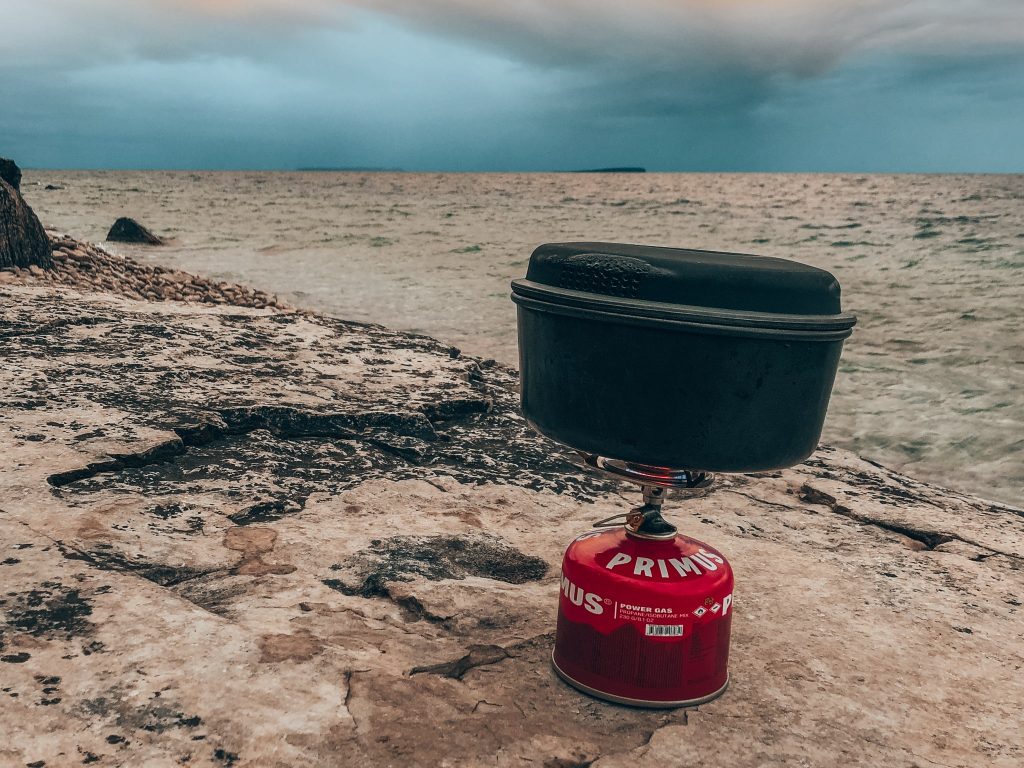
4.7 Camping Etiquette
Camping etiquette is so important! Here are a few things you can do to ensure you’re respecting other campers:
- Don’t play loud music and be quiet after ~10 pm
- Don’t walk through others’ campsites
- Be mindful taking a photos if you’re near someone else’s campsite
- Keep dogs on a lease unless you are in an off-lease area
- Clean up after yourself, your group and your pets
I’m working on a full guide to camping etiquette, so stay tuned for more tips!
4.8 Leave No Trace Camping
It’s so important that we respect the environment and wildlife when we are camping. This means ‘leaving no trace’ – ensuring you leave the site as you found it (or leave it better than you found it). There is a lot to cover here, so I recommend reading my post on Eco Camping: Your Guide to Environmentally Sustainable Camping .
But here are the highlights :
- Don’t alter your campsite at all : Do not build new fire pits, tear down branches, making tent clearings
- Pack out everything you pack in : Bring a garbage bag or use the provided garbage facilities. Absolutely no trash should be left at the campsite (and this includes in the fire pit). Be especially mindful of plastic wrappers and food packaging.
- Correctly dispose of grey water and human waste : Check what the specific requirements are for the place you will be camping and follow them.
- Use all natural, non-toxic products : Wear all natural sunscreen and use all natural toothpaste (I like Tom’s ).

Camping for Beginners: Conclusion
I really hope you’ve found this guide helpful and have the confidence to take your first camping trip! If you have any questions on how to camp, please leave a comment or send me a message.
Camping 101: Meet Your ‘Instructor’
I thought it’d be helpful to introduce myself. My name is Mikaela and I used to work as a wilderness guide throughout Canada. My first long camping trip was a two-week canoe trip in 2010, and since then I’ve spent hundreds of nights in the wilderness.
And through guiding, I’ve spent a lot of time teaching kids and adults how to camp, so I’m acutely aware of the questions and challenges that come with camping for the first time. I am sure this beginner’s camping guide will give you the knowledge and resources to go on your first camping trip!
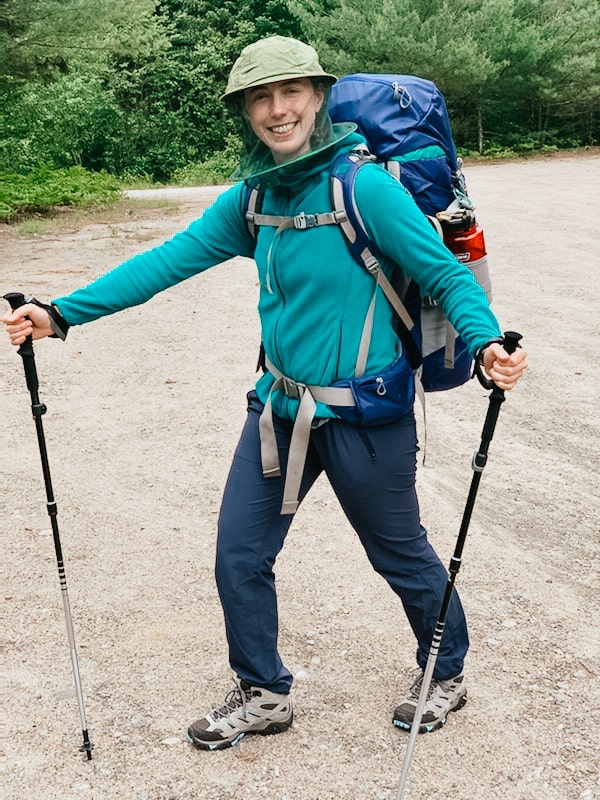
Mikaela | Voyageur Tripper
Mikaela has been canoeing, hiking and camping for over ten years. She previously worked as a canoeing guide in Canada, and spent a season guiding hiking and kayaking tours in the high Arctic. Mikaela is a Wilderness First Responder and Whitewater Rescue Technician.
MY FAVOURITE GEAR
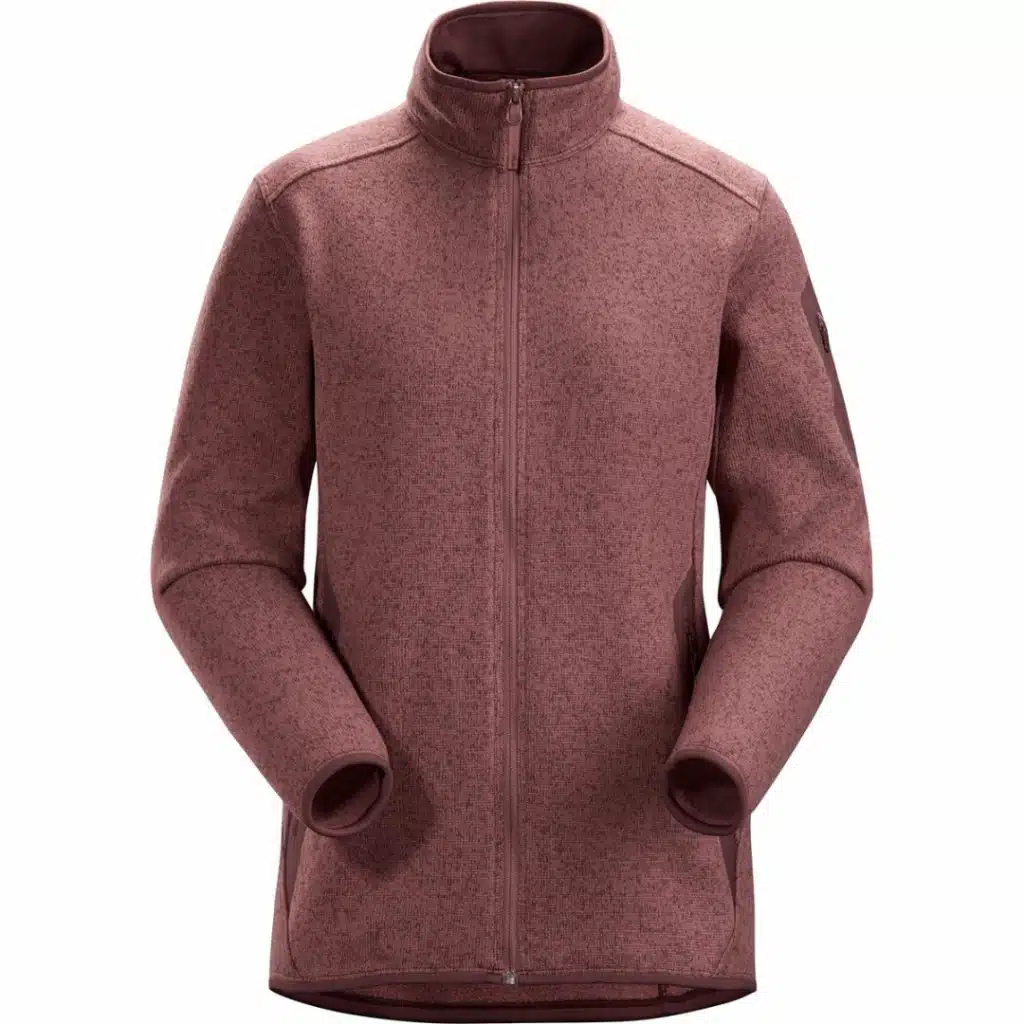
Fleece Sweater
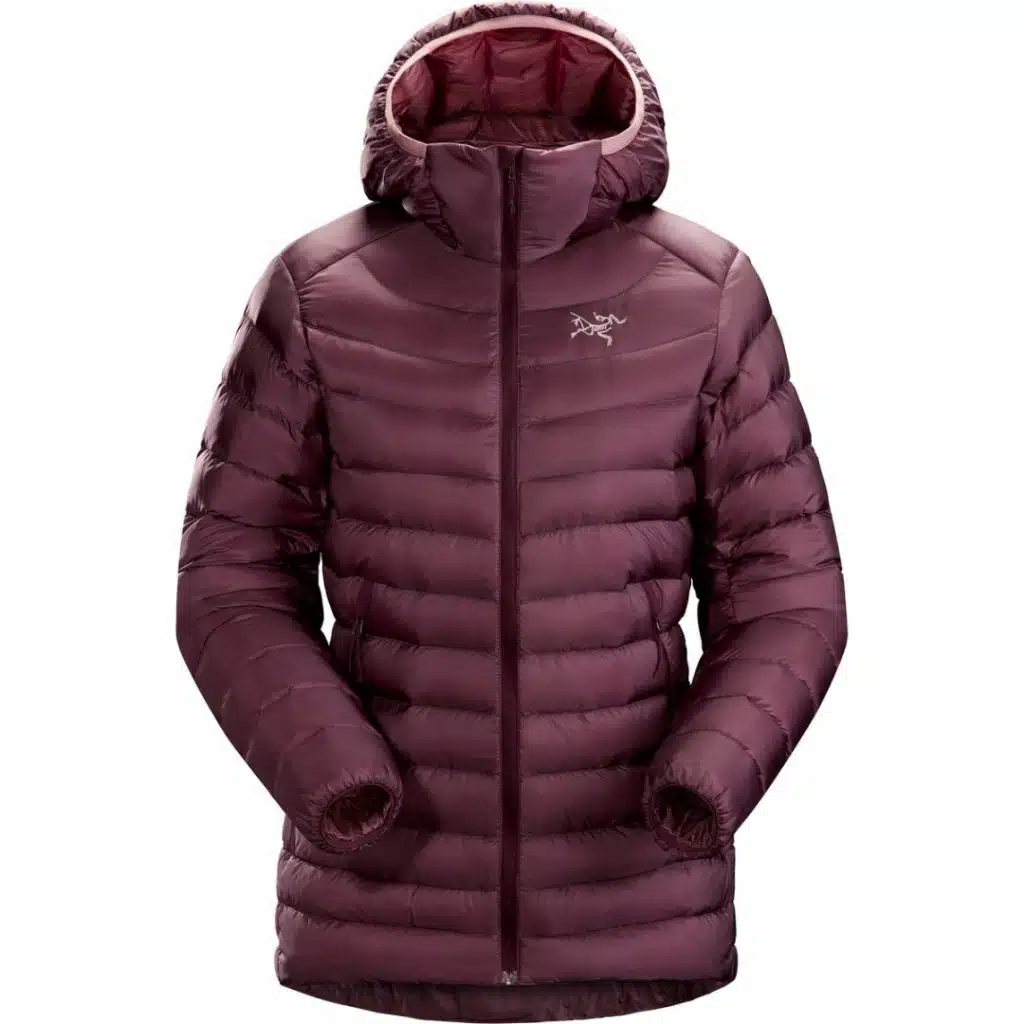
Down Jacket
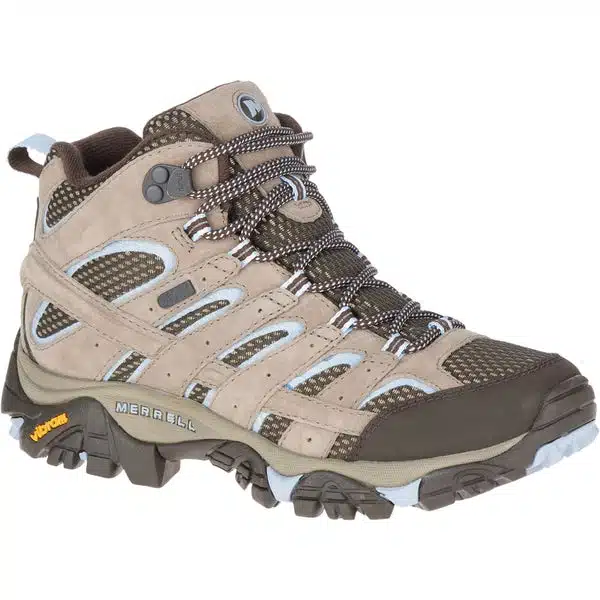
Hiking Boots
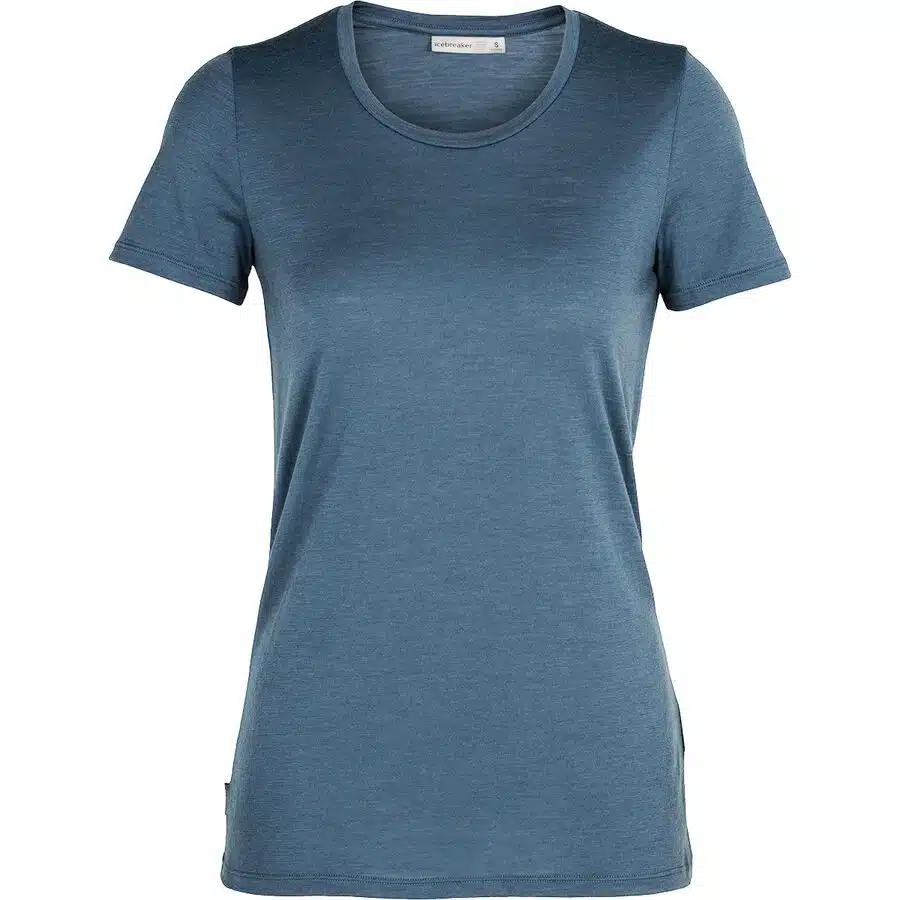
Hiking Shirt
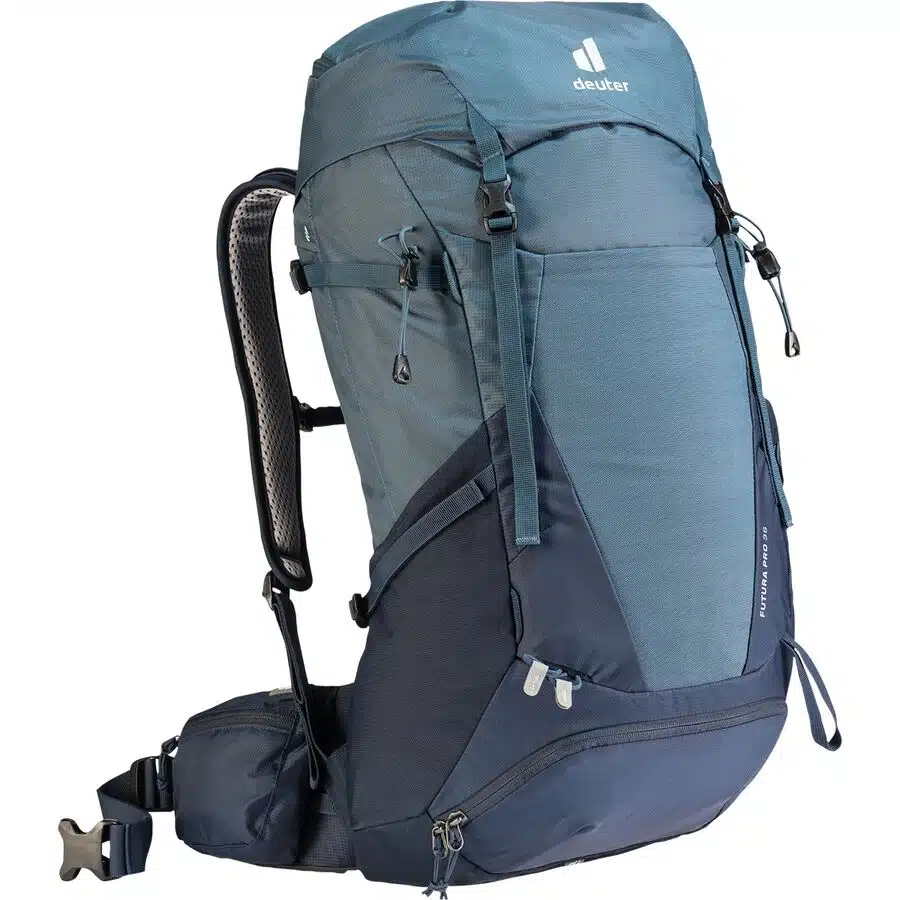
Hiking Pants
5 thoughts on “ Camping 101: The Ultimate Guide to Camping for Beginners ”
Stay in touch.
Join our community of outdoor adventurers - you'll find trip inspiration, gear discussions, route recommendations, new friends and more!
Hi your blog is very helpful! I am Rhene from the Philippines, and I’m also a teacher who promotes Outdoor Adventure in the Philippines. I hope I can invite you to talk in our forum/conference to share your expertise and experiences in the outdoors.
Thank you for explaining that you shouldn’t wear cotton if the weather is chilly or raining. I’ve been trying to get some advice for our camping trip that we’re taking next week. I’ll be sure to remember this advice in case the weather is cold.
You’re welcome, Olivia! Glad I could help!
I found it helpful when you recommended that we go for two nights for our first camping trip since a lot of work is needed in planning a camping trip even for just one night. It’s my first time going camping with friends since we just got an RV rental booked, so we’ve been looking for campsites to consider. I’ll be sure to take note of this suggestion while I check out RV resorts we might consider for our trip.
Two nights also works – though I prefer one for beginners just in case they have a really bad sleeping experience. Have a great time on the RV trip, Anna!
Leave a Reply Cancel reply
Your email address will not be published. Required fields are marked *
Save my name, email, and website in this browser for the next time I comment.
- Facebook Group
10 Questions Everyone Has Before Their First Camping Trip
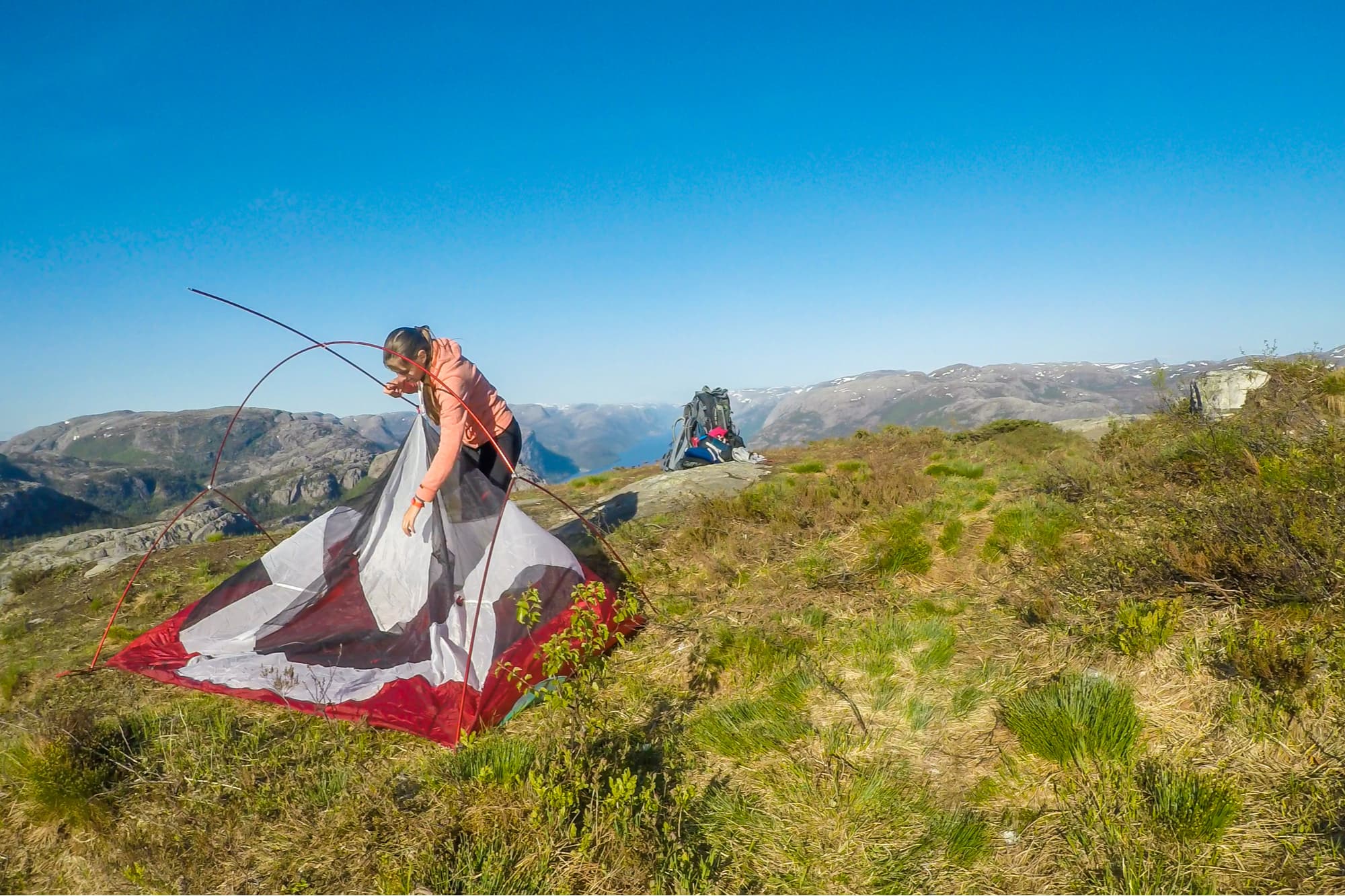
Your first time camping is a memorable milestone, often marked by confusion and mistakes—but that’s half the fun. I had no idea what to expect for my first time, which made it exciting and scary. All I knew for sure was that I was going to have an adventure.
I had an endless stream of questions running through my head before and during my first camping trip: What if I didn’t pack enough food? What if it rains? What about bears? I found it hard to prepare for the unexpected without going overboard.
Whether you’re a seasoned camper or a first-timer, know that you’re not the only one thinking these things. We asked fellow outdoor enthusiasts on The Dyrt’s Facebook Campfire group to provide us with insights on their first time in the wilderness.
Here are 10 questions you might have on your first camping trip—and how to find a solution.
10 Things To Know Before Your First Time Camping
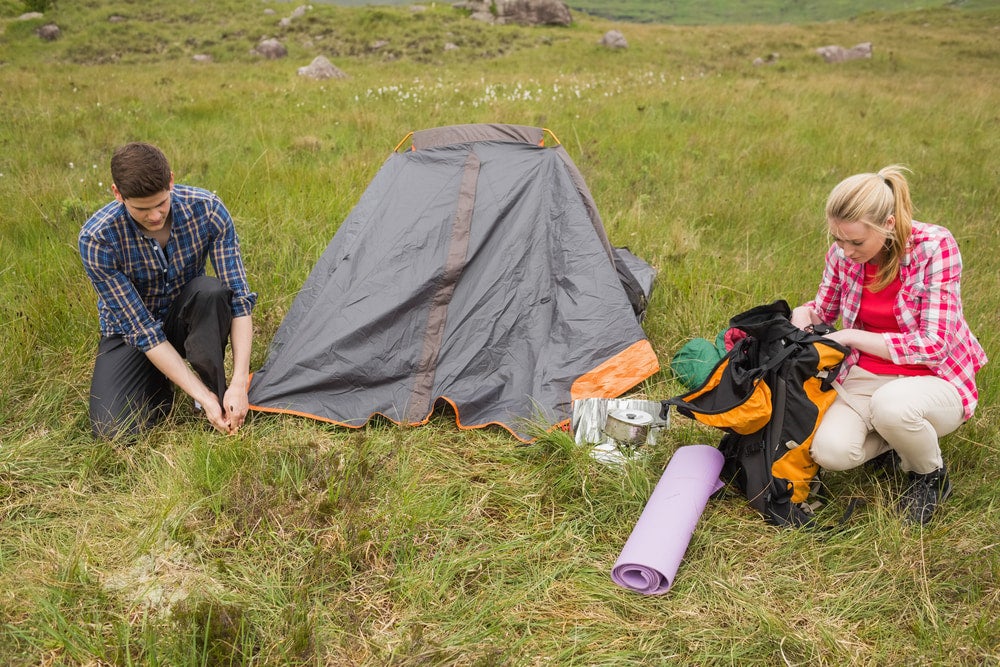
1. How do I pitch a tent?
I knew my first time pitching a tent would be no walk in the park. If I struggle to put together IKEA furniture, how the heck am I supposed to pitch a tent? After my first time camping, I learned that it’s easier than it looks. My biggest takeaway: be patient when reading the instructions.
Here’s some advice on tents from our readers:
“Tent guylines are a good thing. Knowing how to properly guy out your rainfly is even better.” — The Dyrt camper Lori L.
“Invest in a good tent! Spend more on a quality tent that will keep you dry in a storm! It’s your shelter!” — The Dyrt camper Annetta W.
“Upgrade your tent stakes!” — The Dyrt camper Mark C.
“Make sure the tent stakes you use are high-visibility, or at least, use lines that are painted a bright color. Those hurt!” —The Dyrt camper Shashta L.
“Don’t pitch your tent at the bottom of a hill. We woke up floating on our airbed…” —The Dyrt camper Alan D.
2. How do I prepare for unpredictable weather?
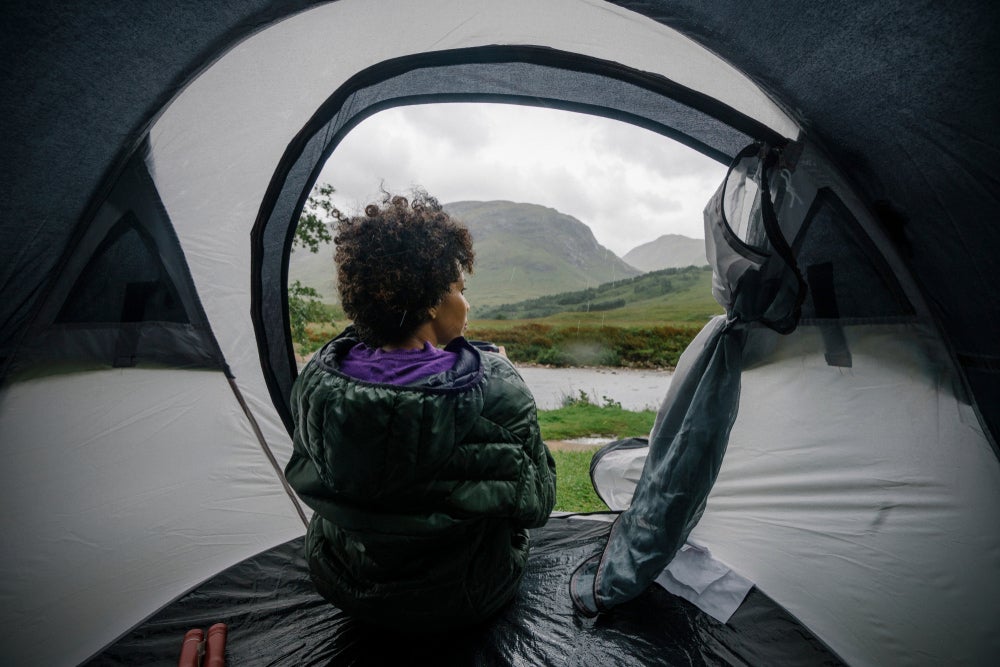
One of the biggest questions looming in my head during my first time camping was, what if it rains? And guess what? It rained. Temperatures also dropped to 28 degrees Fahrenheit at night. Obviously, the show must go on. Check the overnight weather, pack a rain jacket , set up a good tarp, and have fun anyway.
Here’s what campers had to say about unpredictable weather:
“The weatherman is usually wrong.” — The Dyrt camper Denise J.
“I checked the weather but didn’t take note of the overnight temps. It was July in Wisconsin and I was not prepared with blankets, sweatpants, or a sweatshirt. It dropped to the 50s at night and we only had a sheet. We were freezing.” — The Dyrt camper Nikol D.
“A rubber mallet is your friend. Even if it says zero chance of rain, prepare for rain. Better safe than soggy.” —The Dyrt camper Sarah H.
“Enjoy the trip even if it rains.” — The Dyrt camper Amber H.
3. How do you build a solid campfire?
First, make sure that campfires are permitted at the campground, and follow safe campfire practices . But what if all the tinder is wet? What if you run out of fire starter? Here’s one solution:
“Learn how to use wax and sawdust as wet firewood starters.” —The Dyrt camper Cindi M.
Before your trip, melt candle wax in a pot and put sawdust in ice cube trays. Then pour the wax over the sawdust and stick it in the freezer. Bring the tray with you on your trip. You can light this with a match if there are high winds or moist conditions at your campsite.
4. What’s the best approach to cooking on a camping trip?
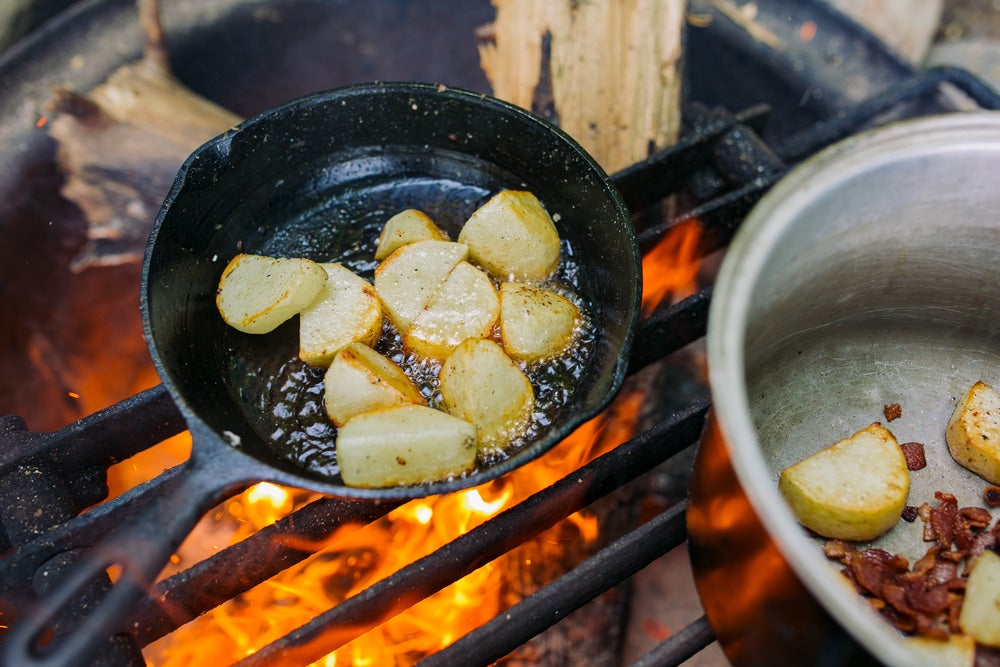
During my first time camping, I learned that the food situation is entirely up to you. I wasn’t sure if I would be fishing for food, foraging , or packing my bag with cans of tuna. Do I make enough sandwiches for the entire trip, or should I bring some pasta? It’s your call. Just don’t forget basic cooking utensils (and beer).
“Pack a meal that doesn’t need to be cooked in case you can’t fire up the stove or fire pit. If it needs a can opener, bring one.” —The Dyrt camper Kym C.
“Always pack an extra can and bottle opener, potato peeler, and utility knife!” —The Dyrt camper Rae W.
“Cook and clean up while it is still light out.” —The Dyrt camper Michele I.
“Bring wayyyyy more beer than you think you’ll need.” —The Dyrt camper Kevin D.
5. What if I get lost?
I expected the worst on my first camping trip: that I would wander aimlessly around the woods, get lost, and be swallowed up by the forest (thanks, Hollywood). Forget the fact that there are maps, phones, GPS , and marked trails to help you find your way—I was convinced I would become Jane with no Tarzan. Turns out, it’s harder to get lost than it is to find the right path.
“It’s best to go with an experienced camper for the first time. Learn all you can. Learn to tie a good knot, how to start a fire, how to pitch a tent, and where to pitch it. Know where you’re going and take the right sleeping bag and clothing.” —The Dyrt camper Curtiss S.
“Don’t overbook yourself and plan a big trip your first time out. Plan something relatively close to home/civilization.” —The Dyrt camper Krista C.
6. What’s the most comfortable way to sleep?
As someone who had never slept in a tent before, I had never slept on the ground either. I know it can be hard to get comfortable during your first time camping, but are there any tips and tricks to getting some shut-eye? It seems that if you have a good tarp to protect you from the rain and wet ground, all will be okay.
“Clean the ground before you pitch your tent so you are not on rocks and it’s level-ish.” —The Dyrt camper Ruth M.
“Check your air mattresses at home to see if they stay inflated. If you don’t sleep, enjoyment is lost.” —The Dyrt camper Paul F.
“A tarp has so many uses! It’s good to have a tarp as ground cover under your tent. It’s good to have a tarp over your food area. It’s good to have a tarp for shade. It’s also good to have a tarp in case it rains. To sum up, it’s good to have a tarp!” —The Dyrt camper Sarah M.
“Wish I had known about hammocks instead of laying on the ground.” —The Dyrt camper Bobby H.
7. What’s the most efficient way to pack?
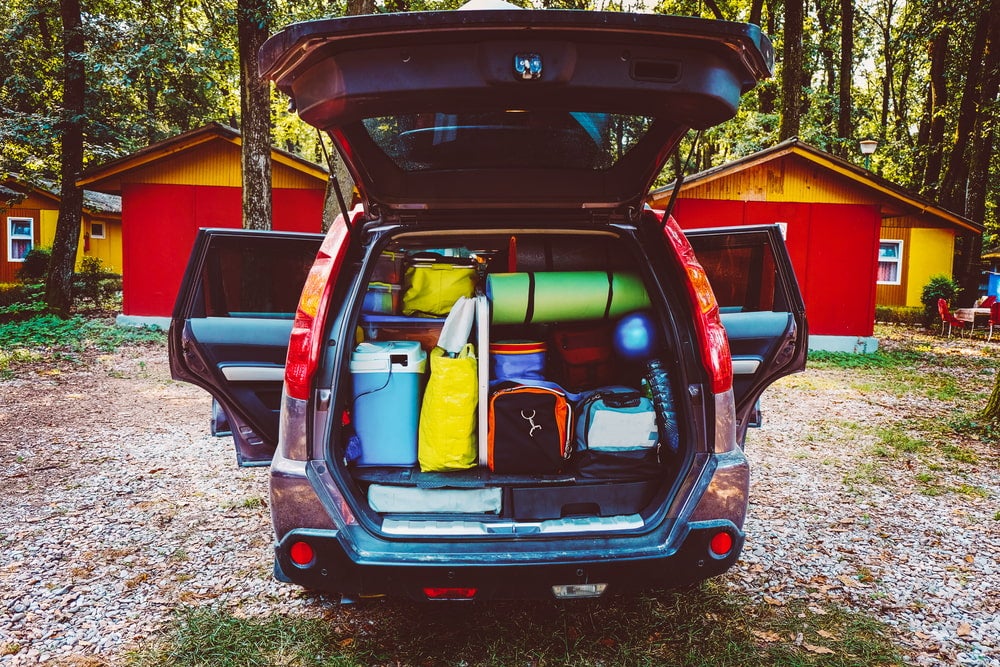
There are many ways to approach first-time camping, but if you decide to do a trek, what’s the best way to lug everything? The answer: pack only what you need and what you’re willing to carry on your back. Otherwise, leave it at home.
“I wish I knew that I didn’t need to bring so much stuff.” —The Dyrt camper Adam K.
“Organize all gear in totes of various sizes, including clothes. Ditch the suitcases and use packing cubes.” —The Dyrt camper Diane N.
8. How do I get help if I hurt myself?
If you haven’t noticed by now, I’m a worrywart. I’m also very clumsy. What if I hurt myself during a hike or get really sick? Is there a way to get help when you’re in the wilderness? First things first—pack a first aid kit .
If your intention is to disconnect by leaving the phone at home , pack a personal locator beacon (PLB) or satellite messenger instead. It lets you call for help regardless of cell service. These devices use a network of satellites that notify national search authorities and the closest first responders of your GPS location within 3-5 minutes.
9. Where do I go to the bathroom?
Specifically, what’s the protocol for going number two?
Most official campsites have toilets and showers. But if you’re in the wilderness and really need to go, find a secluded spot, dig a cathole , and cover it up when you’re done. You can bury the toilet paper with the poo or store it in a wag bag to dispose of later. Don’t forget to check for critters and poison ivy before you squat!
10. OK, but what about bears?
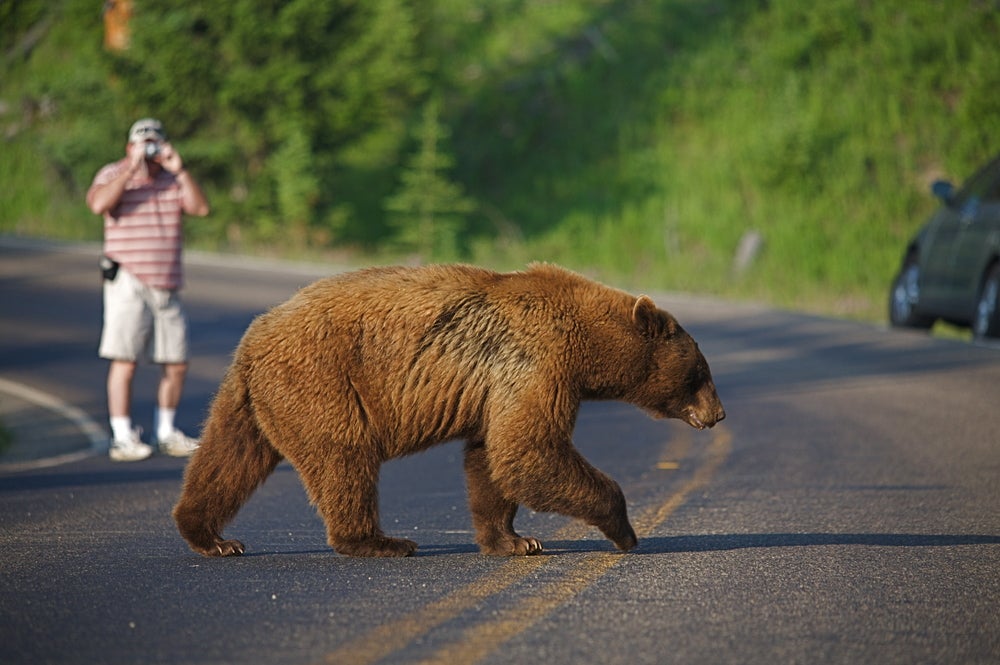
There was one first-time camping question flashing in my head with neon colored lights: what about bears? Well, if you’re in bear country, they’re out there. Make noise when you hike so that you don’t take one by surprise, but don’t whistle or scream. Never leave food out and seal up all your belongings before going to sleep. Visit the Get Bear Smart Safety Society for more tips. The more you know about bear safety, the safer you’ll feel on your first time camping in bear country.
“Bears like entering tents during thunderstorms.” —The Dyrt camper Evelyn J.
“You can relax and sleep well despite being in bear country.” —The Dyrt camper Dalia G.
“If you’re not in bear country and you want to leave your cooler out, ratchet straps are good to keep out smaller creatures.” —The Dyrt camper Sarah H.
Curious about anything and everything camping? Join the conversation in the Facebook Campfire .
Related Campground:
- Bayfield WI Camping , Bayfield, WI
Popular Articles:
- Get the Latest 2023 Camping Travel Trends
- How To Find Free Camping in National Forests
- The Checklist Every First Time RVer Needs
- Find Free Camping With The Dyrt Map Layers
- The Ulimate Boondocking Guide To Free Camping
- Everything You Need To Know About Wifi For Your RV
- 7 of The Best Overland Routes in North America
- 14 Wilderness Survival Tools You Should Have in The Backcountry
- Here's What To Add To Your Primitive Camping Checklist
Marina Nazario
Marina is a freelance travel writer who loves outdoor adventures. On her most recent trip, she rented a van and drove it down the coast of Chile. You can follow her adventures around the world on her <a href="https://www.marinasmilestones.com/">blog</a>.
More Articles
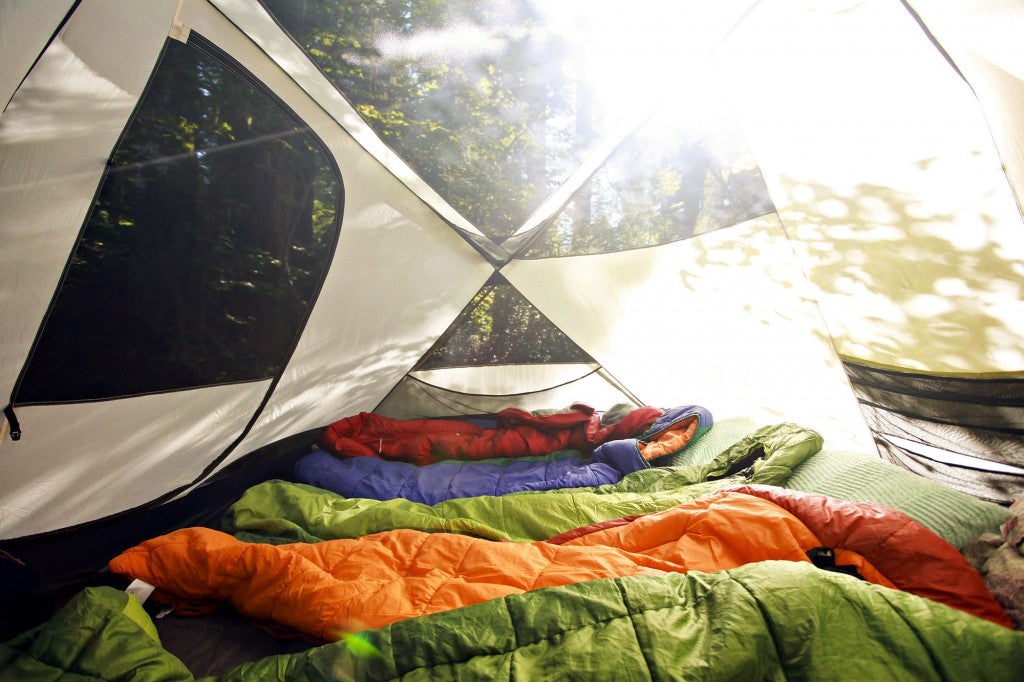
The Best Sleeping Bags For Every Camping Style
My dad heard good things about his sleeping bag before he purchased it, but I heard none of those good things from him during our…
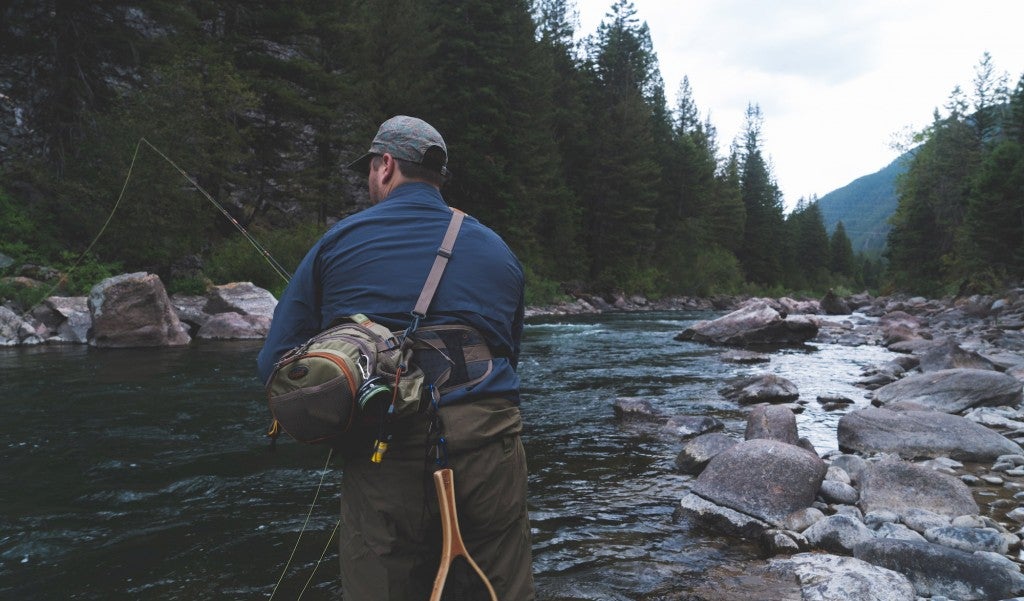
Washington Fly Fishing Is the Peaceful Outdoor Getaway You Need
This article on Washington fly fishing is brought to you by AfterShokz. AfterShokz’ wireless headphones use bone-conduction technology, so you can stay safe and still…

23 fun & deep campfire conversation starters
Chatting around a campfire is often a magical experience. As the embers burn, you can hear the breeze whistling and the birds chirping between the trees, and you sit back and relax… (or drool if you’re …
Written by: Ian Chew, MHFA
Published on: 12/08/2022
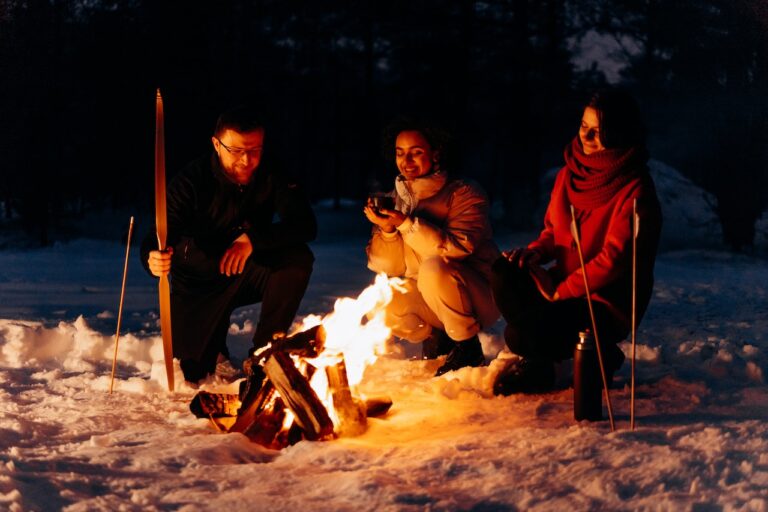
Table of Content
Chatting around a campfire is often a magical experience.
As the embers burn, you can hear the breeze whistling and the birds chirping between the trees, and you sit back and relax… (or drool if you’re waiting for your burnt marshmallow)
But how do you get people talking and laughing… vs. squirming in awkward silence?
Here’s a list of questions to help you spark conversations like sparking a fire:
Sharing camping stories
- When did you first go camping?
- When was the last time you went camping?
- Have you ever camped at [specific location]?
- Have you ever camped when it’s cold/raining?
Deeper questions
- What’s your favorite part of camping? Why?
- What’s your favorite weather to camp in?
- What’s your favorite food to eat when camping?
- What’s your most memorable camping trip?
- What’s your funniest camping moment?
- What’s your scariest camping moment? (Ask this if you aren’t scared of horror stuff like me)
Trading camping ideas
- What’s your #1 camping tip? // What’s the most helpful camping tip in your opinion?
- If you could only bring three things with you when camping, what would you bring?
- What’s the most important/underrated/overrated thing to bring when camping?
- You’re out camping and you realized that you didn’t bring <important camping gear>, what would you do?
- What’s your favorite camping spot?
- If you could go camping anywhere in the world, where would you go?
Exchanging camping opinions
- Why don’t more people camp?
- Camping or glamping?
- Is glamping camping? Why or why not?
- How would you prevent litter by campers?
- Would you ever camp in the winter? Why or why not?
- Would you ever camp if there are bears nearby? Why or why not?
- If you could create a rule that all campers had to follow, what would it be?
Related articles
- 118 fun & deep road trip questions for family, friends, couples
- 47 dreams conversation starters for adults and kids
- 25 useful phrases to keep a conversation going (and avoid awkward silence)
About Ian Chew, MHFA
16 easy ways to start a conversation with your neighbor (without being awkward)
19 fun & deep birthday party conversation starters.
20 Essential Camping Questions
Nov 10, 2022 by Mark Wilcox
If you click and purchase with one of our links, we earn a commission. Thanks.
Can You Use A Camping Tent At The Beach
Yes. When planning a camping trip, it’s important to research the rules and regulations of the area where you’ll be staying. Some campsites have strict rules about where you can set up your tent, and others may not allow camping at all. In addition, some beaches have regulations about overnight camping, so be sure to check before you pack your tent. If you’re planning to camp on a beach that allows it, there are a few things to keep in mind. First, choose a spot that is well above the high tide line to avoid being caught in a rising tide. Second, make sure to stake your tent down securely, as strong winds can easily blow it away. And finally, remember to pack out all of your trash when you leave so that everyone can enjoy the beach for years to come.
Do You Need A 4 Season Tent For Winter Camping
No. Unless you are planning to camp in a blizzard or extreme weather conditions, you do not need a 4-season tent. These tents are designed for use in harsh conditions and are usually much heavier and more expensive than 3-season tents. If conditions are expected to be harsh enough to justify a 4-season tent, you should stay home.
Can You Use A Camping Stove Inside A Tent
No. Camping stoves are only meant to be used outside of a tent. Otherwise, you run the risk of carbon monoxide poisoning and a fire. We wrote a full article about using camping stoves indoors here. The exception is if you purchase a hot tent. This is a tent that is explicitly built for winter conditions with a chimney. If you follow the instructions on how to use a stove (often wood burning) with this type of tent then you can use a stove in a tent.
Are Tent Heaters Safe For Tent Camping
Yes, as long as you use a heater explicitly built for heating a tent and you follow the instructions. If it’s a propane-powered tent heater , you should also invest in a portable carbon monoxide alarm as insurance.
Do You Lock Your Tent When Camping
No, if you are worried about thieves because you should keep your valuables locked in your vehicle. A tent lock isn’t going to stop a determined thief because 2 inches of material is easily torn with a knife. No, if you are worried about wildlife. Keep food out of your tent. Because if food is in the tent, animals will just chew their way through the tent. I’ve had a friend who was woken up when he forgot he had a candy bar in his backpack. And a raccoon had eaten a hole in his tent. Or in the summer of 2022, a naive camper kept their bags which had been full of blueberries during the day in their tent in grizzly territory. A grizzly bear collapsed the tent, trying to get to the berries. Unfortunately, the camper was in the tent, and they were killed. The bear didn’t want the camper, it wanted the berries. And the camper was in the way. Yes, if you are a woman and want an extra level of security when camping alone at a campground. While camping is generally safe from traditional crime, after dark and people have been drinking, that’s when crimes of opportunities can arise.
Do You Leave Your Tent When Camping
Yes. You will leave your tent to go for a hike, fishing, or even go into town to get something to eat. Always make sure to take anything valuable with you. Either hang your trash bag or throw it into the campsite trash storage container. Make sure all food is stored properly. Otherwise, your campsite should be perfectly safe to leave it in place.
Do You Need A Special Tent For Winter Camping
Not if you are only camping for recreation. A 3-season tent is sufficient for recreational campers. If you have a reason to camp in heavy snow or strong winds then you should invest in a 4-season tent. Otherwise, you should just stay home if you are expecting severe winter weather.
Can I Use A Camping Tent As A Greenhouse
No, because they don’t allow enough light in. Greenhouses must allow sunlight in while trapping heat. You could use tent poles, and the bug net of a two-walled tent could be used to begin assembling a DIY greenhouse.
Can You Use Memory Foam Pad In Camping Tent
Yes. If you have the room in your home and vehicle for a tri-fold mattress, there’s no better way to sleep on a camping trip. I have even seen people bring portable bed frames and put it up for a camping trip. That would be a lot of work for an overnight trip, but if you were camping for a week or more, then it would be worth it.
Will Camping On Concrete Put A Hole In Your Tent
No. Concrete is less likely to put a hole in your tent. Rocks and sticks are much more likely to put a hole in your tent. Then again, it’s not very rustic or as fun to camp on concrete.
Do You Need A Tent For Camping At Joshua Tree
Yes. You should always have a tent or a shelter on any camping trip. First, it can always rain, even in the desert. Second, tents and tarps are used to block the wind which is important to keeping your warm. Third, even if you are not worried about mosquitoes, you might be worried about spiders, scorpions, and snakes. And you might want privacy when getting dressed or while you sleep.
Do You Carry A Box Fan Tent Camping
Yes. Rather, my friends bring box fans when tent camping and we have access to electricity. I have a swamp cooler for when I’m sitting outside of my tent. And I will use an umbrella too. When I’m sleeping in my tent, I have a small portable fan that I connect to my Jackery.
Can You Backpack With A "Camping Tent"
Yes though you won’t want to go on a long camping trip. A traditional camping tent is going to be very heavy and won’t pack down very small. Backpacking tents are designed to pack small and are lightweight. I personally now carry only a tarp and a bug headnet.
Do I Need To Air Out My Tent Before Camping
No. You don’t need to air out the tent because it will air out at the campsite. But you should test the waterproofing of the tent if it’s been in storage for several months before going camping.
Are There Wild Places To Go Tent Camping
Yes. In the US, there are still millions of acres of wild places to go camping. We have hundreds of state and national parks. Most have primitive campsites which in the UK are called “wild” camping. We also have national forests, national grasslands, and BLM land. You can also find wild places to camp via websites like Hipcamp.
Can You Cover A Camping Tent With Tarp
Yes. I will do this if I’m expecting heavy rain. There are two reasons for this. First, even with a rainfly, given enough rain, your rainfly will fail. Thus the tarp adds more protection to your tent. Second, having a tarp over your tent will allow you to create a covered area so you can sit outside the tent in the rain. Third, in cold weather, a tarp can add more insulation.
Can A Camping Tent Be Set Up Inside Your House Or Apartment
Yes but there’s not any benefit to do so. Even if you lose power in the middle of winter. Your tent is not going to keep you any warmer by getting inside of it. However, your sleeping bags and camping clothes can be used to keep you warm. And your camping stove can be used to prepare meals if required.
Do You Need A Tent To Go Camping
No. Many people enjoy hammock camping. If you use a hammock, you don’t need a tent. I prefer to use a tarp even if I”m car camping. I sleep on a cot because I camp in locations without many trees.
When Kayak Camping Do You Put Your Tent Poles In A Dry Bag
You can because it will make it easier to keep everything together. Kayaks don’t have as much room as canoes. Thus it will become a balancing act. This is why many kayak campers prefer hammocks.
Are Sleeping Bags Necessary When Tent Camping
No. You can use blankets. Wool blankets are historically accurate if you wish to replicate what it was like to camp before sleeping bags. While wool isn’t always the softest, it is warm and stays warm if it’s wet. Though if your wool blanket gets soaked, I would expect you to head home unless you were stuck.
I personally use a fleece blanket and then wrap myself in a wool blanket on top. I wear a fleece hoodie to sleep because I’m tall and it’s almost impossible for me to find a mummy sleeping bag that fits me anyway.
Life Simile
Lifestyle Blog - Live Better
A Guide to a Camping Trip: 23 Questions to Ask Yourself
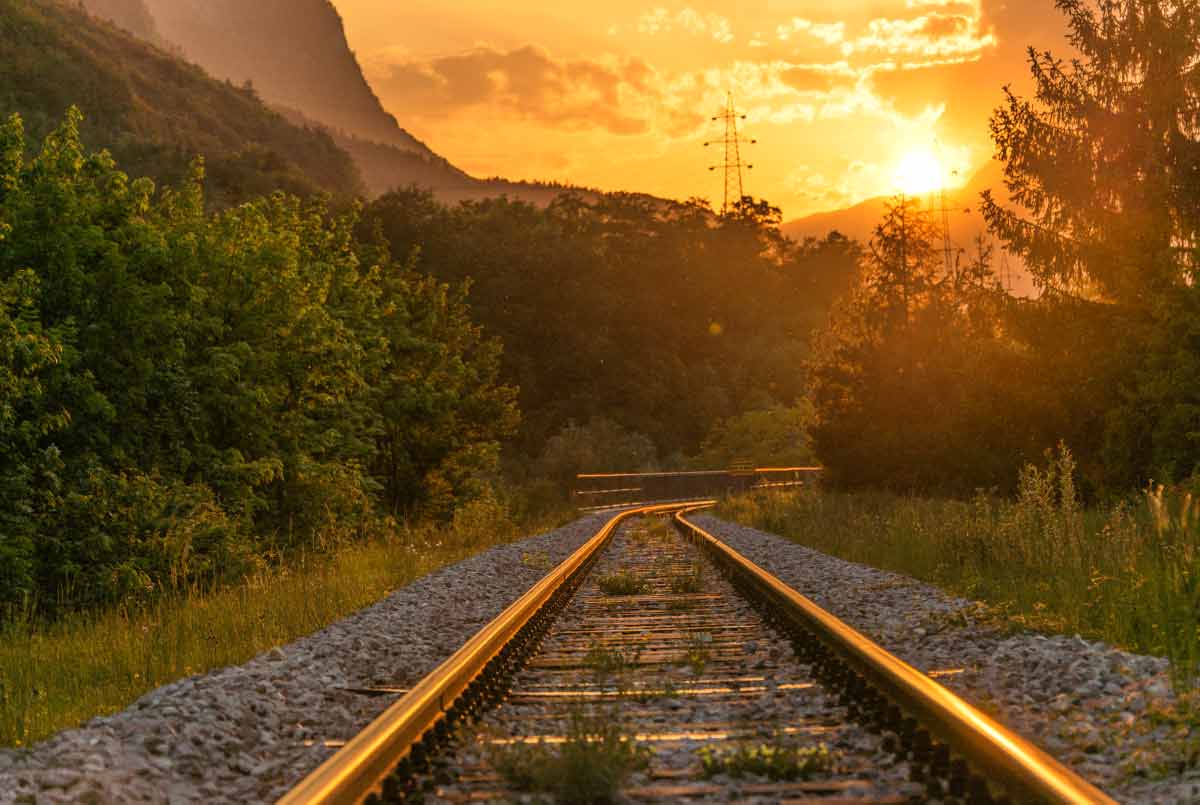
On your first planning, you must be required guide to on a camping trip. Camping is an enriching experience that offers a multitude of benefits. By understanding its fundamentals, embracing its challenges, and respecting nature, you can embark on memorable camping adventures that leave you with a profound appreciation for the great outdoors. So, whether you’re a seasoned camper or a beginner, pack your gear, follow the rules, and get ready to create lasting memories in the heart of nature. Happy camping!
A Guide to on a Camping Trip: 23 Questions to Ask Yourself
Q1: what do you need to know for camping.
A1: Camping requires some fundamental knowledge. Understanding the basics ensures a safer and more enjoyable trip. To begin with, it’s essential to know the types of camping, such as car camping, backpacking, or RV camping, and decide which suits your preferences. You should also be familiar with the camping gear checklist, which typically includes a tent, sleeping bag, cooking equipment, and clothing suitable for the weather. Knowing how to set up a campsite, build a fire, and cook outdoors are practical skills that will enhance your camping experience.
Camping accessories
Q2: What is the most important thing for camping?
A2: The most critical aspect of camping is preparation. Adequate planning guarantees you have the right gear, food, and knowledge to stay safe and comfortable. Start by researching your destination to understand the weather, terrain, and any potential hazards. Make a checklist of the items you need, ensuring they are in good condition. Weather-appropriate clothing, sufficient food and water, a first-aid kit, and navigation tools are among the essentials. Additionally, inform someone about your camping plans and expected return date as a safety precaution.
Q3: What makes a good camping trip?
A3: A successful camping trip often includes a few key elements: beautiful scenery, the right equipment, and good company. A picturesque location can turn an ordinary trip into an extraordinary adventure. Sports Apparel & Accessories·Sports, Exercise Equipment·Outdoors & Recreation·Accessories & Services . Consider camping near a lake, in a forest, or atop a mountain for breathtaking views. Your choice of gear should cater to your needs and the environment, ensuring comfort and safety. Finally, sharing the experience with friends or family can enhance the enjoyment of your camping journey, creating lasting memories.
Q4: What camping etiquette is the most to consider?
A4: To preserve the environment and ensure everyone’s enjoyment, there are essential camping etiquette rules to follow. These include respecting nature by not littering, staying on designated trails, and leaving no trace of your presence. Keep noise levels to a minimum to avoid disturbing wildlife and fellow campers. Proper waste disposal is crucial, so use established facilities or follow the principles of “pack it in, pack it out” for trash and human waste. Following these etiquette guidelines helps maintain the beauty of camping destinations for future generations.
Q5: What is the purpose of camping?
A5: Camping serves various purposes, making it a versatile outdoor activity. For some, it’s an opportunity to connect with nature, escape the noise of urban life, and find solitude in serene surroundings. Others view camping as a way to bond with family and friends, strengthening relationships around a campfire. Camping can also be an adventure, offering challenges like hiking and survival skills. Ultimately, the purpose of camping is subjective, and it can fulfill different needs of different people.
Q6: What are the do’s and don’ts of camping?
A6: While camping, it’s important to know the do’s and don’ts. Do respect wildlife and fellow campers by observing from a distance and keeping noise levels down. Do familiarize yourself with the camping regulations of your chosen location and follow them. Don’t litter or disturb the environment; instead, leave it as you found it. Don’t cut down live trees or damage vegetation. Don’t feed wild animals, as it disrupts their natural behavior and can be dangerous. Following these guidelines ensures a harmonious camping experience.
Q7: What is the rule #1 of camping?
A7: Rule number one of camping is safety first. Always prioritize your well-being and the safety of those with you. This includes knowing basic first aid and being prepared for emergencies. Ensure you have adequate supplies, such as a first-aid kit, flashlight, and extra food and water. Familiarize yourself with the local wildlife and potential hazards, and take precautions accordingly. It’s also essential to inform someone about your camping plans, including your destination and expected return date, in case of unforeseen circumstances.
Q8: How can I be comfortable while camping?
A8: To be comfortable while camping, choose the right gear and clothing for the weather. Ensure you have a comfortable sleeping setup, such as a quality sleeping bag and pad. Dress in layers to regulate your body temperature, and bring rain gear in case of wet conditions. Don’t forget essentials like insect repellent and sunscreen. Additionally, maintain personal hygiene by washing your hands and body regularly, even in the outdoors. Staying clean and dry goes a long way in ensuring your comfort during camping trips.
Q9: What are the 10 disadvantages of camping?
A9: While camping is a delightful experience, there are some disadvantages to consider. These may include adverse weather conditions, such as rain or extreme heat, which can affect your comfort. Insects and wildlife encounters, while often exciting, can pose challenges. Camping also means being without modern conveniences, such as electricity and plumbing, which may require adjustment. Additionally, the lack of comfortable beds and amenities can affect your sleep quality. Remote camping locations may have limited access to emergency services, and you may encounter noisy or inconsiderate neighbors.
Q10: What is the risk while camping?
A10: Camping, like any outdoor activity, carries inherent risks. Some common risks include wildlife encounters, injuries from activities like hiking or cooking, and unpredictable weather changes. In remote areas, there may be limited access to medical assistance. To minimize these risks, it’s crucial to be prepared, follow safety guidelines, and inform someone about your camping plans. Carrying essential safety equipment, such as a first-aid kit and navigation tools, is also advisable.
Q11: Is camping environmentally friendly?
A11: Camping can be environmentally friendly if done responsibly. Using biodegradable products, minimizing waste, and adhering to Leave No Trace principles all contribute to reducing your impact on nature. Choosing established campsites and following campfire regulations also help protect fragile ecosystems. Responsible camping ensures that natural areas remain pristine and accessible for future generations to enjoy.
Q12: Why is camping peaceful?
A12: Camping is known for its tranquility. Spending time in nature, away from the noise and distractions of daily life, can provide a sense of peace and rejuvenation. The sounds of rustling leaves, flowing water, and chirping birds create a calming ambiance that promotes relaxation. Whether you’re sitting by a campfire or stargazing in the wilderness, the serenity of camping offers a peaceful escape from the hectic pace of modern life. Sports Apparel & Accessories·Sports, Exercise Equipment·Outdoors & Recreation·Accessories & Services .
Q13: What camping can teach us?
A13: Camping can teach valuable life skills, including problem-solving, self-reliance, and resourcefulness. It also fosters an appreciation for nature and simplicity. Learning to adapt to changing weather, navigate unfamiliar terrain, and cook outdoors can enhance your practical abilities. Moreover, camping encourages mindfulness and a deeper connection with the natural world, imparting important lessons about conservation and environmental stewardship.

Q14: Why is camping a hobby?
A14: For many, camping isn’t just an activity; it’s a beloved hobby. The thrill of exploring new places, mastering outdoor skills, and connecting with like-minded individuals makes it a cherished pastime. Camping enthusiasts often find joy in planning trips, researching destinations, and acquiring specialized gear. The sense of adventure, the satisfaction of self-sufficiency, and the camaraderie of the camping community all contribute to making camping a fulfilling and enduring hobby.
Q15: What is beautiful about camping?
A15: The beauty of camping lies in its simplicity. It allows you to disconnect from technology, savor the beauty of the natural world, and appreciate the small wonders of life. Whether you’re watching a sunrise from your tent, roasting marshmallows over a campfire, or gazing at the stars in a dark night sky, camping offers moments of profound beauty that remind us of the splendor of the natural world.
Q16: Why is camping romantic?
A16: Camping often brings out the romantic in people. Sharing a campfire under the stars, cozying up in a tent, and creating lasting memories with a loved one can be incredibly romantic. The intimate setting of a campsite, away from the distractions of everyday life, fosters a sense of closeness and connection. Whether it’s a romantic getaway for two or a family camping trip, the simplicity and serenity of camping can kindle feelings of love and affection.
Q17: How does camping make you happy?
A17: Camping has a unique way of bringing happiness . The sense of freedom, the beauty of nature, and the adventure of the unknown all contribute to the joy of camping. Being surrounded by natural beauty, breathing in fresh air, and engaging in outdoor activities release endorphins that boost your mood. Additionally, the escape from the stresses of daily life and the opportunity to unplug and unwind contribute to a profound sense of happiness and contentment.
Q18: What’s the most prevalent form of camping?
A18: Tent camping reigns supreme as the most prevalent and accessible form of camping. It entails erecting a portable shelter, typically a tent, in a designated campground or a secluded natural setting. Tent camping beautifully merges creature comforts like sleeping bags and camp stoves with an intimate connection to the surrounding environment. This renders it an ideal choice for beginners and seasoned outdoors enthusiasts alike.
However, the world of camping spans a spectrum of variations, including RV camping, backpacking, car camping, and the luxurious world of glamping, catering to a diverse array of preferences and skill levels. Whether you prefer the simplicity of a tent or the convenience of an RV, camping offers you a chance to commune with nature and create lasting memories.
Q19: What is the essence of camping?
A19: Camping, a beloved outdoor pursuit, is all about immersing yourself in the natural world. It’s a journey into the untamed, a rendezvous with nature’s bounty. Picture a scenario where the sky transforms into your roof, and the earth is your rustic, yet welcoming, mattress. It’s not just about sleeping under the stars; it’s about disconnecting from the hustle and bustle of daily life and reconnecting with the ancient rhythms of the earth.
Q20: How does camping nurture the soul?
A20: The soul craves serenity, and camping bestows it in abundance. As you set up camp amidst nature’s tranquility, you provide profound solace for your soul. It’s a chance to cast off the turmoil of everyday life and embrace the curative influence of the wilderness. Your soul delights in the chorus of birdsong, the rustle of leaves, and the captivating ballet of campfire flames. This communion with the natural world has a rejuvenating effect, calming your mind and rekindling your spirit. It reminds you that you are a part of something grander, something timeless.
Free and Paid TRAVEL Resources You May Explore
Q21: Why is it referred to as “camping”?
A21: The word “camping” finds its linguistic roots in the Latin term “campus,” signifying an open field or plain. Across centuries, its meaning has evolved into the contemporary concept we know today – the act of temporarily dwelling outdoors. This practice boasts deep historical and cultural roots, transcending generations and civilizations. Camping is a tradition that has been passed down through the ages, from early nomadic societies to modern-day adventurers.
Q22: Is camping merely a worthwhile endeavor?
A22: No, camping isn’t just worthwhile; it’s an extraordinary adventure. It’s a sojourn for your heart and spirit, a quest for self-discovery, and a brief respite from the frenetic pace of modern living. It encourages you to leave the comforting embrace of home and lose yourself in the unadulterated splendor of nature. Amidst the murmur of leaves and the babble of brooks, you’ll rediscover life’s modest pleasures. The therapeutic effects of nature are well-documented, and camping offers you a front-row seat to this natural healing process.
Q23: What skills does camping encompass?
A23: Camping skills encompass a diverse array of proficiencies required to thrive in the great outdoors. They encompass the art of creating a campsite, crafting and maintaining a fire, preparing meals using portable equipment, navigating uncharted terrains, administering rudimentary first aid, and mastering the art of wilderness survival. These skills aren’t merely crucial for safety; they also elevate the overall camping experience. Sports Apparel & Accessories·Sports, Exercise Equipment·Outdoors & Recreation·Accessories & Services . When you can confidently pitch a tent, build a roaring campfire, and cook a delicious meal over an open flame, you not only ensure your well-being but also enhance your sense of accomplishment in the wilderness.
Leave a Reply Cancel reply
Your email address will not be published. Required fields are marked *
Save my name, email, and website in this browser for the next time I comment.
The most commonly asked questions asked by camping guests
- By Lindsay Stroud
- 1st March 2023

Your campsite or caravan park is where guests come to make memories, escape the hustle and bustle of urban life, and unwind. Help your guests to relax from the moment they book with you to long after their departure, by getting acquainted with your campers’ and caravanners’ frequently asked questions. And answering them upfront!
In familiarising yourself with guests’ questions – especially before they think to ask them – you’re helping campers ease into their time with you. Your knowledge of not only your setting but your local area, creates trust between host and guest, and adds to the overall guest experience.
Today we’ll cover why it’s helpful to acquaint yourself with commonly asked camping questions, as well as provide helpful tips for uncovering yours. We’ve also included a number of questions you might expect to receive from visitors at varying stages of their stay, to help inspire your own ideas.
Table of Contents
Why familiarise yourself with your camping guests’ frequently asked questions?
Camper faqs to answer in advance, how do i uncover my guests’ faqs.
So, what’s so important about getting to know your guests’ commonly asked questions, anyway?
“ Can’t I field them as they trickle in? ” we hear you pondering.
By all means, you can approach your campers’ questions by taking this route. However, we’re more than positive you’d love to have a spare moment or three in your day when you’re not addressing questions that could otherwise be answered for you and that time spent running your camping or caravan park.
Let’s dive into a few more reasons why it can be beneficial to get to know your guests’ FAQs. Above all, it’s about creating a stellar guest experience and positioning yourself as a caring, informative and intuitive host!
1. Everyone loves a mind reader
After a while of familiarising yourself with your caravanners’ frequently asked questions, you can start to pick up on patterns of said questions from your guests. Figuring out which questions are being asked most often and thereby supplying an answer ahead of time, could save your guest from having to ask it in the first place.
If you’re able to answer your campers’ questions before they think to ask, you’ll truly wow them, not only for your seemingly mind-reading capabilities but also in positioning yourself as an all-star caravan park manager before they’ve even arrived – win-win for all parties involved!
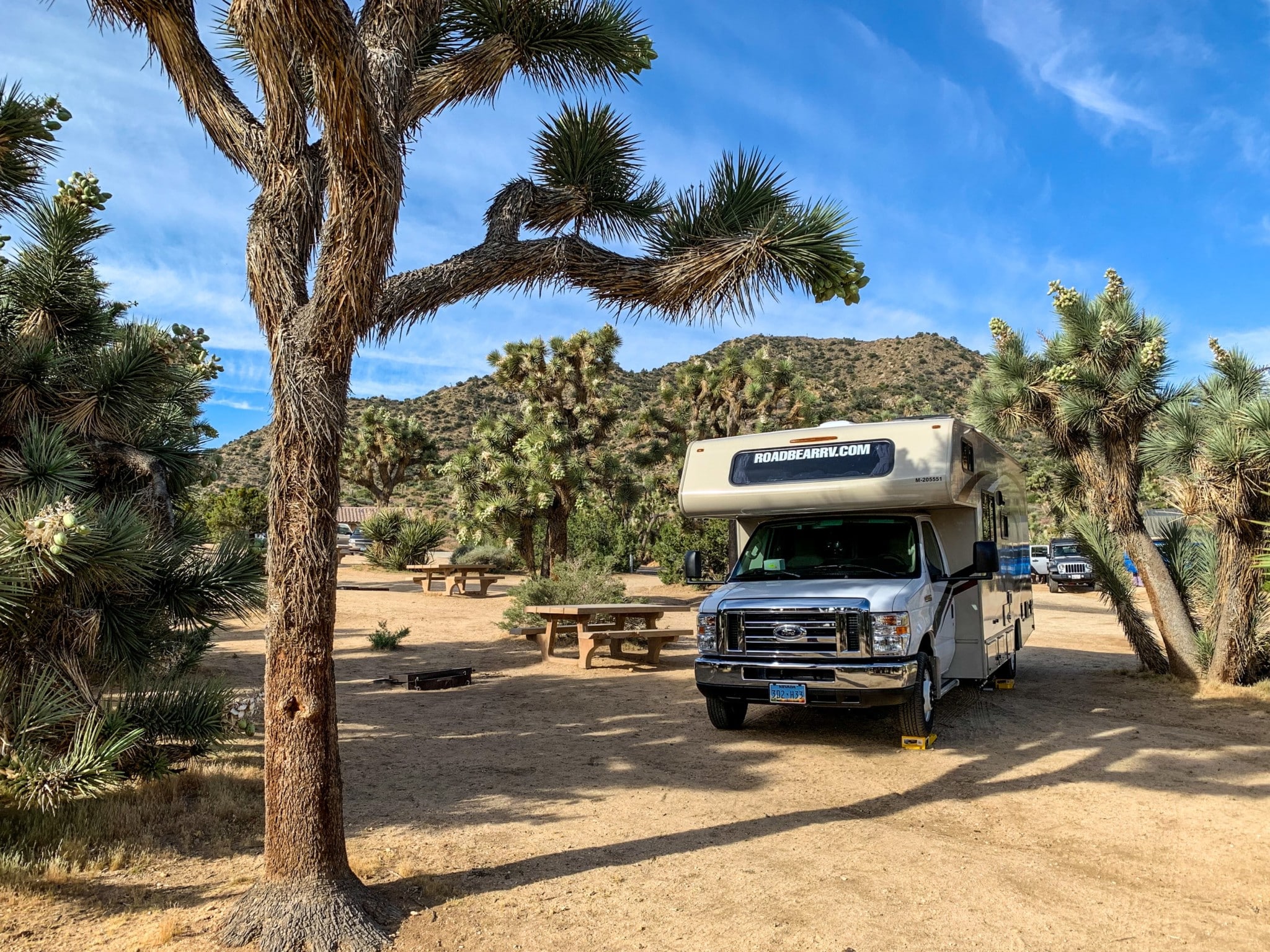

2. It saves your guests time they don’t have
Nothing bursts a guests’ trip planning bubble like not having all of the information about where they’re going readily available at their fingertips.
Save your guests from having to go down Internet dead-ends and email rabbit holes, by supplying all essential information up front.
From what’s included as part of their stay to knowing what to pack, what sort of hiking trails are nearby to what sort of kayak or e-bike rentals you provide – provide this information ahead of time.
Not only does it get your guests excited again about planning their vacation – it also returns valuable time to you to run your business. Spending a quarter of your operational hours answering guest questions is time that could be spent focusing on other tasks – like…
- uncovering your guest avatar
- training your staff to speak in your campsite’s brand voice
- researching key upsells to increase your bottom line
3. It positions you as the knowledge expert for your area
Answering your campers’ frequently asked questions doesn’t have to be limited to your site – it can extend to supplying insight about nearby places, diving into all of the wonderful sites and attractions your region has to offer!
Addressing upfront elements like tour packages or local points of interest, even including that walking trail only locals know about, demonstrates your thoughtfulness and knowledge. Supplying this sort of information makes your guests feel extra special while planning their trip and upon arrival to your caravan park, knowing they won’t find it on any Top 10 TripAdvisor list.
You don’t have to do this manually or on a guest-by-guest basis. Scheduled, proactive communications are very much your friends!
While this won’t be an extensive list of commonly asked questions ( otherwise, this article would turn into a novel! ), we’ll actively surface some camper frequently asked questions that might pop up for you while uncovering your own consistent guest questions.
Feel free to use these questions as a guide – hopefully they’ll spark your own questions to answer as part of the guest experience. Or even include an FAQ category in your Touch Stay guidebook with a topic for each type of FAQ.
Booking FAQs
These sorts of questions might pop up at the time your guests are looking to book with you either via your direct booking site or your OTA listing. Easy to find and easy to understand answers could transform them from potential guests into bona fide guests of your campsite!
- What is your cancellation policy?
- How can we contact you if we have questions regarding our upcoming stay?
- Are children permitted?
- Is your property pet-friendly?
- Is your property accessibility friendly?
Campsite and caravan park FAQs – Check-In
Create a smooth, effortless check-in experience for guests by supplying all they need to know ahead of arrival. Feel free to include information pertaining to extenuating circumstances too, in the event guests arrive later than expected or what you do in the event of an after hours check-in.
- What time is check-in?
- What happens if I arrive after hours?
- Is early check-in available?
- When will my pitch or plot be ready?
- Upon arrival, where should we go?
- Do the gates to the caravan park or campsite have hours or operation (i.e. do they close and open at certain points?).
- Are there quiet times for your campsite or caravan park?
Parkland Camping & Touring provides their guests a quaint reminder in the check-in section of their digital guidebook about where to access handy driving directions.
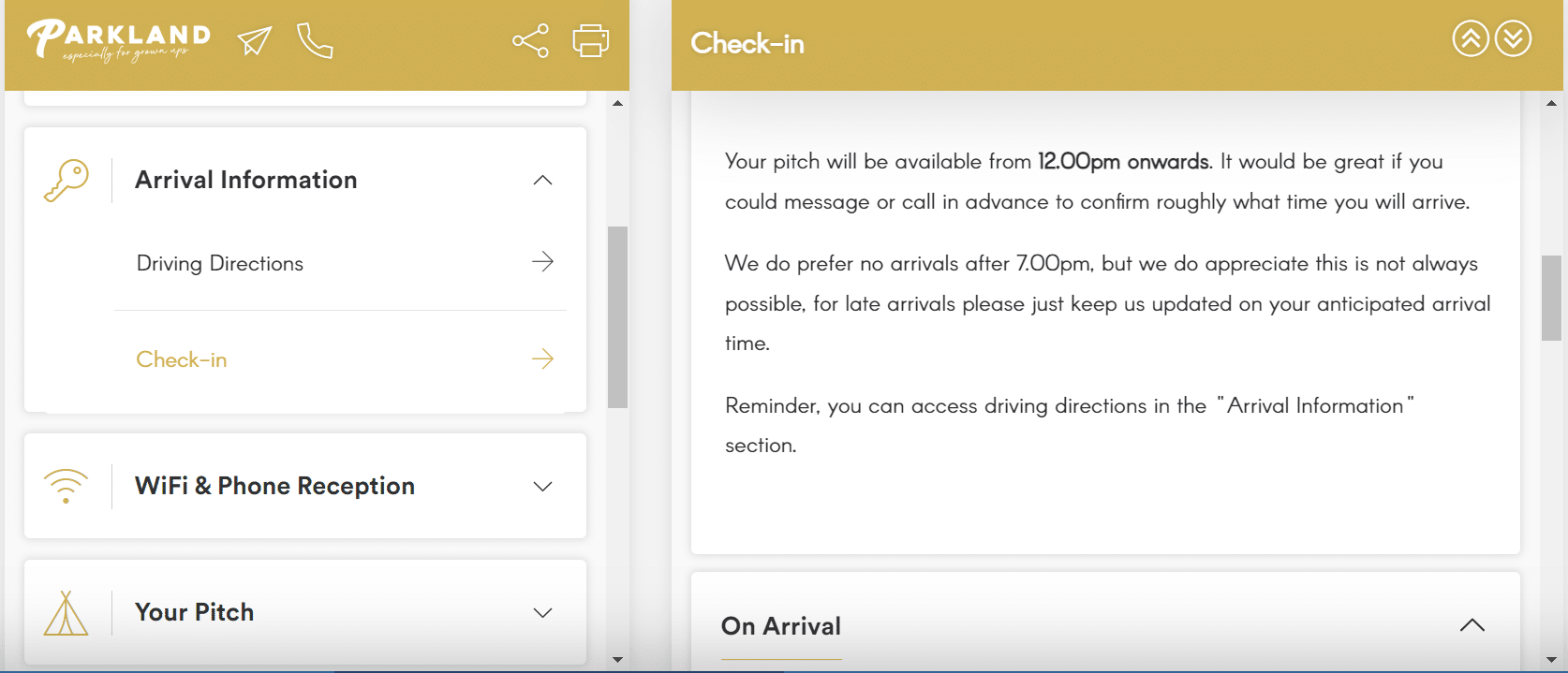
Directions and access FAQs
Consider addressing these transportation based questions for guests wondering what travel options are available for getting to your campsite. You can also thread these questions when providing guests with things to do, like offering up directions to local attractions and sights.
- How far away are you from the nearest (blank)?
- What transportation options are available in the area?
- How far away is (insert specific attraction)?
- How do I get to your property?
- Directions from major towns or cities?
- How do I know if there’s any construction or roadwork?
Paperbark Camp provides a number of transportation methods to their campers within the Getting There section of their digital guidebook , including driving directions from major cities, as well as options for airport and train station transfers.
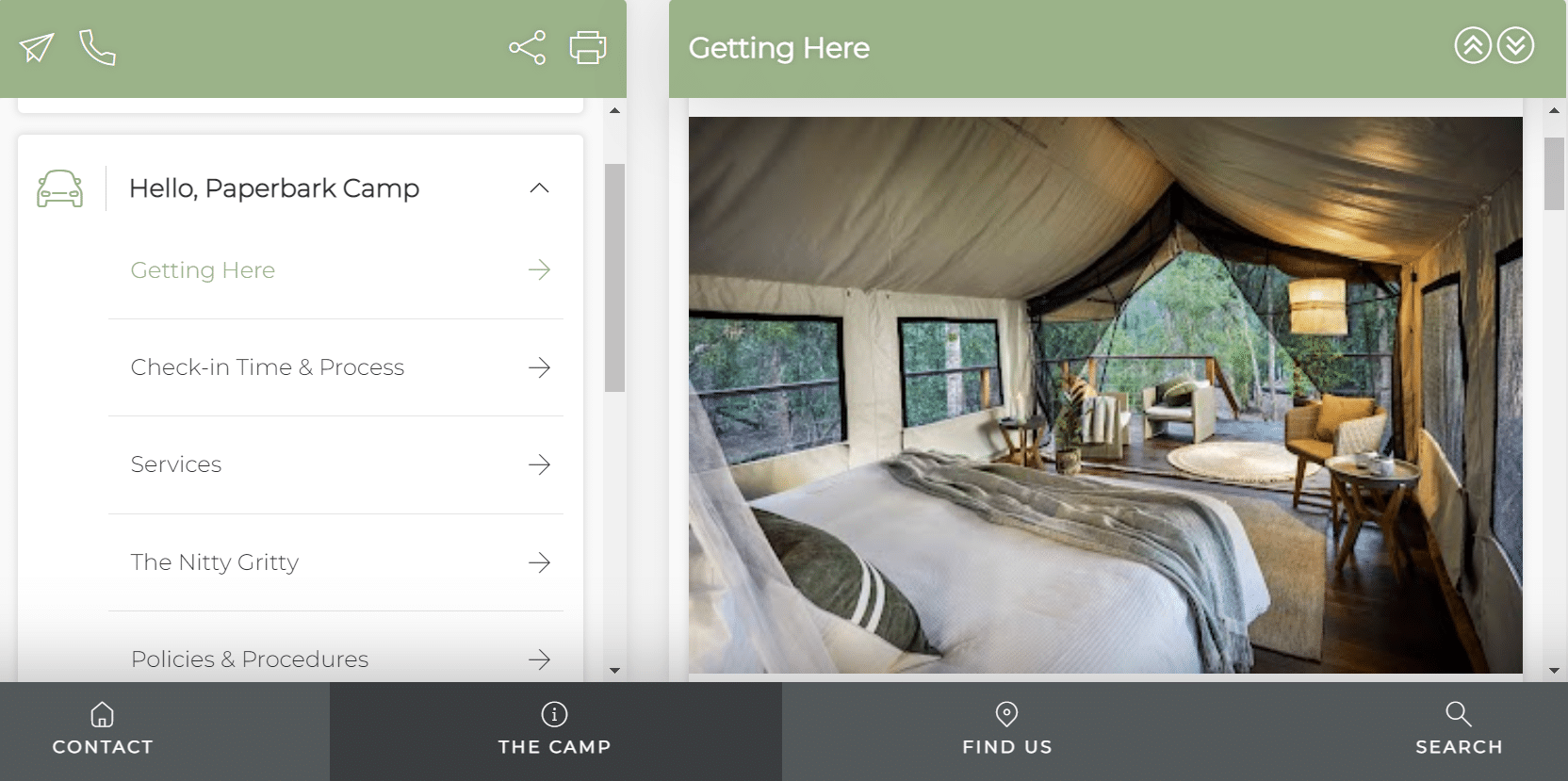
Campsite essentials FAQs
The list below contains required information – think the essentials your guests will need-to-know as part of staying with you in order to have a comfortable yet delightful time.
- What do I need to bring with me?
- What’s included as part of my stay via your onsite facilities?
- Are there bathroom facilities onsite?
- Are there laundry facilities onsite? (i.e. coin operated laundry or laundromat nearby?)
- Is smoking permitted on the property?
- What sort of security options are implemented for your property?
- Is there a map of your campsite/caravan park we can access?
- Is WiFi available?
- What is phone reception like on your property?
Plots & pitches FAQs
Give your guests the low down on your campsites’ plots of land, or your caravan park pitches before they think to ask. Guests will likely want to know how far away they can expect to be from fellow campers or caravanners, alongside key information for what’s included as per each pitch or plot.
- How big are your pitches/campsite plots?
- How widely spaced out are your pitches?
- How far apart is each pitch from our neighbours?
- What sort of power options are available for caravans/general electronics?
- What comes included with each pitch or campsite? (i.e. electric hook-up, drinking water tap, waste disposal, picnic bench)
- Our caravan has a flat tire/needs last-minute servicing – are there options available nearby for us to do that?
Nolton Cross Caravan Park supplies happy caravanners all the crucial details regarding their pitches on their accommodation page of their Touch Stay digital guidebook. For instance, pitches 1-5 are hard standing electric pitches (gravel and grass), with each pitch size approximately 7 metres wide and as much depth as needed.
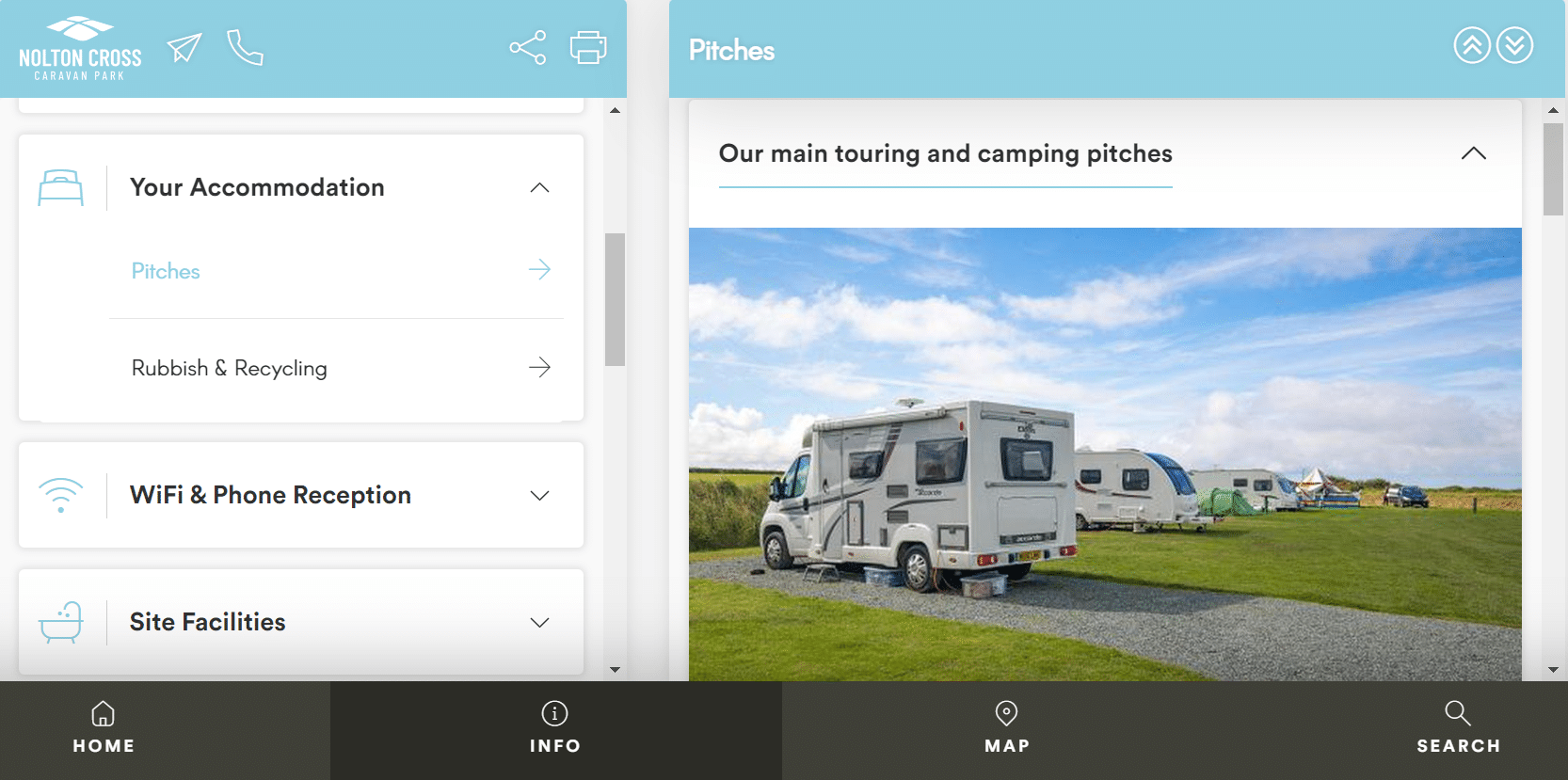
Campsite amenities FAQs
These questions have you covered for fielding guest questions related to groceries, equipment rentals and all those special touches that make camping a memorable experience for guests of all ages.
- Where is the nearest grocery store?
- Do you provide groceries onsite?
- Do you provide equipment rentals (i.e. kayaks, or bikes?)
- Do you have a general store where we can purchase ice, firewood and propane?
- What sort of kids activities are available? (i.e. sidewalk chalk, nature learning experiences, etc.)
- Are BBQs permitted? Do you have BBQs readily available?
- Do you allow day visitors?
- Do you have fire pits? Do you allow open fires?
- Where is the nearest ATM?
- Where can I rent kayaks or e-bikes?
For instance, Nolton Cross Caravan Park supplies campers with all the details regarding groceries within the Before You Leave Home section of their digital guidebook. They include information about their local farm shop, available farm fresh eggs (so long as the chickens are behaving!), as well as larger grocery retailers nearby, like Tesco.
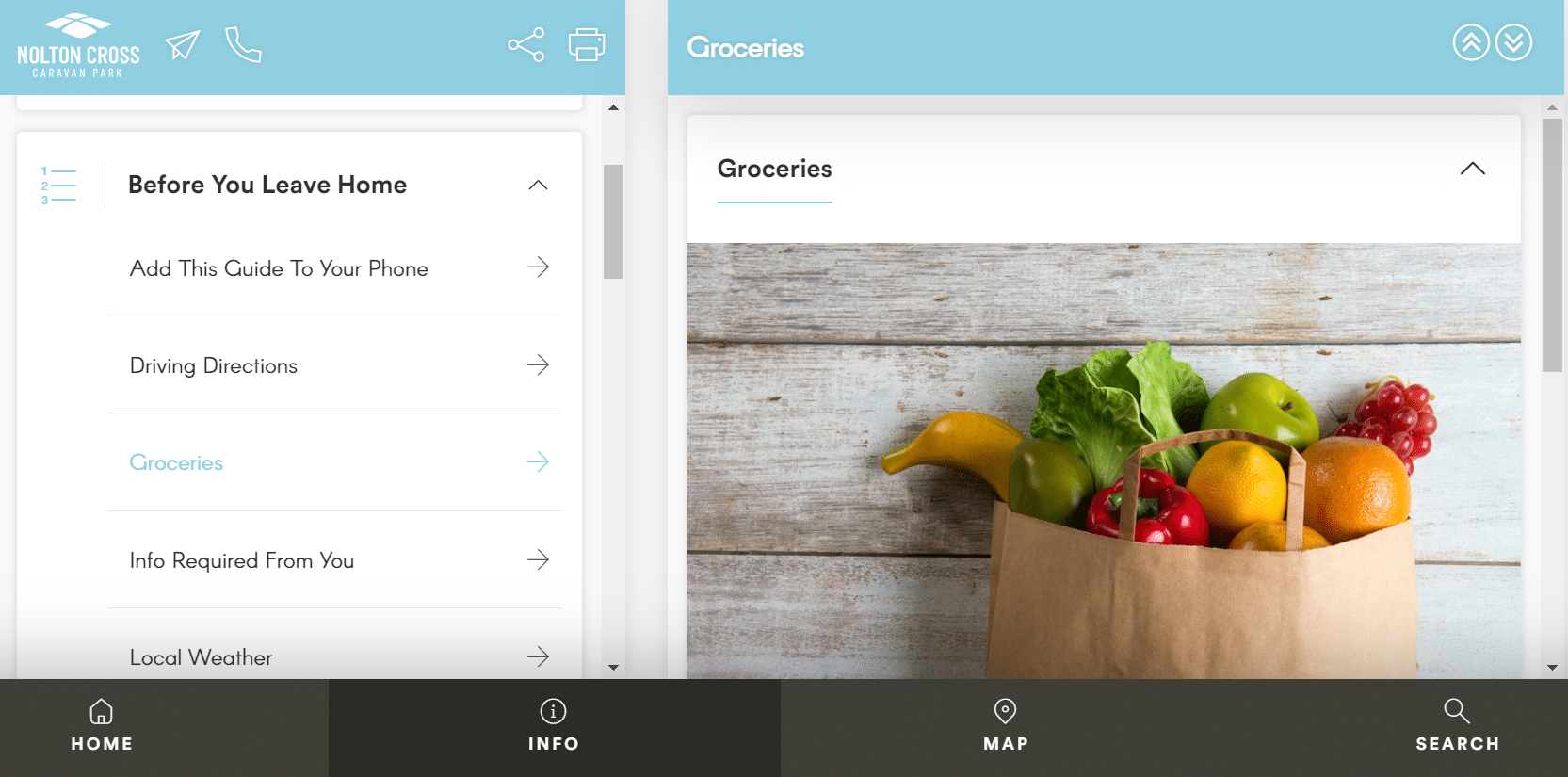
Attractions & sights FAQs
This is where you get to have a little fun, letting your know-how shine as well as all of the amazing activities available to your guests within your region.
Focus on recreational activities your guests will likely be aiming to take advantage of as part of their camping trip – think walks, hikes and water sports. This is in addition to answering questions that appeal to the more urban camper, like shopping and dining options.
- Where is the nearest tourism centre?
- What options are available for us to get around? (think walking, buses or car hires).
- What sort of walking trails are nearby?
- What sort of hiking trails are nearby?
- How far is the nearest beach?
- Where is the nearest shopping centre?
- Can you recommend the best watering holes for fishing?
- What lakes are nearby for canoeing or kayaking?
- What dining options are available onsite?
- Can you recommend a good restaurant for dine-in or takeaway?
- Where are the closest breweries?
- Can you book us an e-bike wine tasting tour of the local vineyards?
- Can you book dinner reservations for us?
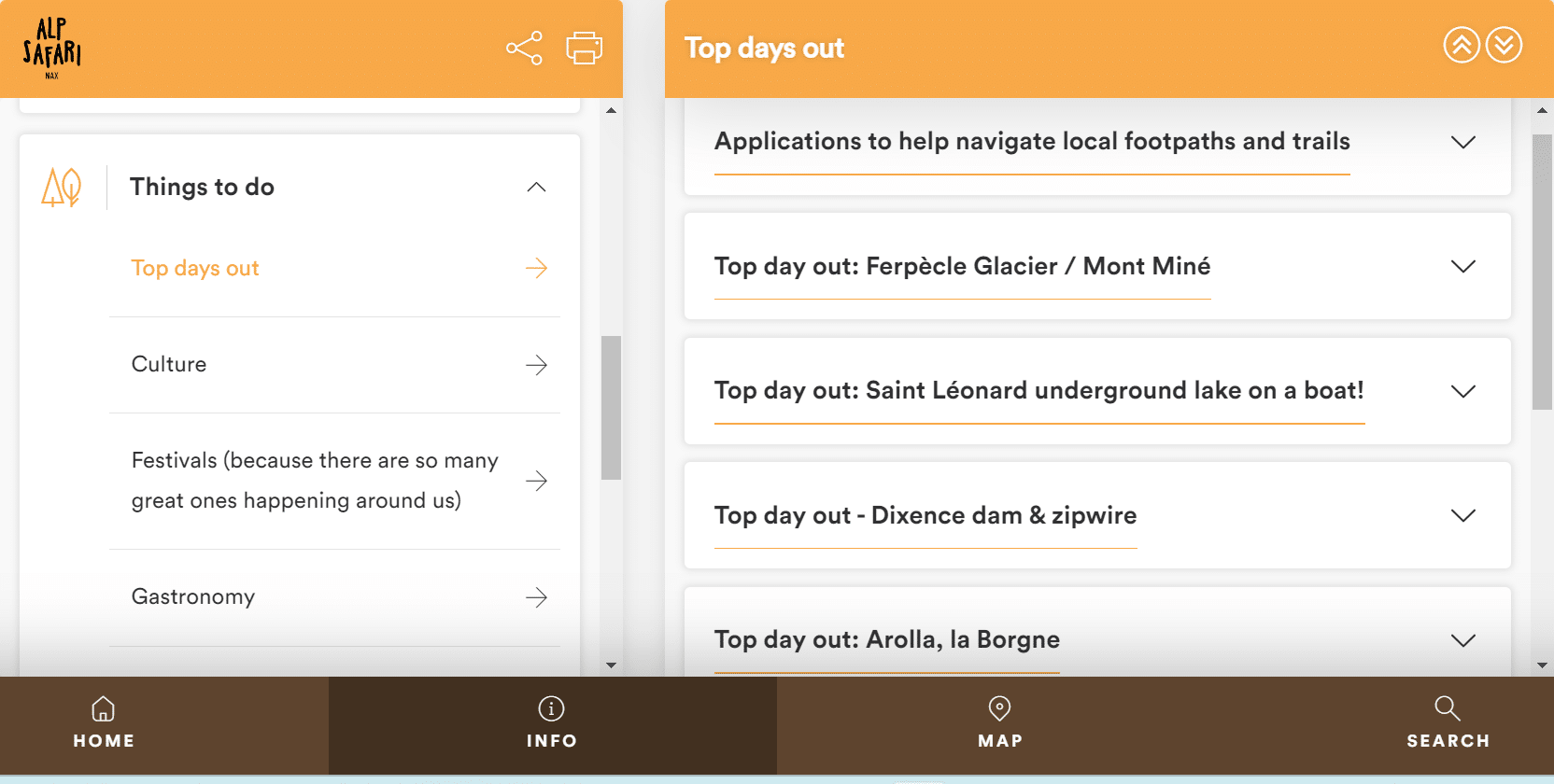
Alp Safari Nax provides their campers a number of Top Days Out under their Things To Do section of their Touch Stay welcome book. From easy to challenging walks and hikes, to thermal baths and a stroll with avalanche rescue St. Bernards, they provide loads of suggestions for their guests to do.
Campsite check-out FAQs
Just because it’s time for your guests to depart doesn’t mean the questions will necessarily stop. Providing sufficient information related to check-out times, waste disposal and instructions on how they can leave you a review alongside options to book with you again, will continue to wow your guests as you wave them goodbye.
- What time is check-out?
- Do you offer late check-out?
- Where do we dispose of our waste?
- How should we leave the pitch when we depart?
- If I have an issue, where can I leave it?
- Where can we leave a review for you?
- Where can I find you on social media?
- How do I book in with you again?
- Do you have a loyalty programme?
- Do you offer discounts if we decide to book again with you?
Seeking additional tips on how to surface your own commonly asked questions by caravanners and campers? The answers you seek are likely hidden in your past guest communications (or via Touch Stay’s example guides!).
1. Review prior questions
A great starting point in revealing what sort of commonly asked camper questions you should pop into your digital guidebook is reviewing prior guest questions! Having a glance at emails and OTA inbox correspondence with prior guests, can really help you get a sense of the sort of FAQs you need to be including.
Dig even deeper by reviewing your OTA reviews and property listings. Such places like TripAdvisor (in addition to reviews on TripAdvisor, Google and Airbnb), can provide a wealth of insight into the sort of questions guests are asking and the information they seek.
2. Explore example guidebooks
Seeking inspiration from fellow campsite owners or caravan parks managers? Have a look at some of Touch Stay’s example guidebooks for the kind of information Touch Stay users are including for their guests.
It can also be helpful to explore example guides for lodging types outside of campsite or caravan parks, too. While the type of accommodation might differ, all properties are united by the common goal of a top-notch guest experience. Don’t be afraid to explore the sort of information a short term rental or bed and breakfast property manager might be supplying their guests for the purpose of answering your campers’ or caravanners’ questions.
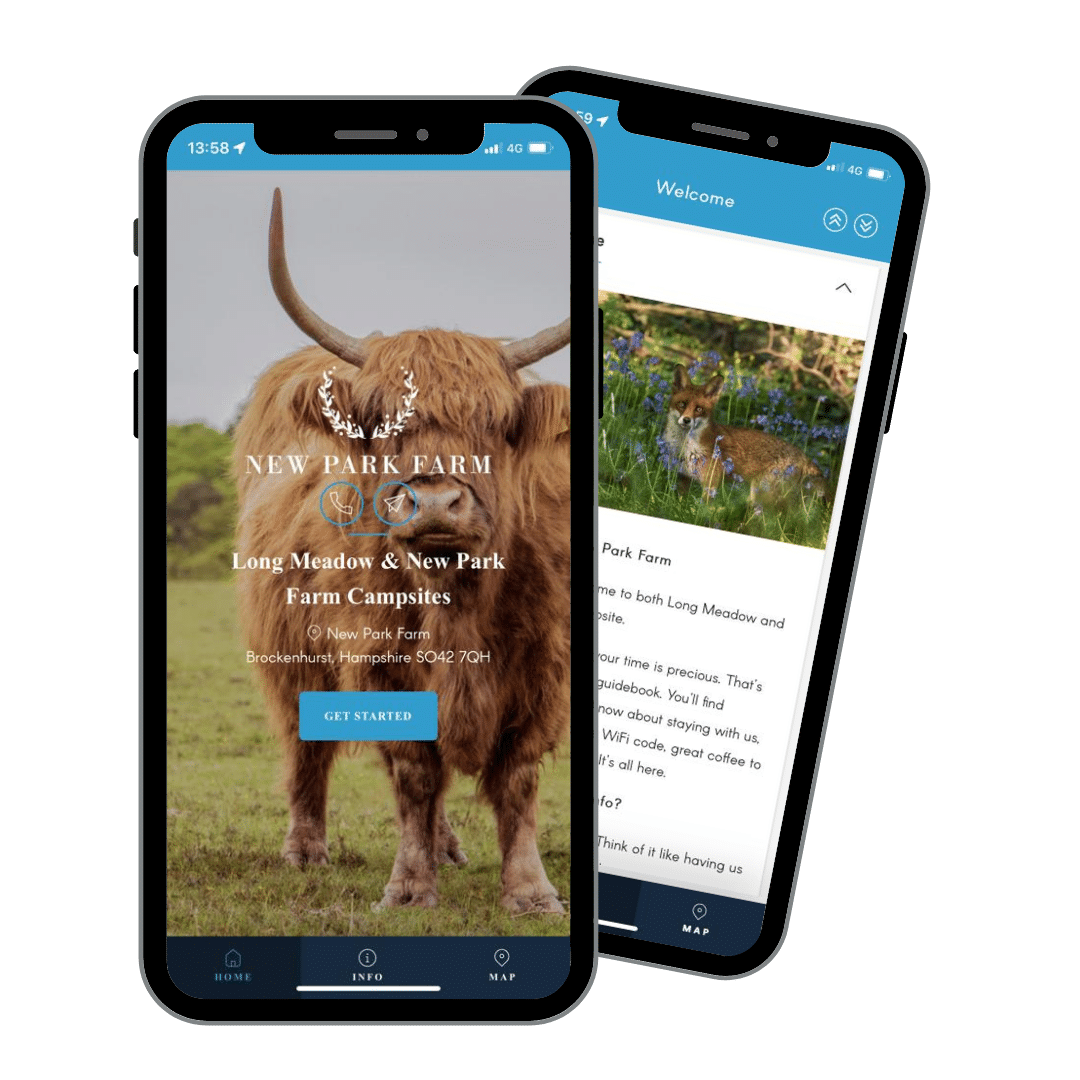
Quell guest questions with a Touch Stay digital guidebook
Provide your guests answers to questions they haven’t thought to ask yet with a Touch Stay digital guest welcome book. Customisable to the wants and needs of any and all campsites and caravan parks, no matter size, theme or location, a Touch Stay digital guidebook satisfies all guest queries, grants you back valuable time to effectively run your business, all while amplifying the guest experience.
Related Articles

9 inspirational glamping influencers (and how they can help your glamping business)

Rent out your RV and earn big: the ultimate RV rental marketing plan

Glamping business plan template - checklist, PDF and examples

25 camping conversation questions
Camping conversation questions.
This free worksheet contains a picture description activity and camping discussion questions for ESL classes. There is also a camping vocabulary matching worksheets page and a hiking conversation questions handout to take this lesson further.
The camping conversation questions are –
1 – What are some good places to go camping near your home?
2 – What is the most popular camping destination in your country?
3 – What things do you need to take when you go camping?
4 – Do you need a permit to go camping in your country?
5 – Do you worry about any animals when you go camping? Which ones?
6 – Do you know how to make a campfire? How do you do it?
7 – Which do you prefer, camping in the forest, on a beach , or in the mountains ?
8 – What activities do you like to do when camping?
9 – Besides animals, what things are dangerous when you are camping?
10 – Do you like to sleep in a tent or just in a sleeping bag looking at the stars?
11 – What is the longest amount of time you have camped for?
12 – What kinds of food do you eat when you camp? How do you cook?
13 – Have you ever heard of glamping? What is it?
14 – Have you ever had a bad experience while camping?
15 – What things should you consider when choosing a place to pitch a tent?
16 – Have you ever been bothered by mosquitos when camping? What did you do?
17 – What clothes are good to take camping?
18 – What kinds of drinks do you like to take camping?
19 – Have you ever camped in the rain? How was it?
20 – Do you think you would enjoy camping for a week or a month?
21 – Have you ever gathered or caught any food while camping?
22 – Is it better to camp where there are many campers or in a quiet secluded place?
23 – If you went camping for many days what would you most miss from home?
24 – Is camping popular in your home country?
25 – What time do you usually go to sleep and wake up when you are camping?
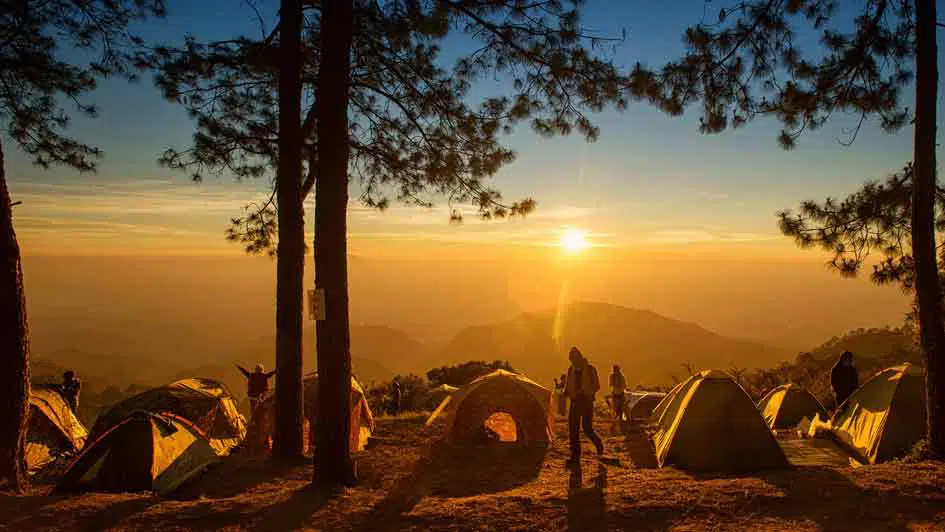
A follow up writing activity
Check out the desert island writing activity for a good related exercise. There is also a printable page of desert island conversation questions if you want to continue speaking.
You might also like these

25 Conversation questions about waterfalls

25 Conversation questions about trade

25 Conversation questions about Asia
Free ESL and English teaching resources, no sign up required. Just find what you like, download it and head to class!
Privacy Policy
Share ESL Vault with your friends!
- Writing Worksheets
- Vocabulary Worksheets
- Pronunciation
- Kids worksheets
- Idioms and Expressions
- ESL Puzzles
- ESL Pair Work Activities
- ESL Conversation Questions
- Coloring Pages
- Articles, Lists and Ideas
- Art and Craft Activities
Trivia Bliss
Over 100,000 Free Trivia Questions & Answers with Printable Quizzes
Are You a Happy Camper? Quiz: 71 Camping Trivia Questions
April 13, 2023 By Jamie Rotante Leave a Comment
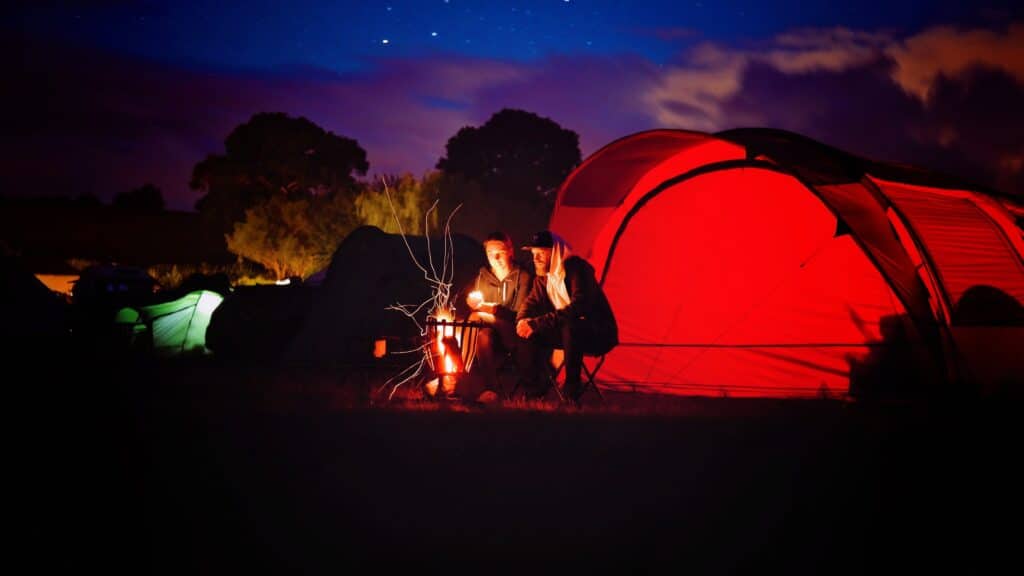
Welcome, all you happy campers, to our tent-rrific camping quiz! Are you ready to pitch in and test your knowledge on the wild and wonderful world of camping? We hope you’re not in-tents-ly nervous, because this quiz is packed with fascinating facts that are sure to spark your curiosity like a campfire! So, gather ’round and get ready to embark on a pun-derful adventure through national parks , camping history, facts, and firsts. Remember, there’s no need to feel camp-ative; it’s all just for fun!
1. What is the oldest known camping organization in the world?
2. What is the largest camping tent commercially available?
3. Which famous American writer was an avid camper and wrote about his experiences in the wilderness?
4. What is the most expensive campsite in the world?
5. In which national park was the first official campground established in the United States?
6. What is the world record for the largest s’more ever made?
7. Which country has the highest number of campsites per capita?
8. What is the highest elevation campground in the United States?
9. Which famous entrepreneur founded a luxury camping company that offers upscale tents and amenities?
10. What is the longest hiking trail in the world?
11. What is the most poisonous plant commonly found in North American campgrounds?
12. What is the smallest camping trailer commercially available?
13. Which African country is home to the world’s first wildlife camping safaris?
14. What is the rarest animal you can potentially encounter while camping in North America?
15. What is the coldest temperature ever recorded at a campground?
16. Which insect is considered the most dangerous to campers in the United States?
17. What is the world’s largest campground by area?
18. Which famous Hollywood actor is known for his love of camping and outdoor adventures?
19. What is the oldest known type of tent used for camping?
20. What is the world’s highest altitude campground?
21. Which U.S. state has the most campgrounds per square mile?
22. What is the largest species of bear you might encounter while camping in North America?
23. What year was the first portable camping stove invented?
24. What is the most remote campground in the world?
25. Which famous environmentalist and naturalist helped establish the U.S. National Park System and often camped in the wilderness?
26. What is the fastest land animal you can potentially encounter while camping in Africa?
27. What is the longest running camping music festival in the world?
28. Which famous American author wrote a book about his camping trip from New York to California in the 1960s?
29. What is the largest RV (Recreational Vehicle) ever made?
30. Which country has the largest network of free, public campgrounds?
31. What is the most venomous snake you can potentially encounter while camping in North America?
32. What is the world’s longest running camping TV show?
33. Which famous British explorer is known for his love of camping and wilderness survival?
34. What is the tallest waterfall you might encounter while camping?
35. What is the most common type of tree found in North American campgrounds?
36. Which famous scientist conducted research while camping in the Galápagos Islands?
37. What is the deepest lake you can camp near in the world?
38. What is the longest continuous camping trip ever recorded?
39. What is the most dangerous weather phenomenon campers should be aware of?
40. Which U.S. president was known for his love of camping and the outdoors?
41. What is the highest peak you can climb and camp on in Europe?
42. What is the most popular camping snack in the United States?
43. What is the largest national park in the world where you can camp?
44. Which famous astronaut was an avid camper and outdoor enthusiast?
45. What is the highest elevation campground in Europe?
46. Which country is home to the “Ice Hotel,” where you can camp in sub-zero temperatures?
47. What is the longest river you can camp along in the world?
48. Which famous musician is known for hosting camping music festivals?
49. What is the largest species of shark you can potentially encounter while camping near the ocean?
50. Which U.S. state is home to the “International Dark Sky Park,” where you can camp and stargaze without light pollution?
51. What is the most famous long-distance hiking trail in the United States where you can camp along the way?
52. Which country is home to the “Grand Tour,” a 1,200-mile (1,931-kilometer) long camping and hiking route?
53. What is the oldest national park in the world where you can camp?
54. Which famous actor starred in a movie about a solo camping trip that went awry?
55. What is the most biologically diverse national park in the world where you can camp?
56. What is the largest sand desert in the world where you can camp?
57. Which famous inventor was known for camping trips and outdoor adventures?
58. What is the world’s largest cave system where you can camp and explore?
59. Which famous children’s book author wrote a story about a family camping trip?
60. What is the largest freshwater lake in the world where you can camp along its shores?
61. Which U.S. president signed the Wilderness Act, protecting millions of acres of land for camping and outdoor recreation?
62. What is the longest stretch of continuous beach where you can camp?
63. Which famous explorer was known for his camping expeditions in Africa?
64. What is the tallest volcano you can climb and camp on?
65. Which famous naturalist and broadcaster is known for his camping and wildlife adventures?
66. What is the largest glacier in the world where you can camp and explore?
67. Which famous American poet was known for her love of camping and the outdoors?
68. What is the world’s longest coral reef system where you can camp and snorkel or scuba dive?
69. Which famous scientist conducted research on chimpanzees while camping in Tanzania?
70. What is the most isolated island in the world where you can camp?
71. Which U.S. state is home to the “Valley of Ten Thousand Smokes,” a unique volcanic landscape where you can camp?
Final Words
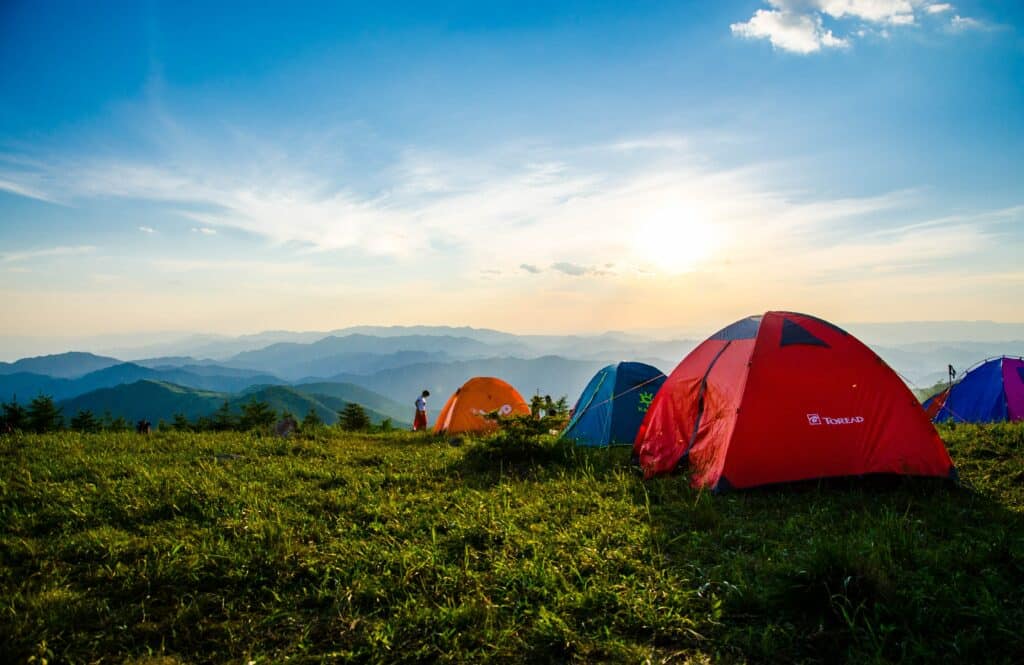
We hope you had a s’more-ific time with this camping quiz! If you’re still itching to hike through the world of trivia, make sure to check out Trivia Bliss’s other quizzes . They’re guaranteed to fuel your curiosity and leave you wanting s’more! Happy quizzing, and remember: the adventure never ends with Trivia Bliss!
About Jamie Rotante
Jamie is an Editor/Writer from New York and the lead editor at Trivia Bliss. She's been an avid trivia fan for years and has even been a part of a few pub league trivia competitions. Aside from editing for Trivia Bliss, she's also a professional comics editor and writer. In her free time, she loves reading, writing, listening to music, and attending her local weekly trivia night, hosted by her husband!
Leave a Reply Cancel reply
Your email address will not be published. Required fields are marked *

The Ultimate Camping Checklist for a Comfy Night Under the Stars
Plus a detailed, downloadable version that you can use for your next campout.
- Copy Link copied

Use this packing list to make sure you don’t forget anything for your next camping trip.
Illustration by Emily Blevins
Camping means different things to different people. Some travelers relish the idea of roughing it on a backcountry trip through a national park with only their hiking boots and camping essentials, while others load up for car camping with every possible creature comfort (think air mattresses, chargers, camp stoves, and more). I prefer a happy medium for our outdoor adventure packing list: All the basics plus a few creature comforts (a chair for stargazing, some fire starters, a fluffy camping pillow, maybe a cast-iron skillet for the perfect campsite breakfast, and lip balm) for a weekend outdoors.
For casual car campers—those who prefer to drive to a campsite rather than hiking or biking in—you’ll still need all of the essentials: a camping tent, sleeping bag, warm clothes, food, and a way to cook it all. But you also have the space to bring a bit more than just the basics, like trash bags, a toothbrush and toothpaste, and other personal items. To make sure you’re prepared and comfortable, use this camping checklist to guarantee you pack everything you need.
Tip: Download or save the printable camping checklist below to use for your next camping trip.
First-time camping tips
Before I jump into the camping checklist, let’s get some basics out of the way. The idea of camping is romantic—you never immediately think of the things that could bring discomfort like, say, some unexpected rain or a noisy crew at the neighboring site. Buying gear may seem like the biggest task, but make sure you know where you’re going to be camping first. Choosing a location is very important, as you want to know what kind of weather to prepare for, as well as the wildlife that also calls the area home. Once you determine those factors, narrowing down your gear will be easier.
Take the time to read customer reviews on the big-ticket items, like tents, hiking boots, camp stoves, and car camping structures. If needed, give retailers a call to talk through your options. More often than not—especially at shops like REI that celebrate outdoor communities—the staff will have opinions and experience using various pieces of gear.
Many campsites are on review sites like TripAdvisor and Yelp—if you’re curious about amenities, it’s best to refer to those who have experienced the spaces firsthand. (It also doesn’t hurt to consult the Reddit community r/Camping .) You can also search for the campsite on Instagram and scroll through tagged photos to better know what to expect.

Tip: Download or save this camping checklist to use for your next camping trip.
To set up your campsite, you’ll always need a shelter, sleeping bag, and sleeping pad, which can help you stay warm at night by keeping you off the ground. Other items—like chairs and pillows—add an extra touch of comfort. Also: Check your campground amenities before you pack. Most drive-up campgrounds will provide a picnic table and firepit and sell firewood on site.
- Tent, with footprint and stakes
- Sleeping bags
- Sleeping pads or cots
- Camping chairs
- Lighting, like a lantern and string lights
You may also want
- Camping table
- Firewood (aim to buy locally sourced wood close to your campground to avoid introducing invasive insects)
- Extra batteries
- Axe or hatchet (for chopping wood)
- Tent repair kit
To keep everything organized, consider packing everything in a dedicated camping gear bin or box, like the foldable Thule Go Box ($130).
Toiletries and first aid
When packing toiletries for camping, it’s more about being prepared for cuts, bug bites, and basic hygiene. If you’re only camping for a night or two, you might even skip showering entirely—though that doesn’t mean you can’t stay clean(ish). A simple body wipe and a stick of deodorant can do wonders after a night in a tent. Try to skip the paper towels (less trash!) and use quick-dry towels or a washcloth instead.
- Biodegradable soap
- Body or face wipes
- Toilet paper
- Quick-dry towel
- Hand sanitizer
- Insect repellent (plant-based Natrapel , $14, is a good DEET-free option)
- First aid kit, like the Adventure Medical Kits Ultralight Kit ($34), which includes adhesive bandages, gauze, tweezers, and pain relievers in a weatherproof bag.
- Camp shower
- Flip-flops (if your campsite has a shower)
- Clothesline
As a kid tagging along on my brother’s Boy Scout campouts, I learned that you should always, always, bring an extra set of clothes and shoes. No, not because it was part of the Boy Scout manual, but because I could never manage to make it through a night of s’mores without getting marshmallow all over myself. Bottom line, first-time campers: The unexpected happens in the great outdoors, so check the forecast and pack clothes that will keep you warm and dry during cold weather and at night and cool during the day.
- Short- and long-sleeved shirts
- Pants and shorts
- Warm jacket for evenings
- Boots or shoes for hiking
- Sandals for lounging around the campsite
- Sleep or loungewear
- Rain jacket
- Gloves or mittens
Camp kitchen and cooking
Sure, you could get creative with nothing but a roll of tinfoil and a campfire to cook your meals (hello, fire-baked potato). You’ll also want to bring along a few other camp kitchen essentials for cooking and cleaning up after, for those campfire taco dinners and pancake breakfasts.
Keep in mind that if you’re camping in bear country, it’s a good idea to bring a bear-proof canister to store your food (some coolers, like the Yeti Tundra , can be used with bear-proof locks). However, drive-in campsites will often provide metal lockers to keep your food safe from bears and other wildlife.
- Stove and fuel
- Matches or lighter
- Kitchen kit (pots and pans) and cooking utensils
- A good knife
- Mess kit (plate, bowl, and eating utensils)
- Portable coffee maker (like Snow Peak’s collapsible coffee drip , $43)
- Biodegradable soap (I like Joshua Tree camp soap , $10, which doubles as dish and body soap)
- Trash and recycling bags
- Filled water jugs (if your campsite doesn’t have potable water)
- Grill and charcoal
- Cutting board
- Bottle opener
- Water container or reusable water bottles
- Can opener (if you’re bringing canned foods)
It’s also helpful to plan what meals you want to make while camping and draft a food shopping list beforehand. Oatmeal, freeze-dried soups, sandwiches, and hot dogs are always easy-to-cook camp classics. If you’re looking for more inspiration, I love the delicious camp-friendly recipes (like a tinfoil shrimp boil or skillet pizza) in The Campout Cookbook ($19).
Don’t feel like prepping and shopping for your camp meals? Patagonia Provisions supplies such items as dried fruit, dehydrated bean soups, and even canned mussels that you can pack for a weekend of low-fuss food .
This article originally appeared in 2019. It was updated on May 23, 2024, to include current information.

- Virtual Experiences
- In-Person Experiences
- Hybrid Experiences
- Social Calendar [New]
- Experience FAQ
- Features & Benefits
- How Pricing Works
- Client Testimonials
- Happiness Guarantee
- Blog Articles
- Video Library
- View Experiences
Campfire Questions: #1 List
By: Michael Alexis | Updated: April 17, 2024
Here is our list of campfire questions .
Campfire questions are questions you can ask while enjoying a camping trip or bonfire. For example, “What would be your perfect day spent entirely outdoors?” The purpose of these questions is to start interesting conversations with colleagues.
These activities are similar to virtual campfire ideas , yes or no questions , where do you stand questions , and either or questions .
This list includes:
- campfire icebreaker questions
- campfire this-or-that questions
- outdoor get-to-know-you questions
- thoughtful campfire questions
- funny campfire questions
- campfire would-you-rather questions
- campfire storytelling questions
- campfire riddles
- campfire brain teasers
- wilderness trivia questions
Here we go!
Campfire icebreaker questions
- What’s your favorite camping memory?
- If you could camp anywhere in the world, where would it be and why?
- What’s the most adventurous thing you’ve ever done outdoors?
- Share a funny camping mishap or story.
- What’s your go-to camping meal or snack?
- Do you have any special camping traditions or rituals?
- If you could bring one luxury item with you camping, what would it be?
- What’s the most beautiful natural scenery you’ve ever seen?
- What is your favorite campfire song?
- Do you know any good ghost stories?
- What’s your best outdoor skill?
- If you could only pack three items for a camping trip, what would they be?
- What’s the craziest wildlife encounter you’ve had while camping?
- What’s your favorite thing about being out in nature?
- If you could invent a new camping gadget, what would it do?
- Do you have a tip or trick for making camping more enjoyable?
- What is the most breathtaking sunrise or sunset you’ve seen while camping?
- If you could live in any time period as a camper, when and where would it be?
- What’s the scariest or most thrilling outdoor activity you’ve ever tried?
- Share a memorable encounter you’ve had with a fellow camper.
- If you could spend a week camping with any celebrity, who would it be and why?
- What is your favorite camping tradition?
- What’s the most unexpected thing you’ve found while exploring nature?
- If you were stranded on a desert island with only one person from this campfire, who would you choose and why?
Check out more icebreaker questions .
Campfire this-or-that questions
- Forest or island camping?
- Birds or waves wake-up call?
- Mountains or beach camping?
- Tent or open sky sleeping?
- Unlimited s’mores or hot dogs?
- Winter snow or summer stars?
- Mosquitos or mysterious rustling?
- Camping solo or with strangers?
- Chop wood or hunt dinner?
- Haunted forest or ghost town?
- Hammock or treehouse?
- Waterfall or mountain lake swim?
- Backpacking or RV camping?
- Pitching tents in the rain or heat?
- Campfire stories or stargazing?
- Canoeing or rock climbing?
- Lantern light or moonlit night?
- Campfire cooking or picnic under the trees?
- Wildlife encounter or meteor shower?
- Sunrise or sunset hike?
- Marshmallow roasting or hot cocoa sipping?
- Sleeping bag or cozy blanket?
- Trails or bushwhacking?
- Hammock or chair?
- Fishing by the lake or by the river?
- Campfire games or nature sketching?
- Campfire coffee or tea?
- Starry sky or crackling fire?
- Canoeing or kayaking?
- Flashlight or headlamp?
- Campfire chili or pizza?
- Midnight snack or early morning coffee?
- Hiking boots or sandals?
- Night hike or morning stroll?
- Campfire charades or trivia?
- Guitar sing-along or ghost stories?
- Forest exploration or mountain trek?
- Camping under tall trees or beside a lake?
- S’mores or hot chocolate?
Here are more this or that questions .
Outdoor get-to-know-you questions
- What’s your favorite outdoor activity and why?
- What’s the most memorable outdoor adventure you’ve had?
- If you could visit any national park, which one would it be and why?
- What’s the craziest outdoor challenge you’ve taken on?
- If you could learn any outdoor skill overnight, what would it be?
- What’s your favorite thing about being outdoors?
- If you could spend a day with any famous outdoor enthusiast, who would it be and why?
- What is your perfect picnic spot?
- What’s the most adventurous thing on your outdoor bucket list?
- What’s your favorite childhood memory of playing outside?
- If you could live in any outdoor setting, where would it be and why?
- What’s your favorite season for outdoor activities?
- Can you share a time when nature surprised you in a positive way?
- If you could build your dream outdoor retreat, what features would it have?
- What place in nature feels like home to you?
- What’s the longest hike or bike ride you’ve ever completed?
- If you could have any outdoor animal as a companion, what would it be?
- What would be your perfect day spent entirely outdoors?
- What’s your favorite piece of outdoor gear or equipment, and why?
- Can you share a time when you overcame a challenge while exploring the outdoors?
- What’s your most cherished outdoor-related possession?
- What’s your favorite outdoor game?
- What advice would you give to someone exploring the outdoors for the first time?
- If you could witness any natural phenomenon firsthand, what would it be?
- If you could explore any fictional outdoor setting from a book or movie, where would you go?
Here are more get to know you questions .
Thoughtful campfire questions
- What does nature teach you about yourself?
- Can you share a moment when you felt truly connected to the world around you?
- How has spending time outdoors affected your perspective on life?
- What role does solitude play in your relationship with nature?
- How do you find a balance between embracing the wilderness and respecting it?
- Has nature ever served as a source of healing for you?
- What values do you think are most important to learn through outdoor experiences?
- What lessons have you learned from a mistake or setback while camping or hiking?
- How does being in nature affect your sense of gratitude?
- What responsibilities do we have in caring for nature while enjoying outdoor activities?
- Have you made a connection with a stranger while exploring the outdoors?
- How do you think spending time in nature impacts mental health?
- What lessons can nature teach us about resilience?
- Have you felt a moment of belonging in nature?
- How has your connection to nature changed over time?
- What’s the role of mindfulness in the outdoors?
- How do you overcome fear in nature?
- How does technology affect our outdoor experiences?
- What does it mean to be present outdoors?
- How can nature encourage empathy and compassion?
- How do you find peace in nature?
- What’s the power of storytelling in nature?
- How does nature shape our identity?
- How do we give a love of nature to future generations?
- If you could have a campfire cooking competition with any celebrity chef, who would it be, and what would you cook?
Funny campfire questions
- If you were a marshmallow, how would you like to be roasted?
- What’s the most embarrassing camping-related mishap you’ve ever had?
- Would you rather fight one horse-sized mosquito or a hundred mosquito-sized horses?
- What’s the weirdest thing you’ve ever eaten while camping?
- What’s the funniest wildlife encounter you’ve had while camping?
- If you were a camper in a horror movie, what would be your survival strategy?
- Can you sing the silliest camping song or chant you know?
- What’s the most ridiculous camping gadget you’ve ever seen or used?
- What’s your best camping-themed dad joke?
- If you were a camping superhero, what would your ridiculous superpower be?
- What’s the most ridiculous camping fashion trend you’ve ever seen or heard of?
- If you could rename common camping gear with funny names, what would you call them?
- What’s the funniest thing you’ve ever heard someone say in their sleep while camping?
- What’s your most embarrassing campfire cooking fail?
- What’s the silliest camping-related superstition you’ve ever heard of?
- What’s the most ridiculous camping prank you’ve ever pulled or witnessed?
- If you could have a conversation with any animal around the campfire, which animal would it be, and what would you talk about?
- Share the funniest camping-related dream you’ve ever had.
- What’s the most absurd camping-related rumor you’ve ever heard?
- If you were a campfire superhero, what would be your weakness?
- What is the craziest camping-themed conspiracy theory you can come up with?
- If you could add a ridiculous feature to your camping gear, what would it be?
- If you could turn any camping activity into an Olympic sport, what would it be, and what would the rules be?
- What’s the weirdest camping-related dream you’ve ever had?
Campfire would-you-rather questions
- Would you rather have to sleep in a tent made entirely of marshmallows or a sleeping bag made entirely of gummy bears?
- Would you rather have a campfire that always smells like bacon or one that plays your favorite song every time it crackles?
- Would you rather have to navigate through the wilderness blindfolded or with your shoes tied together?
- Would you rather have marshmallow-sized fireflies or firefly-sized marshmallows?
- Would you rather go on a camping trip where day and night swap places unexpectedly or one where the landscape turns into different terrains every hour?
- Would you rather have a backpack that gives you any item you want or a tent that sends you to any location in the world?
- Would you rather have a magical campfire that grants wishes but only while it’s burning or a tent that can grow and shrink according to your desires?
- Would you rather discover a hidden treasure chest buried in the campground or stumble upon a secret underground cave system?
- Would you rather have unlimited s’mores or enjoy a gourmet camping meal cooked over a campfire?
- Would you rather go on a solo backpacking trip for a week or go car camping with your entire family for a weekend?
- Would you rather spend a camping trip disconnected from technology or have access to Wi-Fi and electricity?
- Would you rather go camping in a national park or in a secret spot off the beaten path?
- Would you rather find a friendly bear while hiking or a curious raccoon at your campsite?
- Would you rather cook meals over an open campfire or with a portable camping stove?
Campfire storytelling questions
- Have you ever had a spooky encounter in the wilderness?
- What’s the most memorable camping mishap you’ve experienced?
- What is your best fishing experience?
- Have you ever encountered anything mysterious or unexplained in nature?
- What was your favorite camping experience?
- What was your worst camping experience?
- What is the most adventurous hike you’ve ever been on?
- What is a funny or embarrassing camping moment that still makes you laugh?
- Have you ever experienced a magical moment in the wilderness?
- Can you share a story about a campfire tradition or ritual that holds special meaning to you?
Campfire riddles
- Campfire grill or fire pit
- Path or Trail
- Answer: Firefly
- Answer: Lake
- Answer: Butterfly
- Answer: Swan
Here are icebreaker riddles .
Campfire brain teasers
- Answer: You would light the match first.
- Answer: Fire
- Answer: A bottle
- Answer: A fence
- Answer: A map
- Answer: Footsteps
- Answer: A river
- Answer: Mountain
- Answer: Breath
- Answer: Fish
Get more brain teasers .
Wilderness trivia questions
- Answer: Entomologist
- Answer: The polar bear
- Answer: Denali, formerly known as Mount McKinley
- Answer: The Appalachian Trail
- Answer: Angel Falls in Venezuela
- Answer: The coast redwood
- Answer: Deciduous forest
- Answer: The humpback whale
- Answer: Pine needle or pine tree
- Answer: Citronella
Campfire questions can be a fun and easy way to bring folks together and spark interesting conversations. Whether you are at work or out in nature, these simple questions can help break the ice and get the whole team talking. From sharing funny stories to discussing deeper topics, campfire questions create a warm and welcoming atmosphere where each participant can feel included. Next time you are gathered around the fire, do not be afraid to ask a question and see where the conversation takes you!
Next, check out our articles on never have I ever questions , random question generator , and conversation starter questions .
Book wildly fun team building events with expert hosts

FAQ: Campfire questions
Here are answers to common questions about campfire questions.
What are campfire questions?
Campfire questions are like little puzzles or games you ask when you are hanging out around a fire. These fun questions get folks talking and sharing stories. Campfire questions are just a way to have a good time and learn more about each other!
What are the best campfire questions?
There are plenty of great questions you can ask around the campfire.
Here are a few examples:
These questions spark fun conversations and help folks share interesting facts and stories about themselves.
When should you ask campfire questions?
You can ask campfire questions whenever you are sitting around a fire with friends or coworkers. This setting is a good time to question folks when you want to have fun and start interesting conversations. Whether you are camping, having a backyard bonfire, or just sitting around a fire pit, that is the perfect time to ask campfire questions!
Author: Michael Alexis
CEO at teambuilding.com. I write about my experience working with and leading remote teams since 2010.
Leave a Reply Cancel
Your email address will not be published.
CEO at teambuilding.com.
I write about my experience working with and leading remote teams since 2010.
- 45,000+ clients including Apple, Amazon, Google and NASA
- 50,225+ five star reviews on Google
- #15 on Inc 5000's List of Fastest Growing Private Companies in America for 2022
- 80+ happy remote employees
We lead wildly fun experiences for teams with 1,000,000+ players to date.

4.96 / 5.0 rating on
50,225 Google Reviews
Get our free team building tool box
$49 value at no cost..
- May as well check it out?
- 100+ tested icebreaker questions
- 24+ themed Bingo generators
- 5+ PDFs (including the 8% Rule)
- 2024 team building calendar and more...

Enter your email for instant access

Reading & Math for K-5
- Kindergarten
- Learning numbers
- Comparing numbers
- Place Value
- Roman numerals
- Subtraction
- Multiplication
- Order of operations
- Drills & practice
- Measurement
- Factoring & prime factors
- Proportions
- Shape & geometry
- Data & graphing
- Word problems
- Children's stories
- Leveled Stories
- Context clues
- Cause & effect
- Compare & contrast
- Fact vs. fiction
- Fact vs. opinion
- Main idea & details
- Story elements
- Conclusions & inferences
- Sounds & phonics
- Words & vocabulary
- Reading comprehension
- Early writing
- Numbers & counting
- Simple math
- Social skills
- Other activities
- Dolch sight words
- Fry sight words
- Multiple meaning words
- Prefixes & suffixes
- Vocabulary cards
- Other parts of speech
- Punctuation
- Capitalization
- Narrative writing
- Opinion writing
- Informative writing
- Cursive alphabet
- Cursive letters
- Cursive letter joins
- Cursive words
- Cursive sentences
- Cursive passages
- Grammar & Writing
Breadcrumbs
- Children's Stories
The Camping Trip

Download & Print Only $3.49
Children's story & worksheet
The Camping Trip is a short story for kids in grade 2. Reading comprehension questions follow the story.
Fiction: 195 Words Story

More Stories:
What is K5?
K5 Learning offers free worksheets , flashcards and inexpensive workbooks for kids in kindergarten to grade 5. Become a member to access additional content and skip ads.

Our members helped us give away millions of worksheets last year.
We provide free educational materials to parents and teachers in over 100 countries. If you can, please consider purchasing a membership ($24/year) to support our efforts.
Members skip ads and access exclusive features.
Learn about member benefits
This content is available to members only.
Join K5 to save time, skip ads and access more content. Learn More
- Forgot Password?
- Show all results for " "
Discover Camping
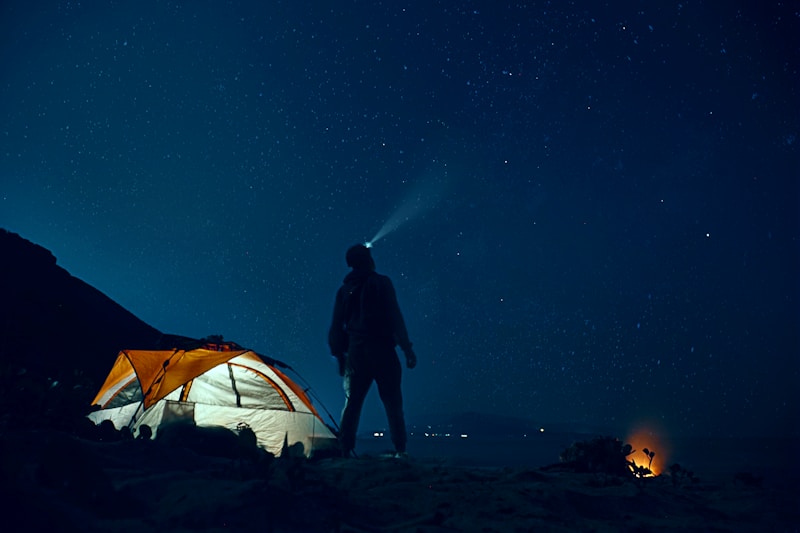
Camping and Glamping Quiz
Camping Safety Tips for the Great Outdoors
What's Your Camping Style?
Camping Essentials Quiz
Camping Safety and Tent Setup Quiz
Camping Basics Quiz
Camping and Pest Control Strategies
Clothing and Gear Essentials for Camping
Balekambang Beach Camping Adventure
Camping Equipment Features Quiz
Camping Vocabulary: Hiking Trails and Campsite Terms
Camping and Wellness
Birthday Wishes and Camping Trip
Arctic Camping Quiz
Desert Camping Adventure Story
Desert Camping Adventure
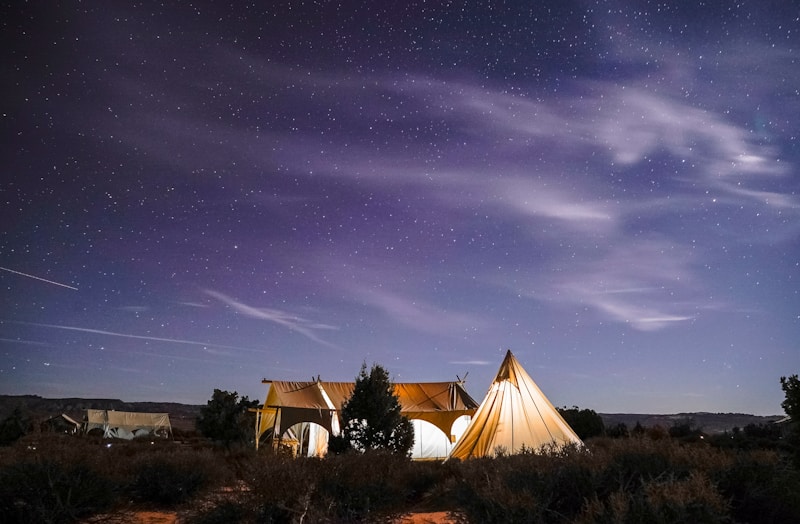
Can You Survive a Camping Nightmare?
Test Your Camping Knowledge with Pablo and Carlos
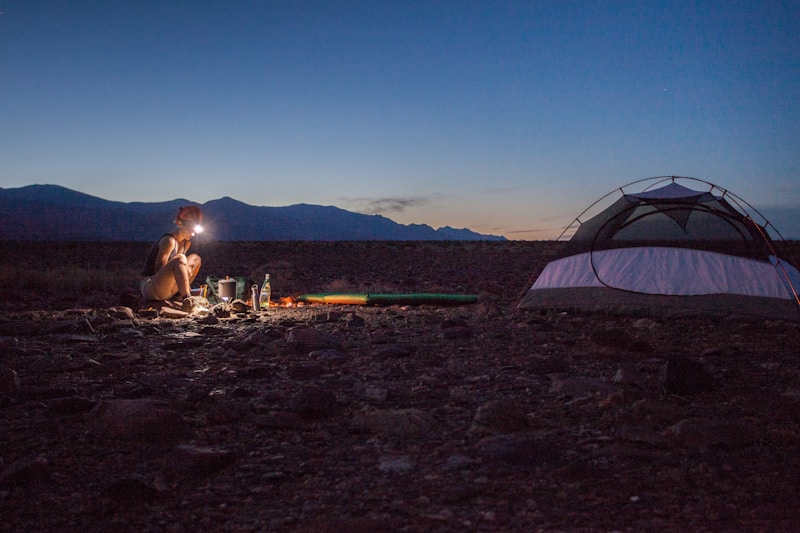
What's Your Camping Personality?
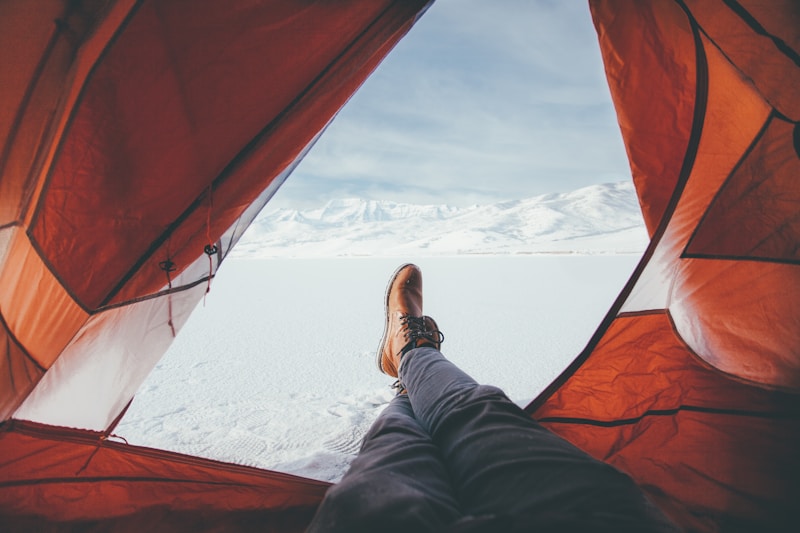
Lost in the Desert: A Family Camping Adventure
Vocabulario para acampar
In an Outdoor Adventure: Which of the Following Quiz
Building a Campfire in the Snowstorm
What is your glamping style?
Backpacking Gear Essentials
Review Outdoor Activities with Quiz and Flashcards
Fire Starting Fundamentals
Mountaineering Activities Quiz
Capping and Lamination in Tablet Manufacturing Quiz
Upgrade to continue
Today's Special Offer
Save an additional 20% with coupon: SAVE20
Upgrade to a paid plan to continue
Trusted by students, educators, and businesses worldwide.
We are constantly improving Quizgecko and would love to hear your feedback. You can also submit feature requests here: feature requests.
Create your free account
By continuing, you agree to Quizgecko's Terms of Service and Privacy Policy .
A Complete Beginners Guide to Packing for a Camping Trip
By Oscar Hartzog
Oscar Hartzog
If you purchase an independently reviewed product or service through a link on our website, Rolling Stone may receive an affiliate commission.
It happens often: First-time campers head into the wilderness with a tent and a sleeping bag , ready for a few relaxing days outside. And then, within a couple of hours, they realize they’ve severely under-packed. From kitchen supplies to warm sleeping gear to bug spray, there’s a lot to remember when packing for a camping trip. It can seem intimidating at first, but don’t worry: It’s totally manageable and gets exponentially easier with each trip.
Beginner Camping Gear Checklist
If you’re heading out on your first or second camping trip, we’re here to help. Below is a complete checklist of camping gear for beginners, including all the essentials for your tent , camp kitchen, and wardrobe. We’ve included links to our top pick for each item — all available from trusted brands with at least a 4/5-star average rating.
Campsite Gear
The most important part of your camping trip is, of course, the campsite. If you’re buying a tent , always air on the side of too large instead of too small, and be sure to pick one that’s easy to set up if you’re new to pitching a tent. As for your sleeping setup, find a sleeping bag that matches the lowest nighttime temperature in your destination. Summer sleeping bags are good for 30°F and higher, three-season bags are for 15°F to 30°F, and winter bags are for 15°F and colder. A sleeping pad and pillow are also a must, and camping chairs make a huge upgrade for mornings and evenings lounging by the fire.
Tent : Big Agnes Bunk House 6 Tent, $489.99
Sleeping Bag : The North Face Wawona Bed 20 Sleeping Bag, $78
Sleeping Pad : NEMO Quasar 3D Insulated Sleeping Pad, $119.99
Camping Pillow : NEMO Fillo Camping Pillow, $33.74
Lantern : Goal Zero Lighthouse 600 Lantern & USB Power Hub, $69.99
Camp chairs : Helinox Savanna Chair, $164.96
Natural Bug Spray : Murphy’s Naturals Insect Repellent Spray (2-pack), $19.98
Tools & Personal Gear
One easy way to be more prepared is to invest in a few basic tools, starting with a reliable multi-tool. Leatherman is really the only name in this category, so pick up one of those if you don’t already own one. You’ll also need a headlamp , a first-aid kit , and duct tape (this comes in handy shockingly often). Also, be sure to find out if there’s firewood available; if not, bring an axe to get your own.
Multi-Tool : Leatherman Wave+, $119.99
Headlamp : Black Diamond Astro 300 Headlamp, $19.95
Axe : Hults Bruk Almike All-Purpose Hatchet, $154
Duct Tape : The Original Duck Brand Duct Tape, $7.95
First-Aid Kit : First Aid Only All-Purpose First Aid Emergency Kit, $16.46
Camping Duffel : NEMO Double Haul 55L Convertible Duffel & Tote, $134.96
Food, Water & Cooking Gear
Kitchen supplies are sometimes neglected by beginner campers, and hungry campers are not happy ones. Be sure to pick up a portable stove or grill , as well as a pot and/or pan , a cooking knife , and serving utensils . Also, maybe most important is a large, reliable cooler .
Stove or Grill : Coleman Cascade 3-in-1 Stove, $209.99
Cooler : Yeti Roadie 60, $450
Pan/Pan : TOAKS Titanium Pot with Pan, $54.95
Utensils : UCO Utility Spork 3-in-1 Combo (4-pack), $10.99
Knife : Camp Chef Deluxe Knife Set, $69.99
Cups : Coleman 12oz Enamel Coffee Mug, $9.24
Water Filter : LifeStraw Personal Water Filter
Outdoor Apparel
As with most outdoor activities, layers are the name of the game when figuring out your camping wardrobe. Even if you’re camping in the summer, be sure to bring thermal underwear and a warm jacket, as well as regular outdoor clothing and shoes. Mornings and nights out in the wild are beautiful, but they’re also colder than most beginners realize.
Long-sleeve Tee: Men’s Free Fly Bamboo Lightweight Hoodie, $74
Women’s Free Fly Women’s Bamboo Shade Hoodie II, $74
Hiking Shoes : On Cloudhorizon Waterproof Hiking Shoes, $189.99
Wool Socks : Darn Tough Critter Club Micro Crew Lightweight Socks, $24
Thermal Underwear : Men’s Smartwool Merino Baselayer Top, $115 / Bottoms, $90
Women’s Smartwool Merino Baselayer Top, $115 / Bottoms, $115
Warm Jacket : Men’s Patagonia Down Sweater, $279
Women’s Patagonia Down Sweater, $329
21 Swimsuits You’ll Wear All Summer Long
- Beach Season
- By Anamaria Glavan
Lady Gaga's 'Chromatica Ball': How to Watch the Concert Special Online
- By John Lonsdale
WNBA Livestream: How to Watch the Indiana Fever vs. Las Vegas Aces Game Online
- Streaming Guide
The 22 Best Summer Dresses That Are Also Easy to Pack
- Pack smarter not harder
21 Beauty Essentials That Are TSA-Friendly
- Carry-On Ready
Rolling Stone is a part of Penske Media Corporation. © 2024 Rolling Stone, LLC. All rights reserved.
Verify it's you
Please log in.
Top tips for first-time campers in WA
This story is part of this week’s Hiking and Camping Guide. Find more at seattletimes.com/life/outdoors and in the Sunday May 19 edition of The Mix .
You’ve heard it a million times: Camping is a quintessential part of Pacific Northwest culture. But if you aren’t used to sleeping outside, it’s daunting. We talked to local experts to get their insights on everything from essential items and what to eat to what to do if it rains. Here’s what they said ahead of Washington’s splendid summer.
Related CAMPING AND HIKING
- 6 Mount Rainier hikes that won’t require a reservation this summer
- Everything you need to know to go camping in Washington
- 6 great WA cycling trails to explore this summer
- Get to know Seattle’s unique street trees with this new book
Where to stay
There are many ways to camp in Washington, leveling up to dispersed camping and backcountry adventures . But drive-up campgrounds are best for newbies.
Established campgrounds can be found at state parks, in national forests and national parks, on Department of Natural Resources land, and on private land. For first-time campers, state park campgrounds tend to have more amenities.
This includes regular bathrooms (as opposed to pit toilets), showers at some parks and more reliable cell service. And since state parks tend to be closer to population centers, it’s easier to make a trip to a store in case you’ve forgotten a crucial item. Typically, each campsite has a spot to park your vehicle, a picnic table and a fire pit. Most campgrounds have water spigots for drinking water, and many have ADA-accessible campsites.
Campsites for summer weekends book up quickly each year, but check back frequently for cancellations or search for a hidden gem. To make reservations at Washington State Parks, go to washington.goingtocamp.com . Weekdays tend to be quieter if you can swing it. (Federally managed camping sites are booked at recreation.gov .)
What to bring
Camp checklists differ, but most people agree on several key items: tent, sleeping bag, a bag of some sort, camp chairs, a light source, water bottles, a camp stove and a way to light it, and kitchen items to cook with. Beyond the basics, there are plenty of ways to add some coziness.
“I would recommend folks tailor the gear that will make their trip enjoyable and that starts with thinking about what you prioritize in your day-to-day life,” said Malea Sary, a volunteer with Outdoor Asian WA .
Anna Roth, digital content manager and media liaison for Washington Trails Association, brings a full-size pillow and her entire skin care routine, while Meryl Lassen, communications consultant for Washington State Parks, brings games and books.
Sleeping setup
How big of a tent do you need? It’s all about personal preference.
Tents often advertise capacities anywhere from two to six campers. But just because they can fit that many people doesn’t mean it will be comfortable. If it’s your first time camping, opt for something a bit larger than technically needed so you can have space to move around.
Doris Wang, a WTA ambassador, notes that her Coleman four-person Sundome tent served her well for years before she upgraded to a six-person tent she can stand in. If you’re camping with kids, consider two tents.
Now, what are you going to sleep on? Air mattress? Cot? Sleeping pad ? Again, it’s all about personal preference. You have to try multiple options to find the setup that suits you. A pro tip: Practice setting up your tent before you go camping for the first time; you’ll feel more confident for the real deal. And it always helps to learn from a more experienced buddy.
What if it rains? Well, it’s Washington state. Chances are, you may encounter some rain.
So what do you do?
“You have to come with the mindset that it will rain and still be fun,” said Liane Lau, another Outdoor Asian volunteer.
Practical tips for withstanding the weather include bringing a pop-up canopy tent or a large tarp to tie above the picnic table. Another tip: Bring quick-dry microfiber towels. They can be used to wipe down wet surfaces or the paws of furry friends before they enter the tent.
Cooking at camp
“There is no right or wrong camping food, which again touches back with how personal camping can be for people,” said Sary, the Outdoor Asian volunteer.
First, decide if you want to keep it basic to avoid cooking and cleaning up, or if you want meal-making to be a highlight of the trip.
Since Emily Masseth of Washington State Parks is usually camping by herself, she opts for items that don’t need to be cooked: “things to make salads or sandwiches, chips, yogurt and granola, protein bars, and sometimes a little late-night candy treat.”
Most Read Life Stories
- Wing Luke Museum closes after staff walkout over exhibit
- 8 unique PNW lodges, from historic hotels to restful resorts
- 5 Seattle-area restaurants with nice patios and good food
- 5 WA beginner backpacking trips for this summer
- Alaska Airlines announces the return of hot entrees on some flights
If you want hot food, or at least coffee in the morning, a ubiquitous option is the Coleman two-burner camp stove. You then have the option of packing a cooler with items to cook a whole meal, like breakfast burritos, chili or a stir-fry. Save some effort by prepping things like veggies at home. Pack perishables into a trustworthy cooler, preferably with ice packs over ice, which will melt and make a mess.
Affordable fun
The cost of camping can be a barrier for people. Luckily there are ways to make camping fit your budget.
- Slowly build up your equipment over time. In the meantime, rent from local gear companies (Ascent Outdoors or REI are two affordable options for everything you need to camp) or ask to borrow from friends.
- You don’t need the priciest gear. Sary used a $70 tent for her first seven years of camping. She also seeks out secondhand or discounted items when seasonal deals are happening.
- Use what you have. Sary encourages folks to see what they have at home already and are OK with taking camping, such as cooking utensils or cutting boards. “You would be surprised at how many household items you have that are capable of being used indoors and outdoors,” she added.
It’s never too late
Starting a new hobby is intimidating, especially when you’re older. Many people aren’t exposed to camping as children, and plenty of people start as adults, including several of the experts consulted on this story. Sary went on her first trip as a toddler, then didn’t go again until college. Now she guides car camping beginners through the process.
“Through camping, I’ve been able to discover how much joy and empowerment it brings me,” Sary said. “If I am capable of doing this, what’s stopping me from trying other things that daunt me?”
The opinions expressed in reader comments are those of the author only and do not reflect the opinions of The Seattle Times.

Car Camping Food List: Essential Items to Pack for Your Next Trip
C ar camping is an excellent way to experience the great outdoors while still enjoying the comforts of home. With the right gear and a well-planned food list, you can enjoy delicious and satisfying meals even when you’re miles away from civilization. Whether you’re a seasoned camper or new to the world of car camping, having a comprehensive food list is essential to ensure that you have everything you need to prepare meals during your trip.
When planning your car camping food list , it’s important to consider the type of meals you want to prepare, the equipment you have available, and the storage space you have in your vehicle. Non-perishable food items such as canned goods, granola bars, and instant oatmeal are always handy to have on hand, as they don’t require refrigeration and can be easily stored in a camp kitchen bin.
However, if you have the means to keep food cold , you can also bring perishable items such as fresh fruits and vegetables, cheese, and meat. Just be sure to pack them in a cooler with plenty of ice to keep them fresh throughout your trip.
Essential Car Camping Food List
When planning a car camping trip, it is essential to have a well-stocked food supply. Here are some of the essential food items to include in your car camping food list.
Protein is an essential nutrient that helps keep you feeling full and satisfied. Here are some great protein sources to include in your car camping food list:
- Canned tuna or chicken
- Jerky or meat sticks
- Peanut butter
- Canned beans
- Pre-cooked sausage or bacon
Vegetables are an important part of any healthy diet. Here are some great vegetable options to include in your car camping food list:
- Carrots, celery, and other raw veggies for snacking
- Canned or fresh corn
- Canned or fresh green beans
- Canned or fresh tomatoes
- Canned or fresh peppers
Fruits are a great source of vitamins and minerals, and they make a great snack or dessert option. Here are some great fruit options to include in your car camping food list:
- Apples, oranges, and other whole fruits
- Dried fruit
- Fruit snacks
Grains are a great source of carbohydrates, which are important for energy. Here are some great grain options to include in your car camping food list:
- Bread or rolls
- Cereal or oatmeal
- Pasta or rice
Dairy products are a great source of calcium and other essential nutrients. Here are some great dairy options to include in your car camping food list:
- Milk (if you have a cooler)
- Cottage cheese
Staying hydrated is important when camping, especially if you are hiking or doing other physical activities. Here are some great beverage options to include in your car camping food list:
- Sports drinks
- Juice boxes or pouches
- Coffee or tea
Snacks are an important part of any camping trip, and they can help keep you fueled throughout the day. Here are some great snack options to include in your car camping food list:
- Granola bars
- Chips or crackers
- Cookies or other sweet treats
By including these essential food items in your car camping food list, you can ensure that you have a well-rounded and satisfying meal plan for your next camping trip .
Meal Planning for Car Camping
When planning meals for a car camping trip, it’s important to consider the type of food that will be easy to prepare, store, and transport. A well-planned menu will not only keep you well-fed but also save time and effort. Here are some meal ideas to help you plan your next car camping adventure.
Breakfast Ideas
Breakfast is the most important meal of the day, especially when you’re camping. Here are some easy and delicious breakfast ideas that will get you energized for a day of adventure:
- Instant oatmeal packets
- Pancake mix (just add water)
- Breakfast burritos (pre-made or DIY)
- Bagels with cream cheese or peanut butter
- Yogurt cups with granola
Lunch Ideas
Lunch can be a quick and easy meal that doesn’t require a lot of preparation. Here are some ideas for a satisfying lunch on the go:
- Sandwiches (pre-made or DIY)
- Wraps (pre-made or DIY)
- Crackers with cheese and meat
- Tuna or chicken salad kits
- Ramen noodle cups
Dinner Ideas
Dinner is the perfect time to gather around the campfire and enjoy a hot meal. Here are some ideas for a hearty and delicious dinner:
- Foil packet meals (chicken, veggies, and potatoes)
- One-pot pasta dishes (spaghetti, mac and cheese)
- Grilled burgers or hot dogs
- Pre-made frozen dinners (lasagna, enchiladas)
- Pre-made camping meals (Mountain House, Backpacker’s Pantry)
Dessert Ideas
No camping trip is complete without a sweet treat. Here are some ideas for a delicious dessert:
- S’mores (graham crackers, chocolate, and marshmallows)
- Fruit cups with whipped cream
- Instant pudding cups
- Pre-made brownies or cookies
- Trail mix with chocolate chips and dried fruit
In conclusion, planning your meals ahead of time will make your car camping trip more enjoyable and stress-free. With these meal ideas, you’ll have a variety of options to choose from and won’t have to worry about going hungry on your next adventure.
Food Storage and Preservation
When it comes to car camping, proper food storage and preservation is crucial to ensure that your meals remain safe to eat throughout your trip. In this section, we will cover some tips and tricks for managing your cooler, as well as general food safety tips to keep in mind.
Cooler Management
Your cooler is one of the most important pieces of equipment when it comes to keeping your food fresh during a camping trip. Here are some tips for managing your cooler:
- Use block ice instead of ice cubes: Block ice lasts longer and helps keep your cooler colder.
- Pre-chill your cooler: Before you pack your cooler, put some ice in it and let it sit for a while to cool down.
- Keep your cooler out of direct sunlight: Keep your cooler in the shade or cover it with a blanket or tarp to keep it cool.
- Keep your cooler closed: Every time you open your cooler, you let cold air out and warm air in. Try to keep your cooler closed as much as possible.
Food Safety Tips
Food safety is always important, but it’s especially crucial when you’re camping. Here are some general food safety tips to keep in mind:
- Wash your hands: Always wash your hands before handling food.
- Keep raw meat separate: Keep raw meat separate from other foods to avoid cross-contamination
- Cook food thoroughly: Make sure to cook your food thoroughly to kill any harmful bacteria.
- Use a food thermometer: Use a food thermometer to ensure that your food has reached a safe temperature.
- Store food properly: Store your food in airtight containers or resealable bags to keep it fresh.
By following these tips for cooler management and general food safety, you can ensure that your car camping meals are safe and delicious.
Cooking Equipment Essentials
When it comes to car camping, having the right cooking equipment can make all the difference in the quality of your meals. Here are the essential cooking equipment items that you should consider bringing on your next car camping trip.
Cooking Stove
A reliable cooking stove is an absolute must-have for car camping. There are many different types of stoves available, from propane to butane to alcohol, and each has its own pros and cons. Propane stoves are the most common and are known for their ease of use and reliability.
Butane stoves are more compact and lightweight, making them a great option for backpacking trips. Alcohol stoves are also lightweight and easy to use, but they can be slow to heat up and are not as powerful as propane or butane stoves.
When choosing a stove, consider the size of your group, the type of food you will be cooking, and the length of your trip. Make sure to also bring enough fuel to last for the duration of your trip.
Cooking utensils are another essential item for car camping. Here are some items to consider bringing:
- Bottle opener
- Cutting board
- Measuring cups and spoons
- Mixing bowls
Make sure to choose utensils that are durable and easy to clean. Consider investing in a set of utensils specifically designed for camping, as they are often more compact and lightweight than regular kitchen utensils.
Having the right cookware can make cooking a breeze while car camping. Here are some essential items to consider bringing:
- Pot(s) with lid(s)
- Grill grate
- Roasting sticks
Make sure to choose cookware that is durable and easy to clean. Consider investing in a set of cookware specifically designed for camping, as they are often more compact and lightweight than regular kitchen cookware.
By bringing the right cooking equipment, you can enjoy delicious and satisfying meals while car camping.
Cleanup and Waste Management
When it comes to car camping, it’s important to practice proper cleanup and waste management to minimize your impact on the environment. Here are some tips to help you keep your campsite clean and tidy.
Eco-Friendly Practices
- Use biodegradable soap for dishes and personal hygiene.
- Bring reusable utensils, dishes, and cups instead of disposable ones.
- Avoid using disposable wipes and paper towels. Instead, bring a reusable cloth or towel.
- Use a portable camp shower or take a dip in a nearby lake or river instead of using a lot of water to clean yourself.
- Pack out all your trash and recyclables. Leave no trace behind.
Leftover Management
- Plan your meals carefully to avoid having too many leftovers.
- Store food in airtight containers or resealable bags to prevent spoilage.
- If you have leftover food, try to incorporate it into your next meal to minimize waste.
- Compost food scraps if possible. If you don’t have a compost bin, look for a local composting facility or dispose of food waste in a trash bin.
By following these eco-friendly practices and leftover management tips, you can help keep your campsite clean and minimize your impact on the environment.
Frequently Asked Questions
What are some non-perishable food options for car camping.
When it comes to non-perishable food options for car camping, there are plenty of choices. Canned goods like beans, tuna, and soup are great sources of protein, and dried fruits and nuts make for healthy snacks. Other options include granola bars, crackers, and jerky. Just make sure to check the expiration dates before packing.
What are some easy meal ideas for a 3-day car camping trip?
For a 3-day car camping trip, meal planning can be simple and delicious. Some easy meal ideas include breakfast burritos, sandwiches, and pasta dishes. You can also bring pre-made salads, wraps, and quesadillas. Don’t forget to pack snacks like trail mix, fruit, and energy bars.
What are some tips for storing food while car camping?
Storing food while car camping can be a challenge , but there are a few tips to keep in mind. Use coolers with ice to keep perishable foods fresh, and store them in separate containers to avoid cross-contamination. Keep non-perishable items in a separate bin, and make sure to seal all containers tightly to prevent insects and animals from getting in.
What are some healthy snack options for a 5-day car camping trip?
For a 5-day car camping trip, it’s important to have healthy snack options on hand. Some great options include fresh fruit, veggies and hummus, nut butter and crackers, and protein bars. You can also make your own trail mix with nuts, seeds, and dried fruit.
What are some essential items to pack on a 2-day car camping trip?
For a 2-day car camping trip, there are a few essential items to pack. Don’t forget to bring a cooler with ice, a camp stove or grill, cooking utensils, and dishes. You’ll also want to pack a first aid kit , insect repellent, and sunscreen.
What are some budget-friendly food options for a 7-day car camping trip?
When it comes to budget-friendly food options for a 7-day car camping trip, there are plenty of choices. Some ideas include pasta dishes, rice and beans, and grilled veggies. You can also make your own sandwiches, wraps, and salads. Don’t forget to pack snacks like popcorn, fruit, and granola bars.
Get Our Newsletter
We often send FREEbies and fun things – don’t miss out!
You have successfully joined our subscriber list.
![Car camping is an excellent way to experience the great outdoors while still enjoying the comforts of home. With the right gear and a well-planned food list, you can enjoy delicious and satisfying meals even when you’re miles away from civilization. Whether you’re a seasoned camper or new to the world of car camping, having a comprehensive food list is […] Car camping is an excellent way to experience the great outdoors while still enjoying the comforts of home. With the right gear and a well-planned food list, you can enjoy delicious and satisfying meals even when you’re miles away from civilization. Whether you’re a seasoned camper or new to the world of car camping, having a comprehensive food list is […]](https://img-s-msn-com.akamaized.net/tenant/amp/entityid/BB1hyiEV.img?w=768&h=576&m=6)

Florida Keys Travel Guide

Do you dream of a tropical destination with the best food, best drinks, and the best fun-in-the-sun experiences? Look no further than the Florida Keys.
I’ve RV’d up and down the Keys more times than I can count. Key Largo was the place where I fell in love with being on the paddleboard and Fort Zachary Taylor was where I got to see the ocean come alive beneath the surface. Bahia Honda is where I repeatedly see Manatees. I feel like they’re following me at this point.
But figuring out where the best spots are takes years and years of travel.
I know planning a trip to the Florida Keys can be a lot of work.
That’s why I created this guide.
This guidebook and interactive Google map gives you an overview of how to travel from one island to the next, where to stay (RV parks + brick and mortar) and what to see in one easy-to-reference place so you can make the most out of your trip. Other books and guides out there don’t include a downloadable map even though they try to be everything to everyone, in the end, end up telling you nothing.
My advice comes from years of on-the-ground and in-the-water-experience. I’ve been to the Keys multiple times every year for the past 11 years. I’ve booked trips for friends and family and led tours for a former company before I wrote this guide.
Because of weather events, the Keys change every year. What might have been open in 2021 is no longer because of Hurricane Ian. We are living in a new age of travel and anything written prior to 2021 is outdated.
It takes someone who visits multiple times per year to write a proper, up to date guide.
This guidebook is made from the heart – from one traveler to another – and is filled with the specific, practical information I wished I had when I planned my first and second trip to the Keys.
Whether you’re a first-time visitor or a seasoned veteran looking to uncover new adventures, consider me your personal concierge to the Keys.
How This Guide Will Help You
- Skip the tourist traps and dive straight into the heart of the Keys with curated recommendations from a seasoned explorer. From must-visit attractions to off-the-beaten-path gems, I’ll show you the real essence of the islands.
- Get the inside scoop on the best places to eat, drink, and unwind like a local. Whether you’re craving fresh seafood by the waterfront or a laid-back tiki bar where the cocktails flow freely, I’ll guide you to the spots that capture the authentic spirit of the Keys.
- Embark on unforgettable experiences, from snorkeling in pristine coral reefs to kayaking through mangrove mazes teeming with wildlife. Discover that the Keys offer a playground for every adventurer.
- From navigating island hopping to finding the perfect accommodation, I’ll arm you with practical advice to ensure a seamless and stress-free journey from start to finish. Say goodbye to travel headaches and hello to smooth sailing in paradise.
- You’ll learn which season is right for you and how to pack.
- Included in this guide is a downloadable Google map of over 100 pinned locations with every experience, restaurant, cafe, insta-worthy attractions, and even some things to do with kids that you never would’ve expected.
- 100+ pages of not only my favorite things to do but also the best time to visit and how to pack depending on the season.
- With detailed information, you’ll know all the options for getting around the Florida Keys.
- You’ll get inspired for your trip with my list of hundreds of activities!
- You’ll see how Florida Keys isn’t only about palm trees and beautiful beaches!

Get The Most Detailed Travel Guide To Florida Keys!
This guide will help you navigate each island like a local, find the best sunsets, foodie spots, and jaw-dropping views that will exceed your expectations.
Meet Your Florida Keys Trip Planner
Hi! I’m Anne and I’m the founder of Floridakeyscamping.com. I’ve planned hundreds of trips over the last 11 years for clients, friends and family. I’ve traveled all over the world in search of good food, great drinks, and the most jaw-dropping experiences this planet has to offer. That usually brings me to the incredibly beautiful Florida Keys. Here I am below out for a run at Curry Hammock State Park and paddle boarding at John Pennekamp (btw, you can also access Pennekamp on the water from Key Largo Kampground). From Key West sunsets with fresh seafood to Cuban cafes in Islamorada, the Keys offer a vibrant culinary scene waiting to be explored.
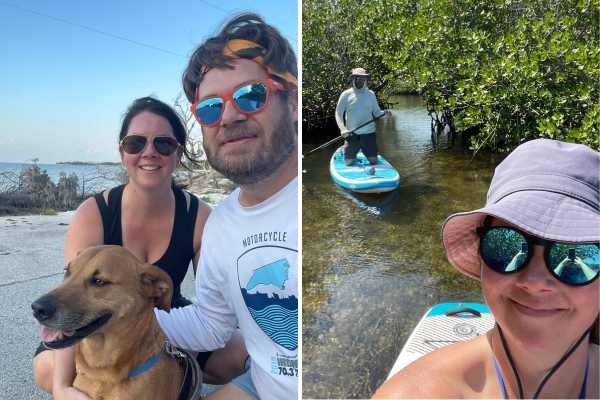
Florida Keys Travel Guide Frequently Asked Questions
Forget about those generic travel guides that promise the world but deliver little more than outdated advice. Let’s face it, if it’s written before 2020, it’s practically ancient history in the fast-paced world of travel. But fear not, because I’ve got you covered with a guide that’s as fresh as the sea breeze.
Welcome to the future of travel guides. It’s time to explore the Florida Keys on your terms.
It is only available as an ebook and Google map. You’ll be able to save this guide to your phone, Kindle, iPad, or computer so can easily access it on your travels!
Although we’ve compiled a wealth of valuable insights about the Florida Keys, our collection is far from exhaustive when it comes to accommodations, dining options, or tour suggestions. We understand that travelers seek comprehensive guidance, including the ideal time to visit and packing tips for travel to the Florida Keys—all the essentials you’d typically find in a trusty guidebook. That’s why we’re committed to enhancing our resources to provide a more thorough and enriching experience for your sunkissed adventure.
Get In Touch
Have suggestions, interested in advertising, business owner looking to improve your listing? Drop Us A Line
© 2023 Florida Keys Campgrounds
Change location, find awesome listings near you.

IMAGES
VIDEO
COMMENTS
7. Feel under the rocks to make sure no embers are underneath. 8. When you think you are done, take an extra minute and add more water. 9. Finally, check the entire campsite for possible sparks or embers, because it only takes one to start a forest fire. 10. Remember…if it is too hot to touch, it is too hot to leave.
The BIG World Festival Quiz: 50 Questions & Answers; 10 Eco Camping Tips to Make Your Trip Greener; How to Go Camping With a Toddler, and Have Fun; Cooking Outdoors: 18 Tips for the Best Results; Unusual World Christmas Quiz: 50 Questions & Answers… Airport Trivia: 50 Questions & Answers (+Airport…
82. Would you rather go on a big camping trip every year or go to a tropical resort? Check out our list of would you rather questions for friends, best friends, couples, and girls. Yes or No Camping Questions. Get ready for a quick-fire session of "yes or no" camping questions- where quick thinking and gut instincts are key.
Whether you are a seasoned camper or more of a newbie, sometimes you need a gentle nudge to really get a good conversation going with your camping buddies. So stoke that fire, gather 'round, and start with these fun questions to get things going. You never know where the conversation will go!
All of Ashley Mann's tips on questions to ask before camping come from personal experience. For starters, she recommends asking who is responsible for chores. ... Use our summer camping tips for new campers to plan your trip and make your first time camping as easy as can be. Camping Gear That Lasts a Lifetime. May 7, 2024.
But there are many other considerations, as well. Start with these questions to plan your next camping trip: 1. Planning the Time to Camp. Image from The Dyrt Camper Carly E. Since you'll be sleeping outside, the season and the weather will have a big impact on your camping trip.
A fun camping question is an exciting question that can ignite interesting conversations and build a sense of community among fellow campers. They can be spooky, light-hearted, deep, thought-provoking or even funny. Regardless of the type, the goal is to keep the conversation ongoing and create a memorable camping experience.
My first long camping trip was a two-week canoe trip in 2010, and since then I've spent hundreds of nights in the wilderness. And through guiding, I've spent a lot of time teaching kids and adults how to camp, so I'm acutely aware of the questions and challenges that come with camping for the first time.
Here are 10 questions you might have on your first camping trip—and how to find a solution. 10 Things To Know Before Your First Time Camping. 1. How do I pitch a tent? I knew my first time pitching a tent would be no walk in the park. If I struggle to put together IKEA furniture, how the heck am I supposed to pitch a tent?
Sharing camping stories. ... 118 fun & deep road trip questions for family, friends, couples; 47 dreams conversation starters for adults and kids; 25 useful phrases to keep a conversation going (and avoid awkward silence) Categories Conversation Starters Tags conversation starters, location.
Answer: A Walk in the Woods. Q: This thriller follows a group of friends whose canoeing trip in the Georgia wilderness takes a dangerous turn. Answer: Deliverance. Q: John Candy and Dan Aykroyd star in this comedy about a family's misadventures during a vacation in the great outdoors. Answer: The Great Outdoors.
20 Essential Camping Questions. Nov 10, 2022 by Mark Wilcox. If you click and purchase with one of our links, we earn a commission. Thanks. Can You Use A Camping Tent At The Beach. Yes. When planning a camping trip, it's important to research the rules and regulations of the area where you'll be staying.
A Guide to on a Camping Trip: 23 Questions to Ask Yourself Q1: What do you need to know for camping? A1: Camping requires some fundamental knowledge. Understanding the basics ensures a safer and more enjoyable trip. To begin with, it's essential to know the types of camping, such as car camping, backpacking, or RV camping, and decide which ...
Camping is a classic way to commune with nature and spend time with family and friends. It's good for the body, mind, and spirit to mix up our routines and get outside for some fun and relaxation. But we know how daunting packing for multi-day camping trips can be. That's why we put together this checklist to help make packing easy and stress-free.
1. Review prior questions. A great starting point in revealing what sort of commonly asked camper questions you should pop into your digital guidebook is reviewing prior guest questions! Having a glance at emails and OTA inbox correspondence with prior guests, can really help you get a sense of the sort of FAQs you need to be including.
The camping conversation questions are -. 1 - What are some good places to go camping near your home? 2 - What is the most popular camping destination in your country? 3 - What things do you need to take when you go camping? 4 - Do you need a permit to go camping in your country? 5 - Do you worry about any animals when you go ...
Or they put the toilet paper on the wrong way. The pettier the better. 17. Describe your personal hell. I am wading through a never-ending crowd of people constantly poking me in the side. Feel free to get oddly specific with your answers to these campfire questions. 18.
Icebreaker Questions - If you're on a camping trip with people you don't know too well, these talking points will help you to get to know each other better. Disclosure: Thank you for supporting Questions About Everything. Some of the links in this article may be affiliate links, meaning I may earn a commission if you make a purchase ...
Which U.S. state is home to the "International Dark Sky Park," where you can camp and stargaze without light pollution? Show answer. 51. What is the most famous long-distance hiking trail in the United States where you can camp along the way? Show answer. 52. Which country is home to the "Grand Tour," a 1,200-mile (1,931-kilometer) long ...
Camping means different things to different people. Some travelers relish the idea of roughing it on a backcountry trip through a national park with only their hiking boots and camping essentials, while others load up for car camping with every possible creature comfort (think air mattresses, chargers, camp stoves, and more).
From setting yourself a budget to packing all of the essentials, here are 15 questions to ask yourself when preparing for your next camping trip. 1. Do You Need to Do Any Research First? Although camping is a fairly simple and stripped-back way of travelling, being prepared will ensure you're not experiencing one emergency after the other.
Here is our list of campfire questions. Campfire questions are questions you can ask while enjoying a camping trip or bonfire. For example, "What would be your perfect day spent entirely outdoors?". The purpose of these questions is to start interesting conversations with colleagues. These activities are similar to virtual campfire ideas ...
With the right gear people can camp in any season, but moderate temperatures are best for beginners. Timing will depend on your location. Generally speaking, spring and fall are the best times to camp. Each season has its benefits and drawbacks. "Spring is a great time to head out with fewer insects," Watta says.
A shakedown trip is a dry run of your camping trip, with all your equipment but close to home. This way, you can test out everything, see if you're missing any items and—most important—make ...
K5 Learning offers free worksheets, flashcards and inexpensive workbooks for kids in kindergarten to grade 5. Become a member to access additional content and skip ads. "The Camping Trip" - a short story for kids. Fiction, 195 words. The story is followed by a reading comprehension worksheet.
Discover Camping Camping Outdoor recreation Outdoor adventure Camping essentials Hiking 9 questions. Camping and Glamping Quiz EffectualZinnia. 30 questions. Camping Safety Tips for the Great Outdoors RestfulZombie. 9 questions. ... Birthday Wishes and Camping Trip ModestDalmatianJasper. 36 questions. Arctic Camping Quiz FondJasper. 5 questions.
Sleeping Bag: The North Face Wawona Bed 20 Sleeping Bag, $78. Sleeping Pad: NEMO Quasar 3D Insulated Sleeping Pad, $119.99. Camping Pillow: NEMO Fillo Camping Pillow, $33.74. Lantern: Goal Zero ...
Top tips for first-time campers in WA. May 15, 2024 at 10:00 am Updated May 15, 2024 at 10:00 am. By. Christina Hickman. Special to The Seattle Times. This story is part of this week's Hiking ...
For a 5-day car camping trip, it's important to have healthy snack options on hand. Some great options include fresh fruit, veggies and hummus, nut butter and crackers, and protein bars.
How This Guide Will Help You. Skip the tourist traps and dive straight into the heart of the Keys with curated recommendations from a seasoned explorer. From must-visit attractions to off-the-beaten-path gems, I'll show you the real essence of the islands. Get the inside scoop on the best places to eat, drink, and unwind like a local.